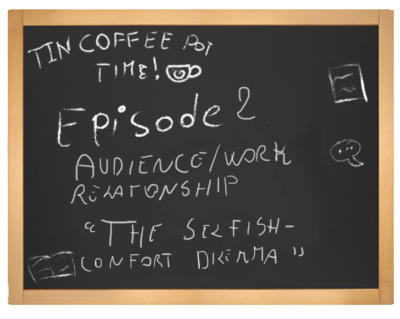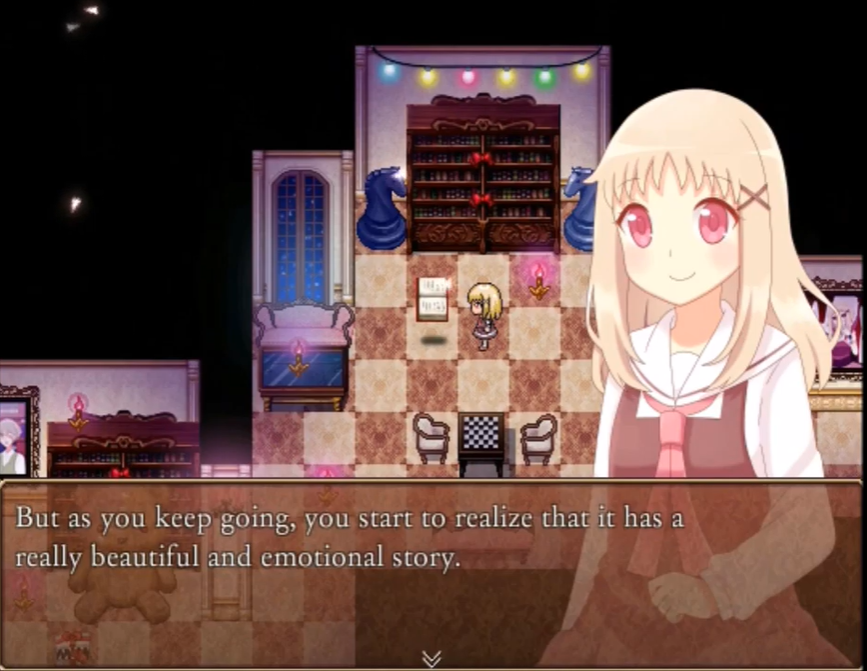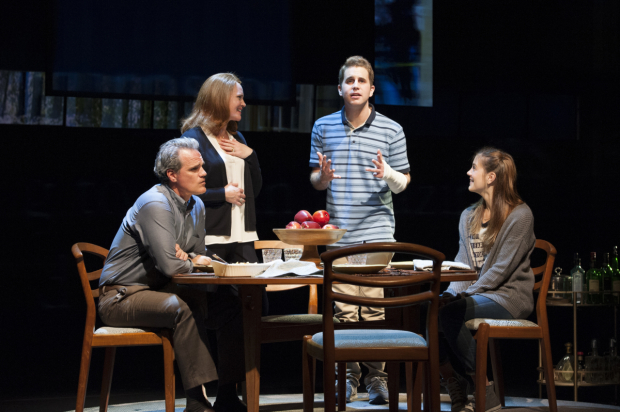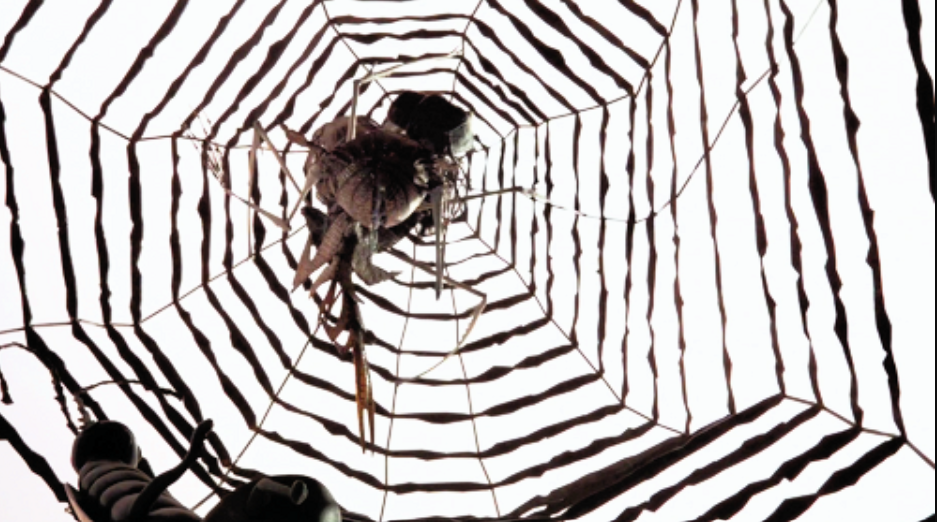
…
Welcome back to the Tin Coffee Pot Time column, in short a normal “chat” column, or simply topics that are a bit tight in the normal columns that we deal with here in the Archives.
After my sister wrote a nice article on alternative ways of storytelling , making sound and accurate information as it should …
Now I’m going to screw everything up.
As you guessed from the title, “Selfish Confort Dilemma”, this is going to be an evil article. And a lot too. Especially towards you, our readers.
Because we will talk directly about all of us , about how we tend to approach not only the video game, but the entire fictional work in general! I will finally involve you in my speeches and we will no longer be the ones who “talk about games that are now dead”!
Too bad, since you are with me today, this will be done in the ugliest, most insensitive, cynical and at the same time angry way of all these years this site has formed.
And this intent is not at all noble, how will we pursue it?
To keep in line with the genre of games we talk about in the Archives, today we will analyze three titles; including two very… Or even too much loved ones. But we will analyze them on a moral level.
Ah, moral. The one we all like to talk about, including me, because it only relies on vague ideals. So we can say what we want, because everyone has their own ideas that should not be questioned because there is freedom of expression and … Do I really have to make all these premises?
But it is the one that we all feel compelled to judge, even if we, deep down, are all rotten. It is human.
And by “all of us” I mean us, public (who is also here in the cafe today!) Who spread the word about these games, making the right messages normal, making legitimate or wrong that they perpetuate… Because it’s fine for us . Because that story “gave us emotions”, even if in most cases behind that phrase it is not clear whether ours is true devotion to the work itself or something more rotten underneath.
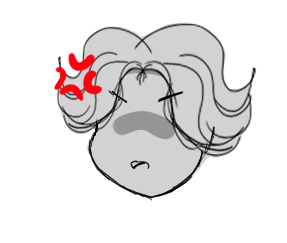 “Ehm! I respectfully disagree! ”
“Ehm! I respectfully disagree! ”
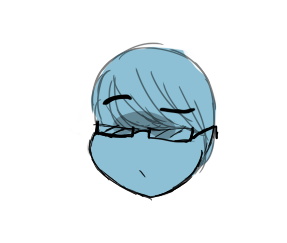 “What would be rotten in the phrase ‘this story thrilled me?'”
“What would be rotten in the phrase ‘this story thrilled me?'”
 “… Vanity, wanting to be understood in any case … Personal comfort.”
“… Vanity, wanting to be understood in any case … Personal comfort.”
But I’m not a judge. I myself, at times, do not understand what leads me to attach myself to a work when I reflect on myself.
So, since we can’t do an examination of conscience on our own…
Let’s see in which types of works we recognize ourselves.
You know, the works that we consider “well made”, projects “to be loved”, stories that “touch the soul’s strings” and many other clichés that bring views to our “video essays”, bring likes to our comments or they just fool people into thinking that we have a deep mindset in the least, even if we are only good at philosophizing…
 “She started with digs…”
“She started with digs…”
 “…”
“…”
 “… Every time I wonder if my sister is a masochist …”
“… Every time I wonder if my sister is a masochist …”
 “Your support always makes me happy, girls.”
“Your support always makes me happy, girls.”
 “So guys, let’s start with the analysis! I will take all your questions and answer peacefully respecting each of your fantastic opinions! ”
“So guys, let’s start with the analysis! I will take all your questions and answer peacefully respecting each of your fantastic opinions! ”
…

 “…She lies.”
“…She lies.”
…..
 “I would like to speak for a moment to be able to make a premise.”
“I would like to speak for a moment to be able to make a premise.”
Consider it a small disclaimer, but I really want to clarify that in this type of articles we don’t delve into the titles in their context as we normally do in Back To The Future, but we try to link various titles together around a core theme . This can lead the risk to the perception of a more “conspiracy and / or alarmist” type of article , and it is for this reason that I emphasize here that we are facing a series of personal reflections observing in general the contents that the 2D independent videogame world offers (referring to the titles produced on Rpg Maker specifically) in the narrative field, obviously as is always done in these cases with a good dose of more colorful language for love of entertainment.
 ” Okay Ele, after I annoyed you we can proceed. “
” Okay Ele, after I annoyed you we can proceed. “

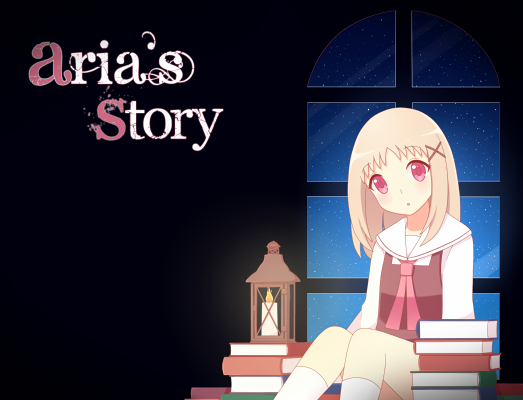

Here, let’s see the last image! A recent Horror RPG (if Omori can be defined as such …)! A rarity!
… And above all, my source of nightmares for a few months.
So, yes, we will talk about much-loved and well-known games …
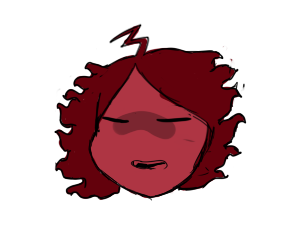 “What a drag! Cloé’s Requiem again?! Haven’t you already made 3 articles about that sh***y game? ”
“What a drag! Cloé’s Requiem again?! Haven’t you already made 3 articles about that sh***y game? ”
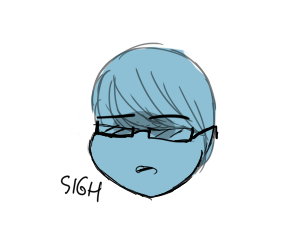 “Well, I played it, didn’t I understand what they said in those articles? It’s small stuff, nothing special… ”
“Well, I played it, didn’t I understand what they said in those articles? It’s small stuff, nothing special… ”
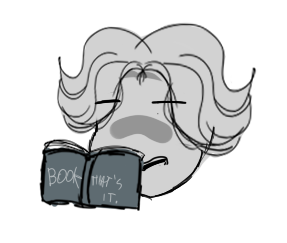 “Can we move on to the real interesting debates, please?”
“Can we move on to the real interesting debates, please?”
 Okay. We will start from a more general discourse, then.
Okay. We will start from a more general discourse, then.
Part 1 – The “poor victims”
For these first two parts, we will talk about more general themes, and then make the detailed analyzes of the single games clearer.
In these three games, “poor victims” are presented each time , people we should in theory become fond of, because of their traumas, bad experiences or emotions that, in theory, should make them more human .
But let’s see, in reality, what we are led to have to defend.
Cloé’s Requiem: Con Amore – “Pierre is a bit innocent”
Before moving on to Con Amore, let’s give a quick overview on the character of Pierre , using our appendix article on the characters of Cloé’s Requiem:
He is presented to us simply as “the twin of the protagonist who is less good at playing”, also blond and with blue eyes.
What immediately catches his eye, always speaking superficially, is the repression of his anger towards his brother.
(…)
In the eyes of some players, for what he has done and said, Pierre is nothing more than a repressed worm, ready to threaten his brother to kill himself.

Yes, guys, he really said it.
But how was this character, at this point detestable at most, treated in the “extra version” of the game, Con Amore?
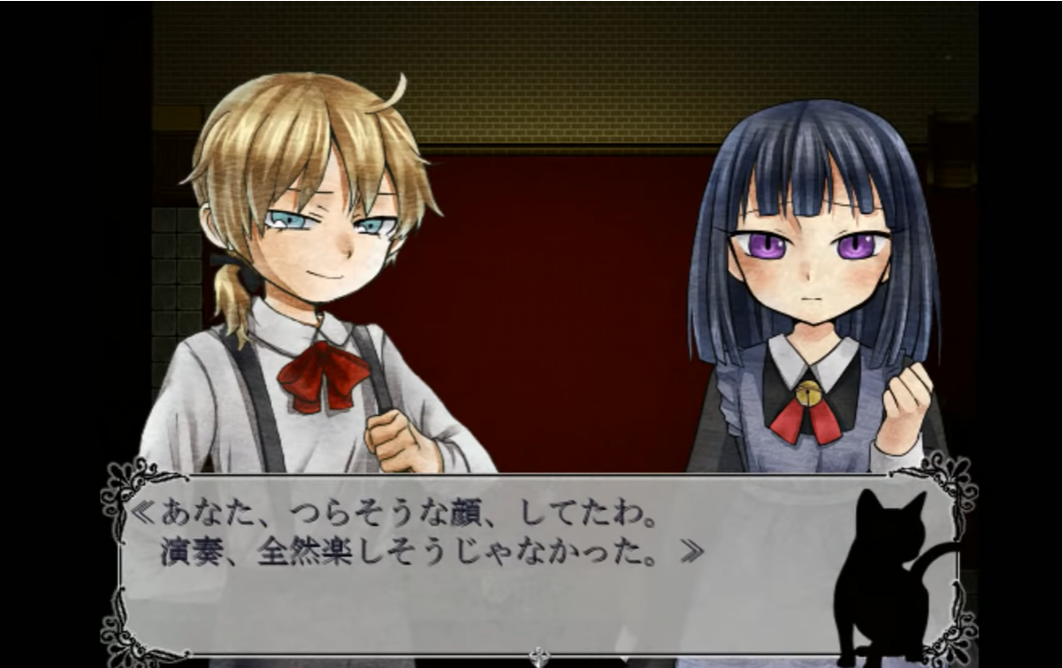
“You had an expression of pain.
The performance didn’t seem funny at all. “
Ok, before I get down to it, if a catgirl gave you a heart attack in this game, she should theoretically be “Noir”, which in the original Cloé’s Requiem is simply a cat and was just a directly contrasting representation. with another cat, Blanc (who is also humanized in Con Amore).

(This is a review of Cloé’s Requiem Con Amore by a Japanese blog )
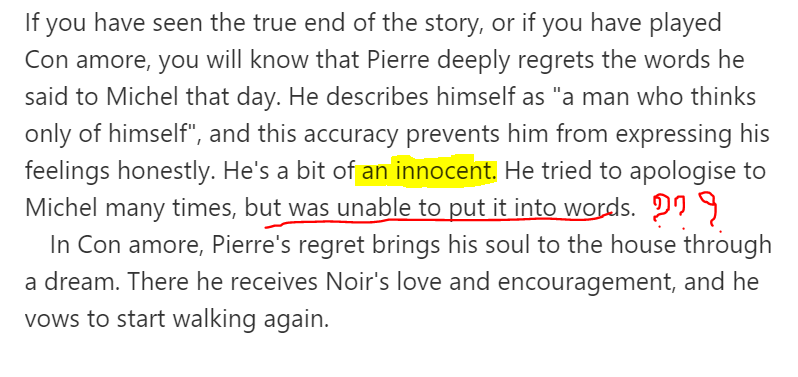
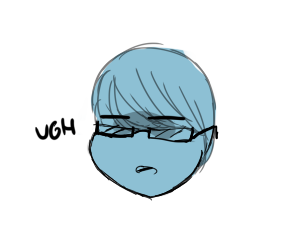 “I have inquired for you and I do not understand where you would like to go. They have eliminated those scenes, you cannot know if he repeated those same words. In original game you are so fond of that he would have apologized to his brother; so if by chance you would like to criticize this version of the game for having focused on a more human side of the character who among other things accuses himself and develops a path of personal growth I do not think it is a fair and deserved criticism. It is not healthy to always find the rotten in everything. ”
“I have inquired for you and I do not understand where you would like to go. They have eliminated those scenes, you cannot know if he repeated those same words. In original game you are so fond of that he would have apologized to his brother; so if by chance you would like to criticize this version of the game for having focused on a more human side of the character who among other things accuses himself and develops a path of personal growth I do not think it is a fair and deserved criticism. It is not healthy to always find the rotten in everything. ”
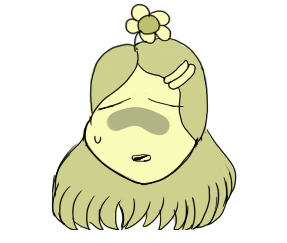 “Hey, you’re right! It may happen that certain relationships between people become more complicated, don’t you find it very sweet that out of guilt he is no longer able to express his displeasure?”
“Hey, you’re right! It may happen that certain relationships between people become more complicated, don’t you find it very sweet that out of guilt he is no longer able to express his displeasure?”
 …
…
 … Guys, really?
… Guys, really?
He death threatened his brother…! And since his is a real anger and hatred that he has been repressing for years, also given the cold attitude he has with his brother, along with some digs that can only make you think “what an asshole!”


This is not a simple “misuse of words.” That happens with people you really love. Even before telling him directly to die, he said something cooked and raw, always going to the concept that according to him Michel should not have been born. It’s not something you tell your brother, heck.
Let’s face it clearly: people like this usually never have a problem expressing what they think. A bit of rhetoric as he always did, and even in his ambiguity he would be able to send very clear signals of his emotional state.
And here this subspecies of hole-patching game puts down a quarrel where repressed grudges have been brought out for years …

Like a fight a little bit more heated, but given only by anger and frustration?

“You had an expression of pain.
The performance didn’t seem funny at all. “
This screenshot, which we showed you earlier, is before the quarrel we mention. It more or less refers to the general condition experienced in the family, because like all the other bad things, as our friend had already anticipated, the fight has been totally censored in this version.

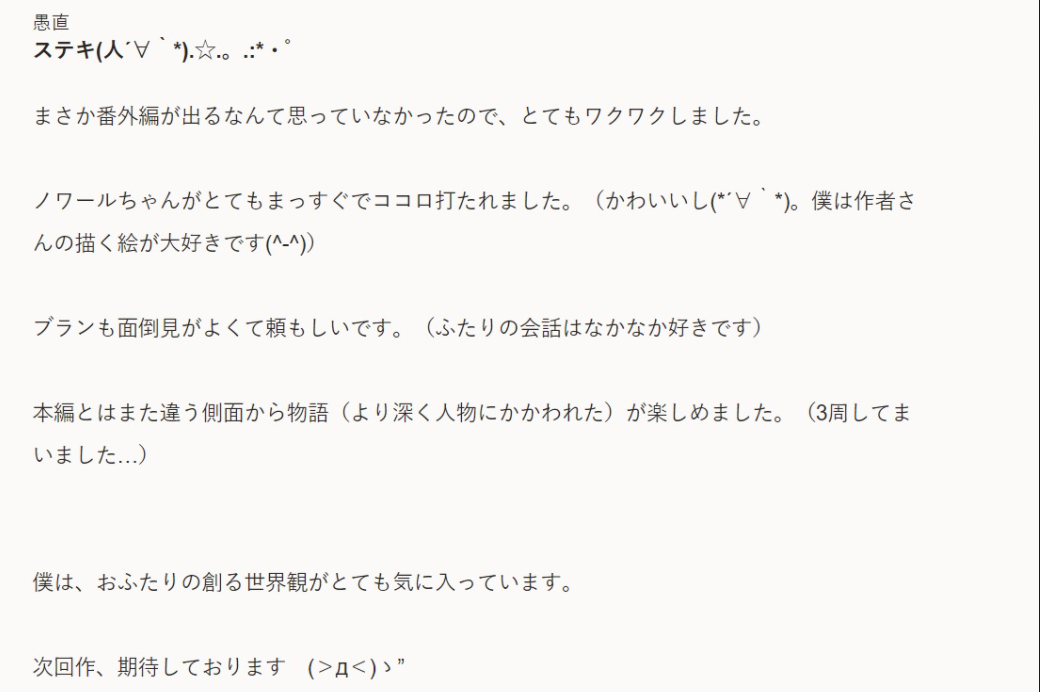
(Review from the Freem website!)
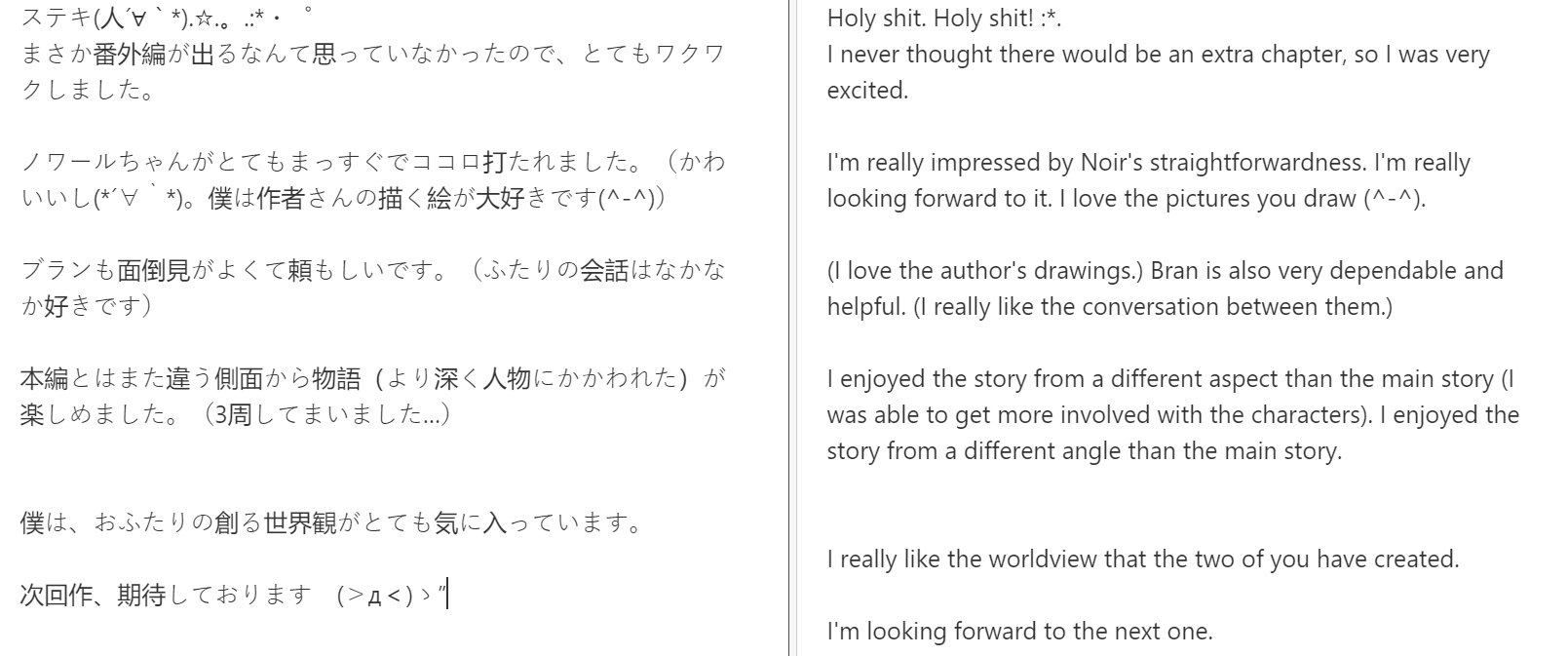





“You had an expression of pain. (…)”
 ” You think that the frustration, ‘pain’ and how much it may have felt is a valid justification for his ‘outburst’ and to define him as a victim?”
” You think that the frustration, ‘pain’ and how much it may have felt is a valid justification for his ‘outburst’ and to define him as a victim?”

Do you think that “frustration” could be a good excuse for making such a character go from wrong to right by labeling him as a victim?
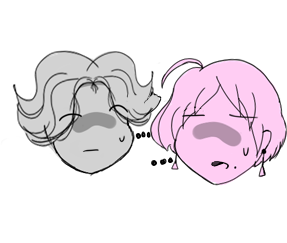 “… ”
“… ”
You can see then, that to justify this character along with his immorality (such as hatred towards his brother, who is theoretically the wrong person to blame), the strong concepts said in the scene of the fight have been minimized. in Cloé’s Requiem , when those were the very elements that made that scene strong and meaningful .

Pierre’s characterization also suffered from this minimization of the obvious problems that Pierre had.
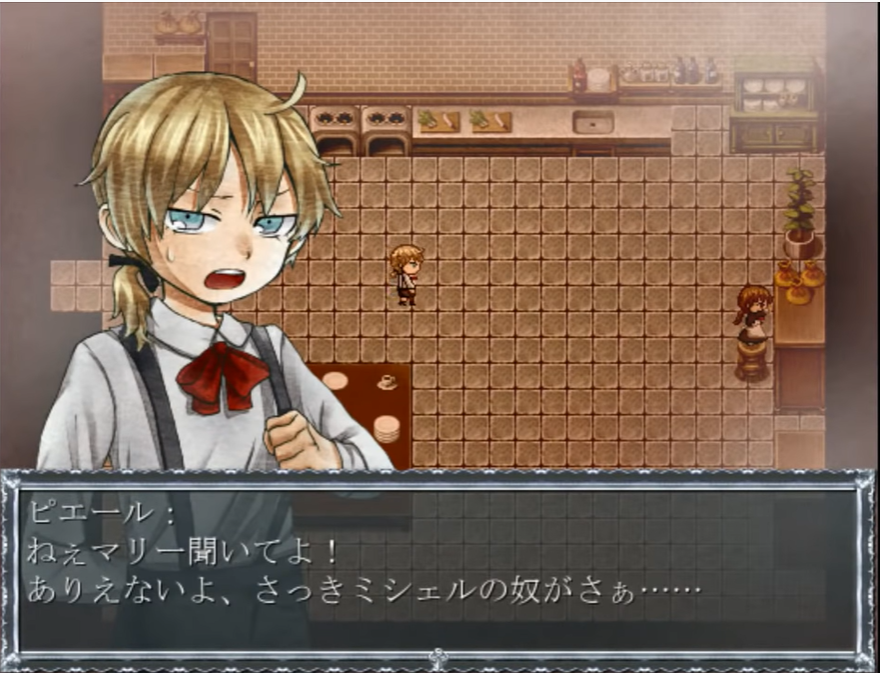
(The context of the next screenshot is that of the image above, although what Pierre says above refers to other events)

(This transcript of a dialogue that happens in the part game is taken directly from the translation of Cloé’s Requiem Con Amore, because in the video from which we took the screenshots this interaction seems to have been skipped … And we cannot take screenshots from us while downloading the game, not knowing Japanese)
Now we explain what they did to this character better: by removing the main characteristic of his personality, namely the attitude devious and false , they shaped him to try in every way to make us perceive him. like a childish kid …
…And the meaning of the sentence you read in the review “he perceives himself as a selfish person” serves to highlight this situation.
Let’s say he has simply become a “poor troubled kid who has yet to understand how the world works and how to openly open up to others”.
So guess what?

“You had an expression of pain. (…)”
BECOME A VICTIM
But why do we say this? Because the guilt becomes only of the adults and the insensitive world in which he grew up, for example.
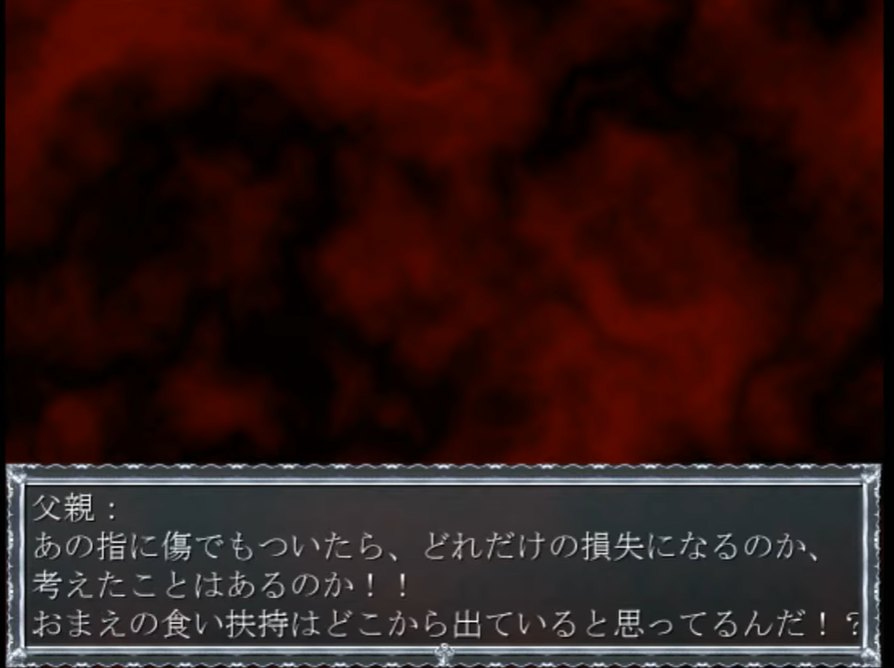
Mr. d’Alembert reproaches Charlotte who doesn’t feel like taking the cat to the mountains, this scene was previously never shown directly and more weight was given to the little girl’s reaction the next day. In this sense the father of the two boys becomes a much more present figure, ready to take on the role of the evil and heartless adult in the most literal sense of the term.
In short, is totally excluded the possibility that he may have now assimilated the typical attitudes of the sick society they wanted to represent and have distanced him from this reality, as a consequence Pierre he took on another personality, as well as another role within the story that could remove him from any uncomfortable situation that he himself had generated in the original situation .
The cause of this: 
It becomes this: 
That is “ a single moment of weakness” given by momentary frustration, in reality is a good person , is a person to be pitied by this or to be sorry for.
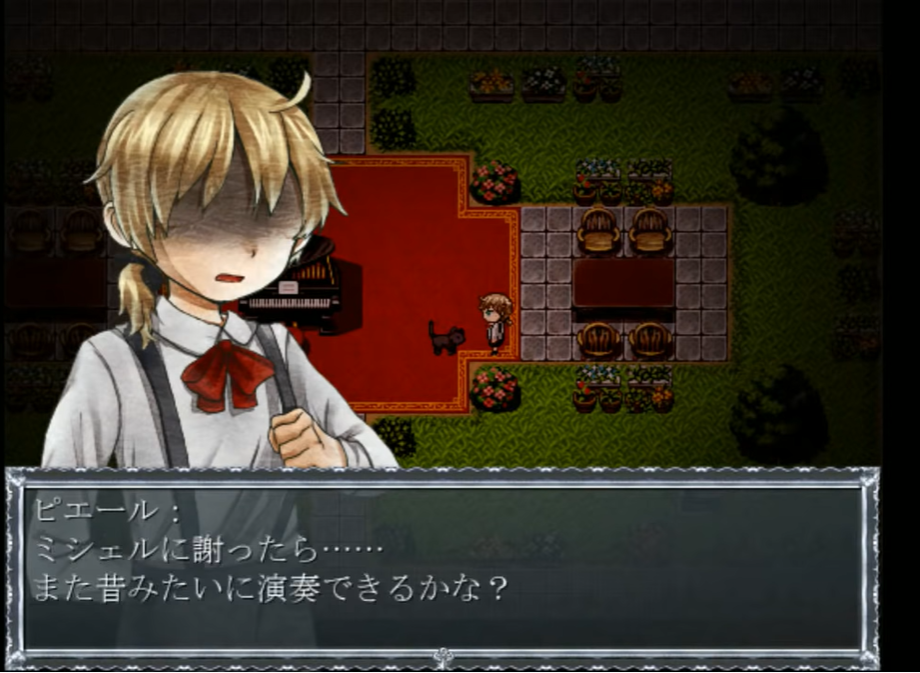
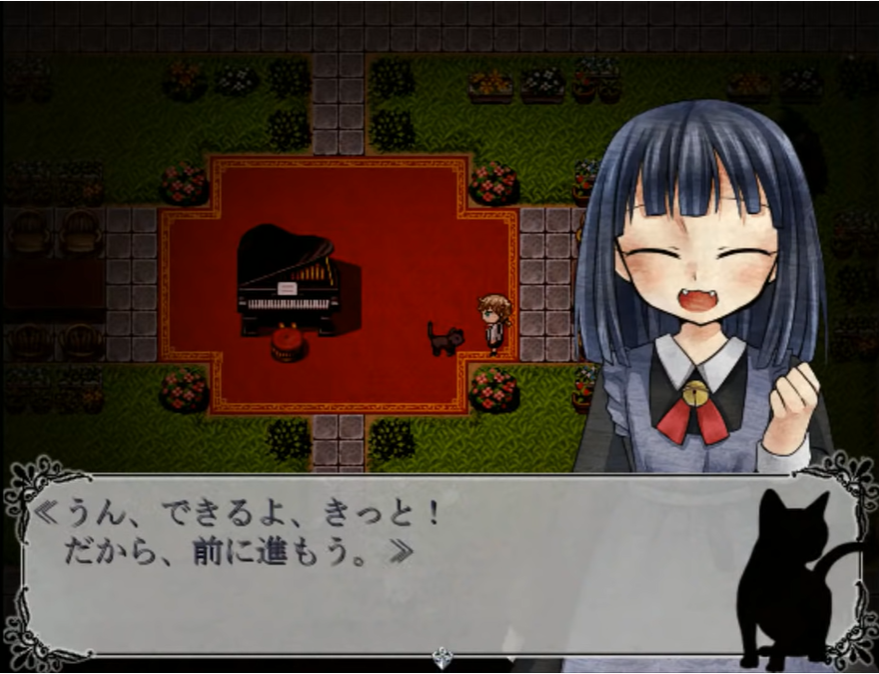
“If I apologize to Michel, could it sound like it used to be?”
“Yes, sure, I’m sure!”
We explain one thing to you.
This change of course with all its relative repentance, the beating of the “infantile and selfish but good-hearted boy who cannot express himself” makes absolutely no sense when you think of the restrictive family and social context in which he was evidently found in the original game: let’s say that the guilt of “selfishness” was the last thing that was thought of in the most concrete terms. Those who could afford it led the reins and deserved his accolades; those who could not dictate the law were limited to being an instrument in the hands of the strongest. Thus, being “a lesser tool” Pierre was working towards a higher status. He practiced for his father’s recognition, simply applied the morality of hard work and “meritocracy” , in his perception of things the ideas he manifested during the game (including vent) they were all legitimate ; is not that he “suffered and therefore committed the bullshit”. Do you know when he started wanting to apologize? When the father died, that is when the object of the competition with his brother fell. Because, for the rest, he had ONE YEAR to apologize – and they live in the same house !! – and he absolutely didn’t give a shit.

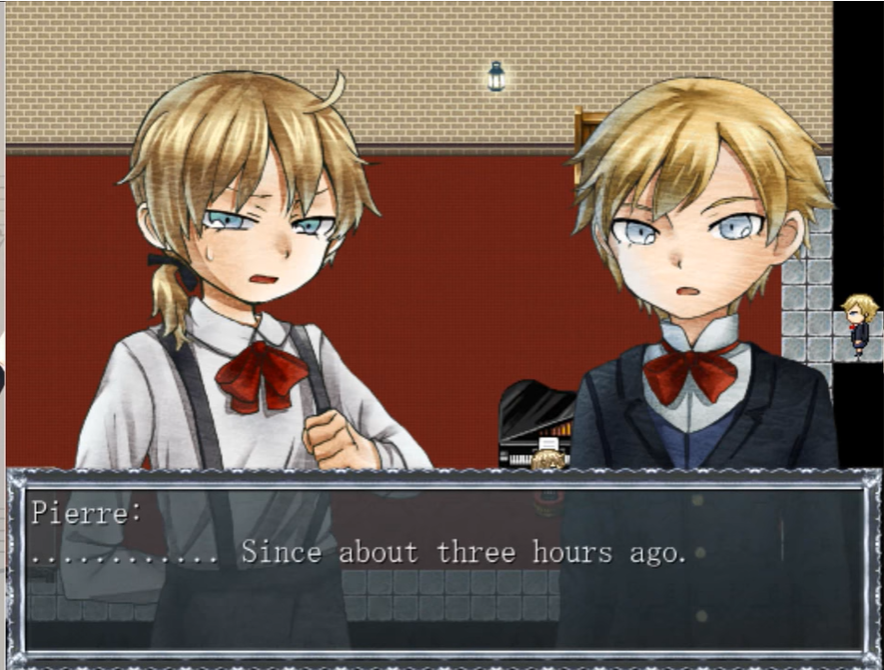
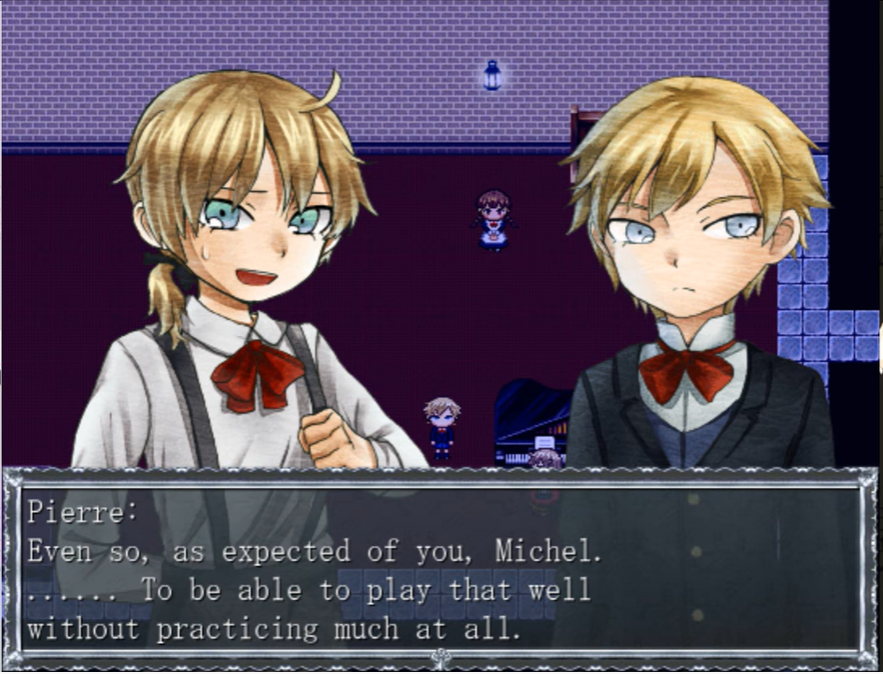
(As always, we would like to underline the disturbing super sudden expressive change)
… AND THEN, from all the repressing and stacking emotions, the final rant is here.
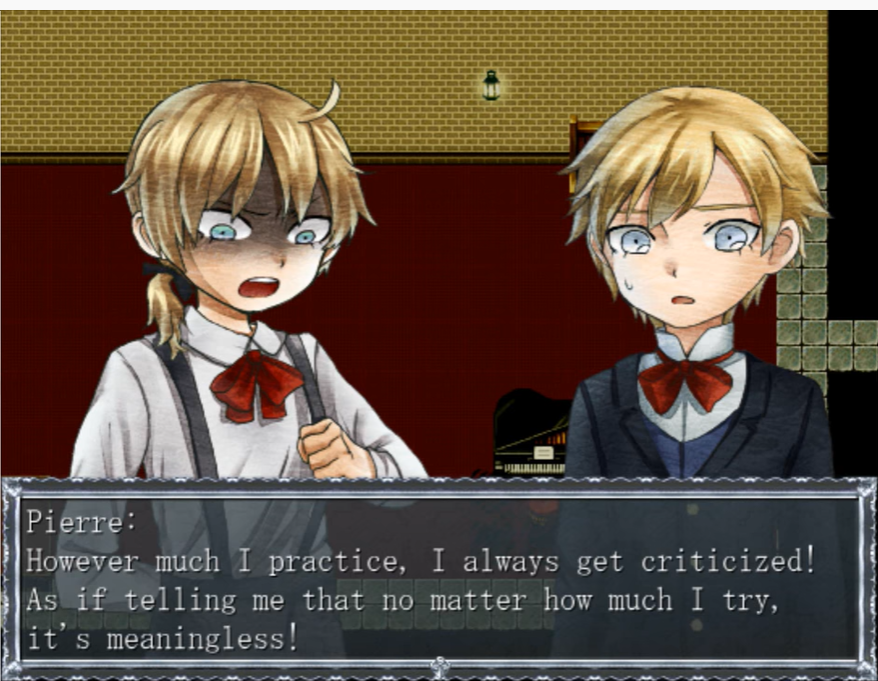
I would like to point out that these words cannot be uttered by a person who doesn’t really cultivate these negative feelings . The focus of the matter is not that he is a childish person per se and that he “always wants everything for himself”, that was never the real problem. It can certainly be a way of seeing the character, a change of perspective that the authors have had towards him, but the point is that in reality, Pierre’s reasoning is correct, they make sense.
The change seems really imperceptible at first friction, but the reason we are talking about it here and we care so much is that everything has been done to de-empower the character of his faults making him essentially “harmless. “and absolutely redeemable at 360 degrees.

Here, THIS is what you might describe the spoiled and harmless child , just know that it has nothing to do with the original !

… You can see for yourself that the problems he complains about are quite different.
We want to remind you how in the previous intentions we wanted to insist more on infantility, instead, of Michel: he is the character who ultimately had to face this issue, and the game does not failed to show you the negative side of the argument!
The result of all these changes in Con Amore, the proof that the approach in the way of seeing his attitudes has totally changed can be found in the doing this has minimized any possibility of conflict with other characters.
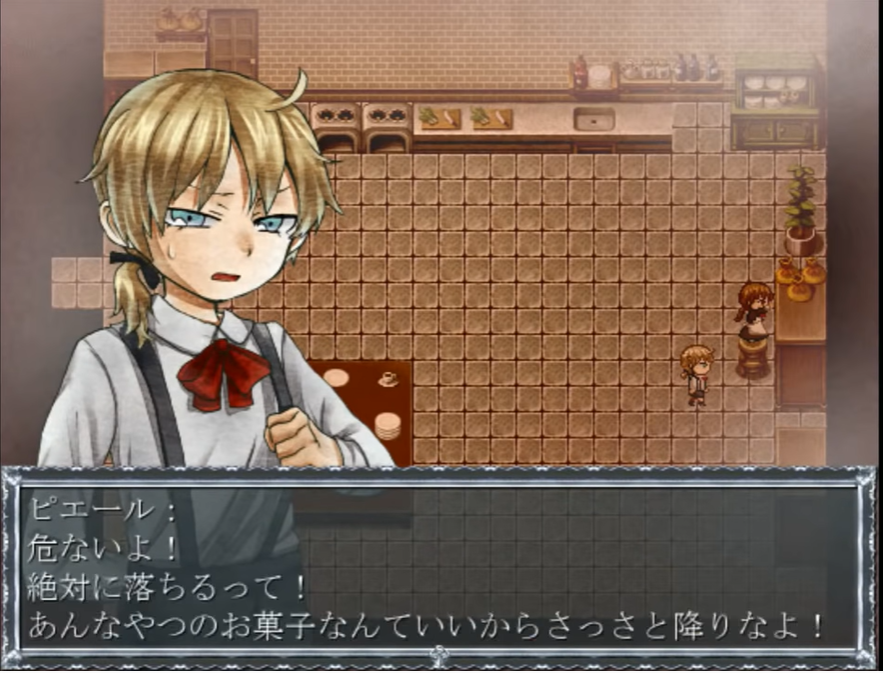
Let’s see for example a difference: observe how he treats Charlotte as a subject here, where as the nice guy he is, scolds her because he cares: “You will fall! Be careful!” and so on …
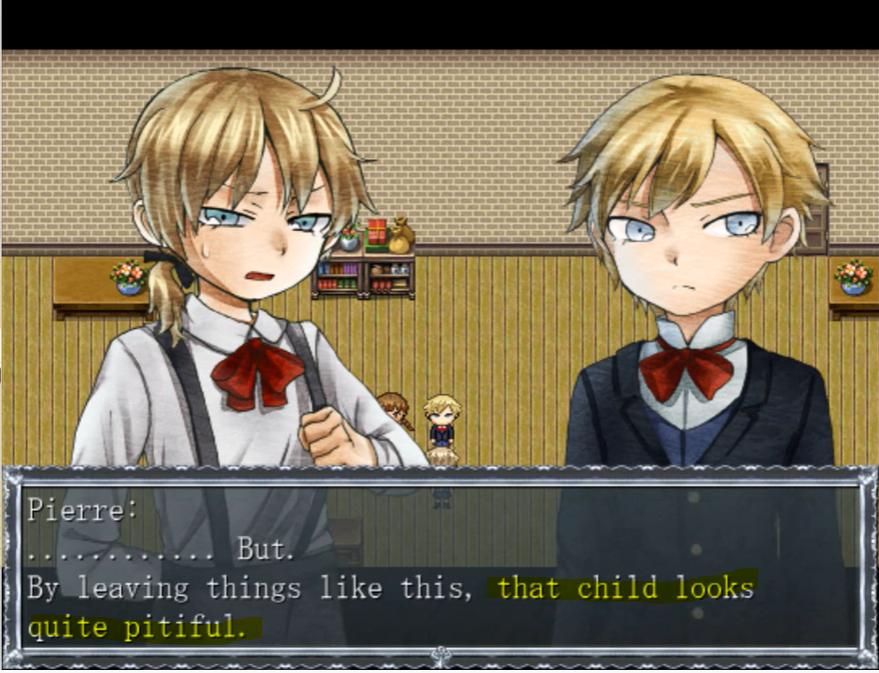
… And how you treat it here. This expression speaks for itself.
In short, Charlotte was totally right after all!
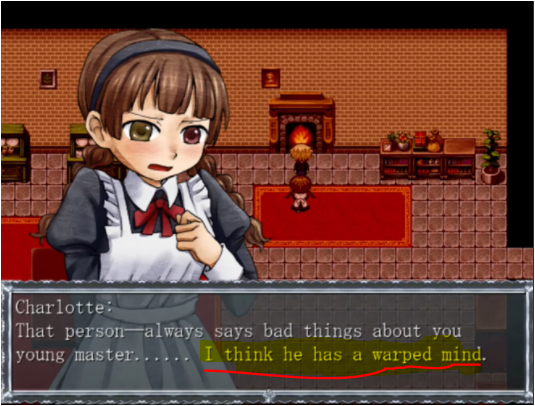
But in the next case we will deal with a much worse thing, that is the total pathetism, given by the justification of an estabilished bully.
Omori – Aubrey: “What you’re dreamin’ about, Sunny? “

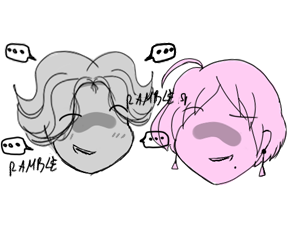
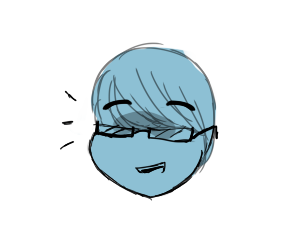
 “… God I hate this girl.”
“… God I hate this girl.”
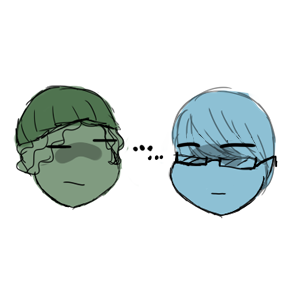 ” … ”
” … ”
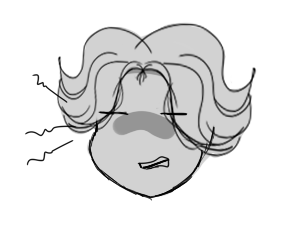 “So, first of all I respect your opinion but…”
“So, first of all I respect your opinion but…”
 “But to me you remain a disacculturated bitch and know-it-all because you have not understood the beauty of this character because she is an absolute snack”, I would like to interrupt you and predict what you will tell me! ”
“But to me you remain a disacculturated bitch and know-it-all because you have not understood the beauty of this character because she is an absolute snack”, I would like to interrupt you and predict what you will tell me! ”
 “Ele…”
“Ele…”
 “‘Kay, that was too much. An” analysis “on Aubrey, however, would have distracted us from the conversation, come on!”
“‘Kay, that was too much. An” analysis “on Aubrey, however, would have distracted us from the conversation, come on!”
So, except for this small incident with the community, which has been celebrating this game for a few months …
Aubrey. I confess that she is the character that made me roll my eyes multiple times in Omori, as she is simply a more serious case of a problem that all the characters in the game have: the accumulation of stereotypes on stereotypes.
But most of all, the way she was treated lowered the quality of the game even more.
I see that you are already preparing the pitchforks or a nice little speech for me, which would go from saying how profound Omori really is, up to my total lack of manners… For some reason …
But let’s introduce her for a moment, this “Aubrey” with an unknown surname.

Aubrey, in the real world presented by the game; because Omori is divided into the world of dreams, where they are all children, and the real world, where the protagonists have all grown up, having been a 4-year timeskip, is an active bully who gets commands a gang (what a gang, they use bicycles to bully. Are they put down like petty thugs, and not even a bit of vandalism? Or something like that!) who beats up a poor guy for something that happened 4 years earlier than what we see through the eyes of the protagonist Sunny …
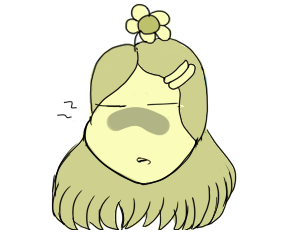 ” Ah, come on! She’s doing it because she feels bad that Mari is dead, just like her father died, can’t you see? ”
” Ah, come on! She’s doing it because she feels bad that Mari is dead, just like her father died, can’t you see? ”
 “Sure. And the water is definitely wet …”
“Sure. And the water is definitely wet …”
Let’s go in there with an in-depth look at her behavior for five minutes.
Aubrey has never and I say NEVER overcame her mourning for Mari , their friend, for 4 years (because there is a 4-year timeskip in the game), when Hero, another main character, despite being ( assumes) someone as close to her like her boyfriend went to college and passed it, in that time frame.
… And Aubrey above all still takes it out on her old friends. We can see such a nice display of maturity . She didn’t move on in her life after, let’s say it again, four years after mourning Mari-
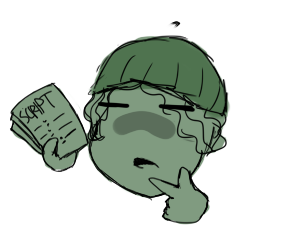 “Hey, her father died too …”
“Hey, her father died too …”
 “Ok, when? Did the two griefs happen in a short span of time, so that the despair was stronger?”
“Ok, when? Did the two griefs happen in a short span of time, so that the despair was stronger?”
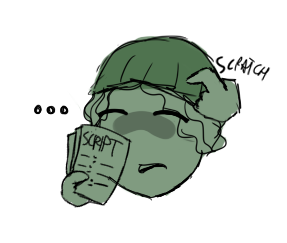 “Well, I don’t know, I guess …”
“Well, I don’t know, I guess …”
 “Yeah right, continue to suppose. Games look better to you if you assume everything.”
“Yeah right, continue to suppose. Games look better to you if you assume everything.”
 “Oh. I liked this one.”
“Oh. I liked this one.”
…In any case.
Four years since mourning for Mari, we said. And, later, she will blame her old friends for not being there for her.
Another great demonstration of maturity, because it is said in the game that everyone was grieving for their dead friend, and that they all had their problems! And after four years, where she has already found other people (“superficial friendship” or not, as perhaps she wants to be treated) she has grown up even if in a negative way?
Another thing to do, without having to get to monkey-like violence, or acting like a capricious child , would have been simply not seeing them again, not considering them, without being a drama queen in church!
Here, now that I’ve complained very well about Aubrey …
You know what’s funny?
From her childhood Aubrey never grows up during the game. We want to see how the game treats her?
Let’s take a look at Aubrey’s character in detail through the scene in which she is directly protagonist, the scene of the church.
The scene where, honestly, a feeling of absurd cringe assaulted me , due to various factors of unrealism, including people who were neither going to divide them, nor to do anything for kids who beat each other, not even the priest did nothing… And above all, the random comments of people: “Look how she is dressed …” and shit like that. Of those classic things just to say “we live in a society …” , but which actually have no context (because first of all, such phrases in that situation they are really ridiculous … And then because society, after this scene, is always and in any case quiet and happy, so it is not a theme that is dealt with in the work itself – and for the record: Earthbound had a supernatural plot that distorted the balances of the “cute little village” , so everything was functional to the conflict that would develop -) and serve only to see Aubrey as a victim, when in reality she is the one with a NAILED BAT willing to beat us in a church.
Back to Aubrey …
Let’s skip all the useless dialogues about “We WERE friends, now not anymore because now I’m depressed”… Let’s go straight to the lines before the fight.

Let’s start with this sentence from Kel. It’s very generic , seriously, but from here we can start the phenomenon where a character becomes “the author’s pet”, “the fanbase’s pet” or … In general, is justified for everything because “underneath there is a heart of gold!”.
Guys. Let’s stop.
The ending of the game, according to which Aubrey finally makes peace with everyone she is a simple sop for those who love this character.
“To behave differently, but still be a good person, actually with a heart of gold, who has people he loves, and cares about them, even if he’s a little aggressive”, talking about characters who are potentially criminal, violent, or even just bad people …
I tell you something bad, but in my opinion it is very true.
Do you know where this unrealistic concept tends to apply?
In young adult romance books. Trashy ones.

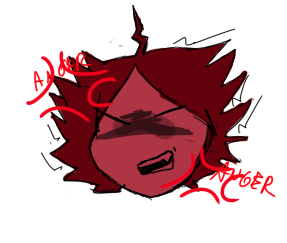 “After ?! SERIOUSLY ?!”
“After ?! SERIOUSLY ?!”
…
 “… And one is gone. Okay, maybe I’ll be in real trouble if she starts telling herfriends“ I went to a convention of someone who compared Omori to After !! ”. Novella, if someone knocks do not open! ”
“… And one is gone. Okay, maybe I’ll be in real trouble if she starts telling herfriends“ I went to a convention of someone who compared Omori to After !! ”. Novella, if someone knocks do not open! ”
 … Ele, I’m honestly worried about your actions.
… Ele, I’m honestly worried about your actions.
You know this book? Hated by many booktubers, a representation of a toxic relationship, because Hardin is generally a boy with multiple mental problems, never taken as such.
… And in general, on the part of the saga (the first two books that are the basis on which the others rest, practically) he is almost never condemned or no one has the correct reactions to his attitudes, due to the fact that it is love interest of the protagonist and love interest cannot be represented for what it is, for a sick person or at least not suitable to attend.
We should root for Hardin every time, even though thinking logically for some situations in the book would be right for other characters as well. No, Hardin will always have the best because he has to have the best in life.
Because the author likes him, because the readers like him. In theory, such a person shouldn’t even interest Tessa, if the always unrealistic trope of “good girl-bad boy” didn’t exist and vice versa.
A depiction of the bad boy as given by Hardin convinces readers that even a dangerous man, such as Hardin can, with the right person change, can be “fixed”, because he has a heart under the stone.
Ah, the more pretentious call this “character development” of these types of characters.
Because these thoughts “comfort” the readers, when the reality is very different.
Don’t look at me like that! You know it’s true, you know you have the same dynamics as romance book readers! I can summarize you your character evaluation path with a very simple list!
-
Wow, what a cool person.


-
Damn they’re tough, they beat people up. Oh, it’s not morally correct, but they remain cool… Although I don’t know, is their beating *** …?




(Sorry, I couldn’t find a better frame for the scene where he hits a guy at a party. In the first film he hits a lot less than in the book and for the second film there is no convenient compilation of ” Hardin Scott Scenes ”and I don’t really have the heart to see the second film in full)
-
Aw, it happened ( insert trauma, death of parent, or … Anything bad at this point, is good) then. Ahh I get it, they try to defend themselves from what they felt. How sad, I understand why they’re doing this…



(This scene shows Hardin’s backstory, where his mother was raped and he had to see it all)
-
Actually in this round we are the bad guys who are limiting *** to express themselves. Please defend this person!

(The ones above are comments below a gameplay where the church scene in Omori is seen)



(These last 3 are comments under a nightmare scene in the second movie on After, where Hardin’s backstory is known)
Just like Tessa, also in our case for certain types of characters it is not the reason that speaks. It is the desire for a comfort character at all costs and our Red Cross syndrome to speak.
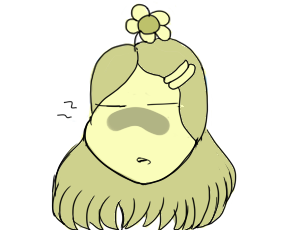 “Hey! Red Cross Syndrome is different from simple empathy!”
“Hey! Red Cross Syndrome is different from simple empathy!”
 “If for Aubrey no one had used the same reasoning as” we can fix her! ” used with Hardin, Sunny and Kel would have helped Basil and left Aubrey to herself, because she is a girl who, at least in the way she wants to pass, is dangerous. ”
“If for Aubrey no one had used the same reasoning as” we can fix her! ” used with Hardin, Sunny and Kel would have helped Basil and left Aubrey to herself, because she is a girl who, at least in the way she wants to pass, is dangerous. ”
I basically have a comment on Hardin that speaks for me.

Do not take into account the lack of the double. I also ask you this question.
If, for example, Aubrey was actually aggressive towards Basil only as a typical bully: because she is having fun (or for real discrimination, then we can address this later) …
We would like her as a person?
Or, given that we really like the concept of “characters as people”: if we didn’t have the game that clearly tells us that Aubrey is a person to help … Would we like her? Would we think of her actions as “immoral, but done for GOOD reasons”?
I don’t want answers here from the public. I leave this question open.
Also because I want to move on to another case, in which the work grimly justifies not whims such as words, or even physical violence given by immaturity, which is not given its own condemnation in favor of a real character development …
In the next and last case, the one for which Victor Frankenstein was badly punished in Mary Shelley’s novel is justified.
Aria’s Story – “Clyde’s Story”, or The Modern Prometheus
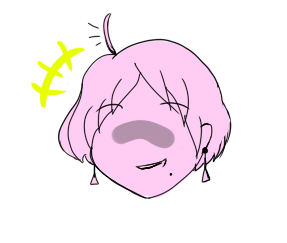 “Aria’s Story! Nice, it’s the game that got me close to Horror RPGs! ”
“Aria’s Story! Nice, it’s the game that got me close to Horror RPGs! ”
 “…”
“…”
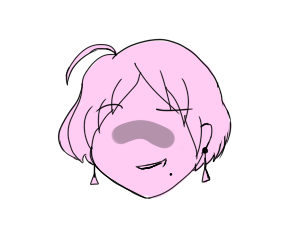 “But why do you compare those cute people, like Clyde, to a boring classic from the 18th century?”
“But why do you compare those cute people, like Clyde, to a boring classic from the 18th century?”
Because that’s exactly what we justify for all of Aria’s Story, especially the dialogue added in later versions of the game.
The case of Clyde is almost funny, as surreal as it is.
And above all it makes me laugh, so as not to cry, how the basic direction of two / three tear-jerking scenes managed to obscure this truly disturbing aspect of the game, on which, however, in the end nothing was ever deepened, nor even thought about it as a real problem, or a moral doubt.
I can’t even write any catchphrases … Because the problem lies in the whole plot!
For those unfamiliar with Aria’s Story, here is the plot in brief. I just want to inform that it is all put into the final few cutscenes, while for the whole game we have only a foreshadowing put there and in general the cosmic nothing.
Juust some small inspiration from Pocket Mirror, huh?
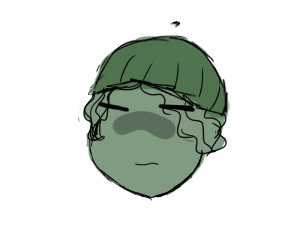 “Pocket Mirror? But Aria’s Story-”
“Pocket Mirror? But Aria’s Story-”
 “Shh… You may complain later.”
“Shh… You may complain later.”
The general plot-twist of the game is that the protagonist we have been in charge of all the time, Aria, is actually a copy of a dead girl, friend of the supporting characters we will meet during the game. Clyde, the creator of it all, with a magic pen (??) desperately wanted to bring back the real Aria. The “False Aria” was created with the magic pen, as well as a fantasy world based on the book of Lewin, part of the group of friends that Aria was part of (which includes all the characters).
Clyde wanted to test if the fake Aria was as good as the real one , so he trapped her in the world of books and brainwashed Dahlia (their other friend … Same role as Aubrey: bringing drama) and Lewin so they could guide Aria through her journey.
I’ll build on what the game actually tells us via seemingly useless dialogue between Clyde and Dahlia, and True Ending.
Since I’m going to talk about Clyde, I won’t be interested in the “Good Ending”, where the “false Aria” accepts that she is someone other than Aria. Mainly because it is … Simply a really embarrassing ending, put into a last minute-update.
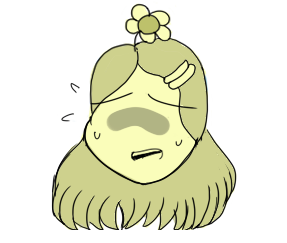 “But how? That ending is essential! You called the paragraph” the Modern Prometheus “, and you don’t talk about how Wendy managed to recognize herself as a single person and not as a copy of Aria?”
“But how? That ending is essential! You called the paragraph” the Modern Prometheus “, and you don’t talk about how Wendy managed to recognize herself as a single person and not as a copy of Aria?”
 “… You know we’re going to talk about Clyde, right?”
“… You know we’re going to talk about Clyde, right?”
Guys, the problem is not Aria’s reaction in alternative endings like Bad End 2 where she kills him so randomly or Good Ending where in five minutes she has an existential realization and above all how this ending creates some huge holes with what we have always seen in the game until the end …
For example, throughout the game we do not see a girl other than Aria, on the contrary we see a perfect copy of her also from the point of view of her personality. Besides, this magic pen is defective for example having created a totally different person! Clyde had to create a perfect Aria! It is a magical medium above nature not, in fact, a scientific experiment with unexpected events or bad brains, like Frankenstein Junior!
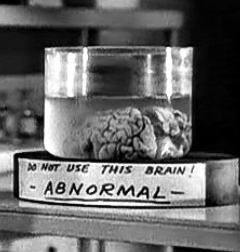
It’s the really troubling and disturbing plot premise, which makes that guy compare to Victor Frankenstein!
So, starting this damn analysis on Clyde …
I wanted to separate one piece of plot from all the others.
“Clyde wanted to test if the fake Aria was as good as the real one.”
If “Aria” didn’t prove to be an obedient creature, what do you do then, Clyde?
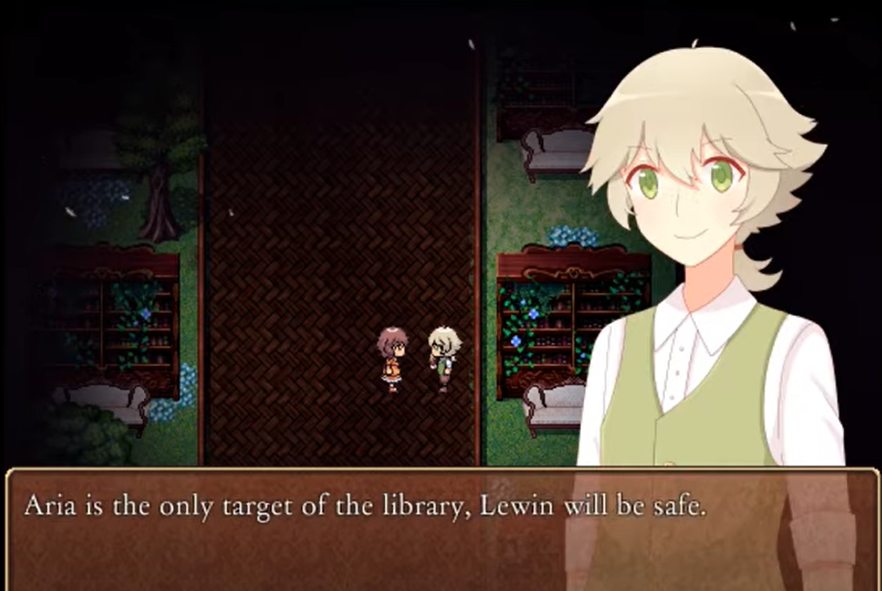
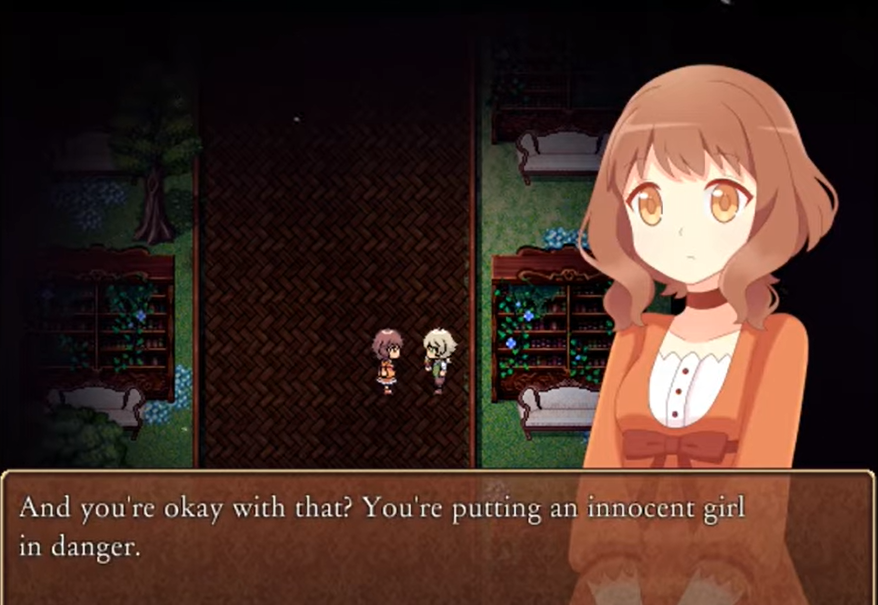
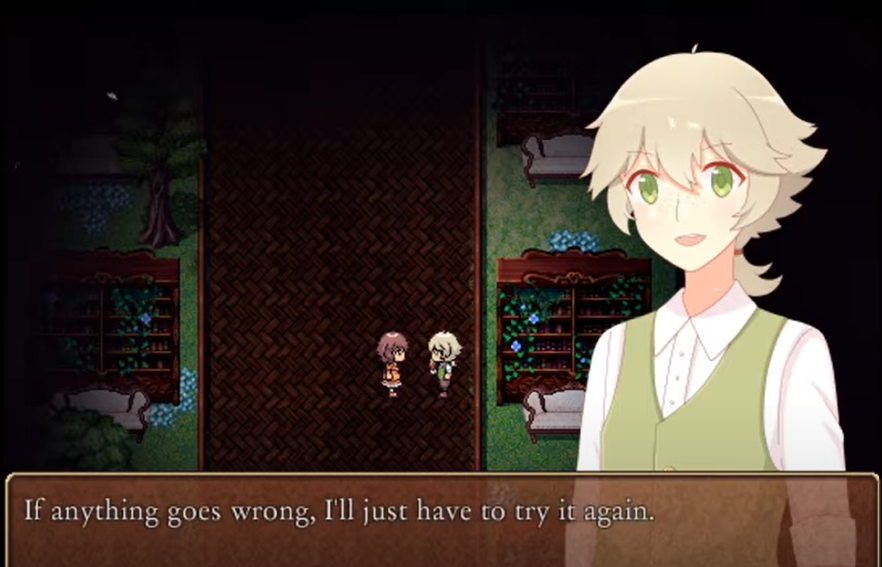
Meanwhile, the Aria just denied by its creator, which has met with who knows what fate:

… You have the possibility to create life from nothing . You can create human beings as you please, fully thinking beings, with their own intelligence, questions, hopes, ambitions! Not robots!
And the life you create, you treat it like this. “If he dies in this world, I create a third, fourth, tenth Air …”.
So, automatically, “If it doesn’t satisfy us, we can kill and make another one that can satisfy our desires”.
Do you realize? With Clyde’s mentality, “Good Ending” could not even be contemplated , because an Aria that did not respect Clyde’s canons would be killed. The fact that the various “copies of Aria” had to even be “tested” says it … It wasn’t enough to see if Aria talked, walked or managed to articulate thoughts. No, we needed the Aria that Clyde wanted .
The slightly more realistic ending (although I always sin of any kind of depth), therefore, is actually the second Bad End where, as in Frankenstein, the Creature kills her master! Victor is punished because he has broken the laws of nature and repudiated what he himself created!
I … I don’t know what to say, even though I know I have to talk because if no one has noticed this very disturbing detail, I have to tell the details!
Speaking precisely of Frankenstein, to go directly to the point, or how this horrible attitude towards a new life is treated … Victor is questioned and eventually even killed, precisely because of the concept that Clyde says!

This sentence says it all!
“And you, with a satisfied conscience, would destroy your own creature!”

(And, in the final …)
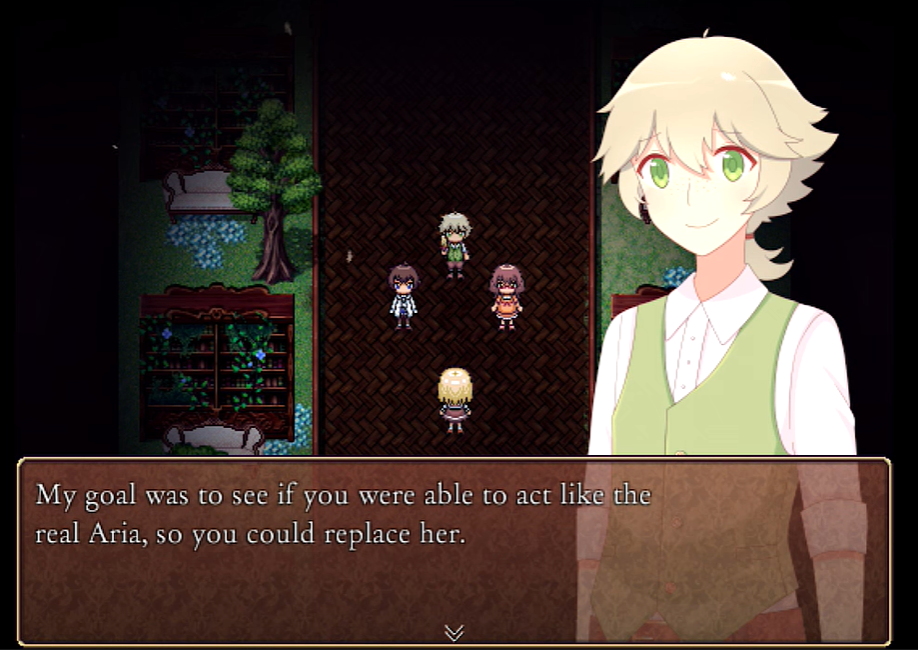
Ah, I forgot.
Thinking about it, even the element for which he DELETED MEMORIES – Once again I wonder what other incredible feats this damn magic pen has – to Dahlia and Lewin makes me think that Clyde did not want anyone to counter him under any circumstances. This adds further concerns to-
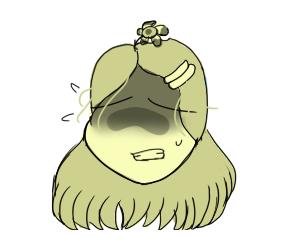 “That’s not true! He did it to protect them, and then in the end he was thwarted anyway, can’t you see ?!” that’s a bad idea! ” Lewin said it! ”
“That’s not true! He did it to protect them, and then in the end he was thwarted anyway, can’t you see ?!” that’s a bad idea! ” Lewin said it! ”
 “… I was just talking about it, flower girl.”
“… I was just talking about it, flower girl.”
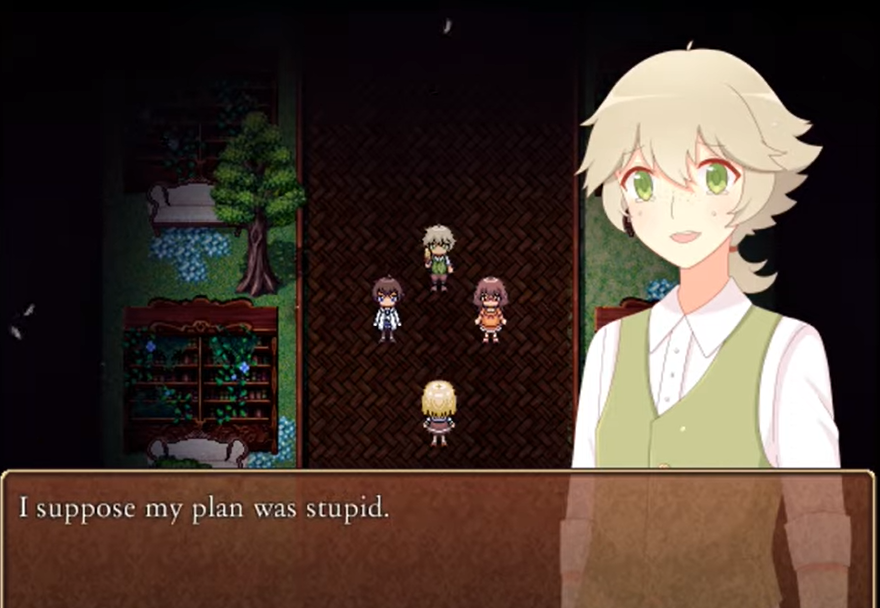
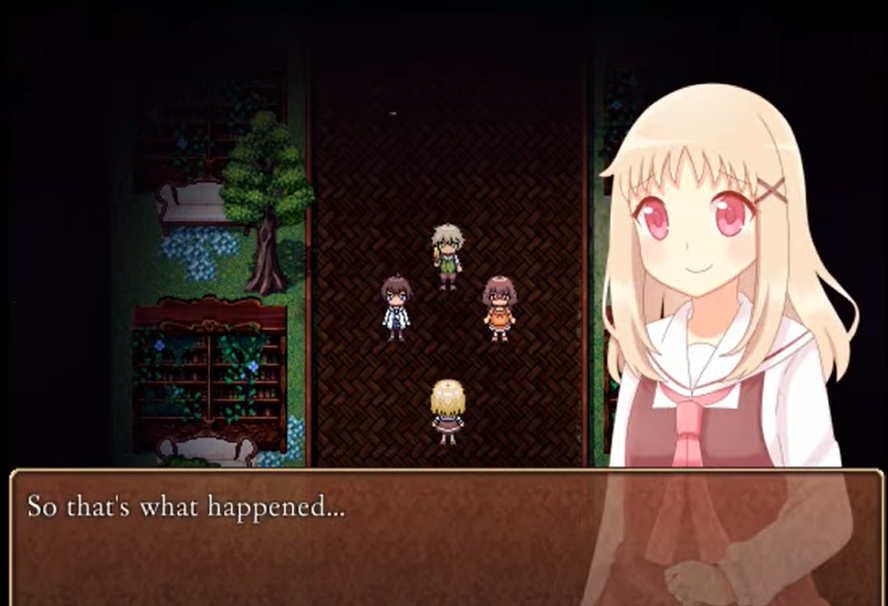
So, even if against this ideal there is also a tiny clash with Lewin along with a tiny afterthought …
After two dialogs, everything Clyde did and thought about doing is quickly forgotten because “now we cry”! An apology with crocodile tears and a “Clyde …” are not enough to say that this problem has been solved. Possibly, the whole game could have been based on this thing! This theme, that of the low value for life that Clyde has, is sinfully put aside and we will see why later.
So, summing up everything Clyde did, just to see what kind of person is justified … And just because I want to have fun, if possible I’ll compare his acts with phrases from any adaptation of Frankenstein, or the original book:
-he brainwashed friends who must have been involved in the madness he was doing.

(From “Mary Shelley’s Frankenstein” by Kenneth Branagh. I can’t digest it, but it’s still an adaptation of Shelley’s myth)
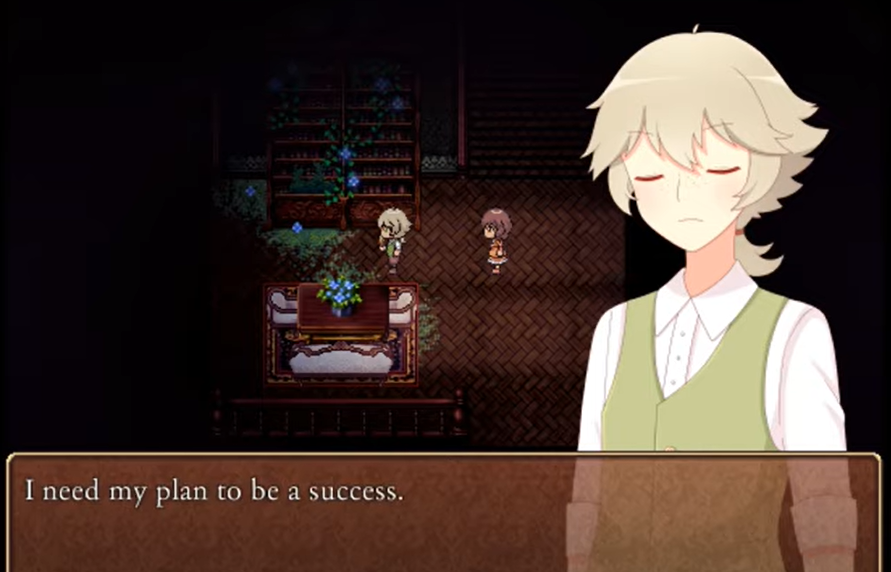
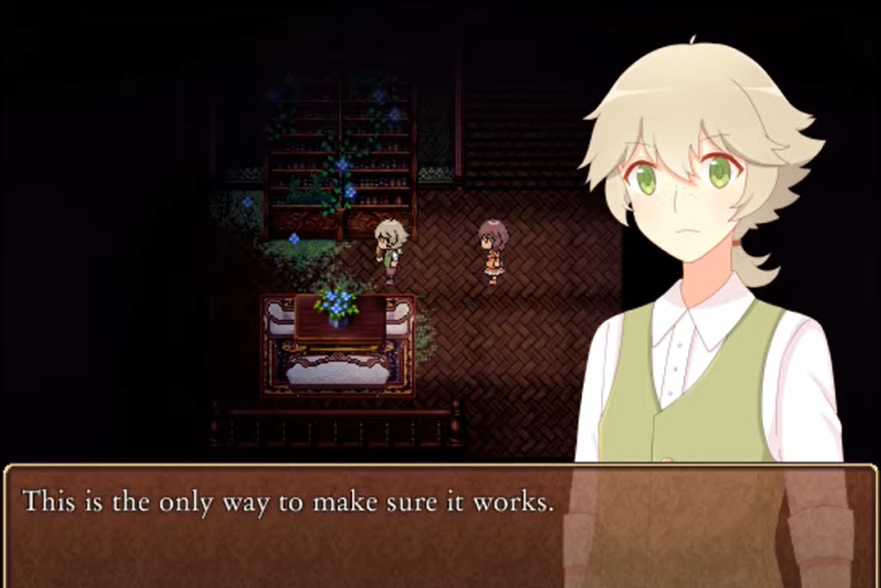
-He brought a dead girl back to life, not respecting the circle of life, and violating the laws of nature

(“It’s alive! It’s alive!” – Colin Clive, “Frankenstein”, 1931. Victor never says “he’s alive!” in the book. The famous phrase comes from this movie.)
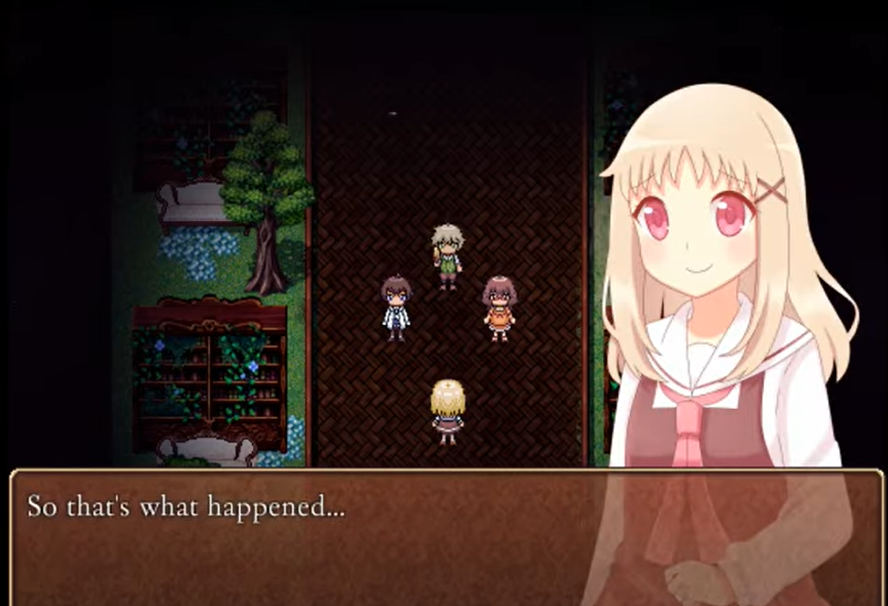
-He expected his creature to look exactly like the one who was a dead girl, and if it didn’t pass a so-called “test”, if Clyde’s creation didn’t prove what it wanted … It deserved death, since has set deadly traps.



– Depends on how many times you die in the game, but he literally created multiple copies of Aria, with no conscience on the ones slaughtered by countless traps of her goddamn world.


And therefore, even if I have already mentioned it in many parts of this paragraph … It is all justified , and this is the truly incredible thing and … Yes, of the same level of restlessness as Clyde’s actions!
But why, you ask?
But for us, of course.
To give us a cute and conforting storyline of course-
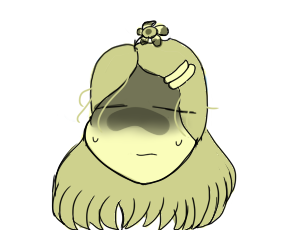 “…”
“…”
 “Well, it was actually done because a creepy storyline with a half-sick character wouldn’t have been good for the game.”
“Well, it was actually done because a creepy storyline with a half-sick character wouldn’t have been good for the game.”
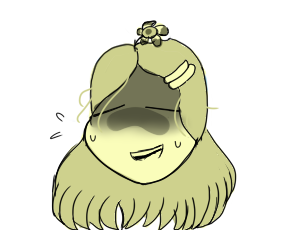 “Uh … Yeah … Aria’s Story wants to talk about something else … Clyde characterized in that way would have gone out of style …”
“Uh … Yeah … Aria’s Story wants to talk about something else … Clyde characterized in that way would have gone out of style …”
Oh yeah?
I tell you, would have actually made the “contrast between cute and disturbing “that the author of the game says so much in the bonus room at the end of Aria’s Story!
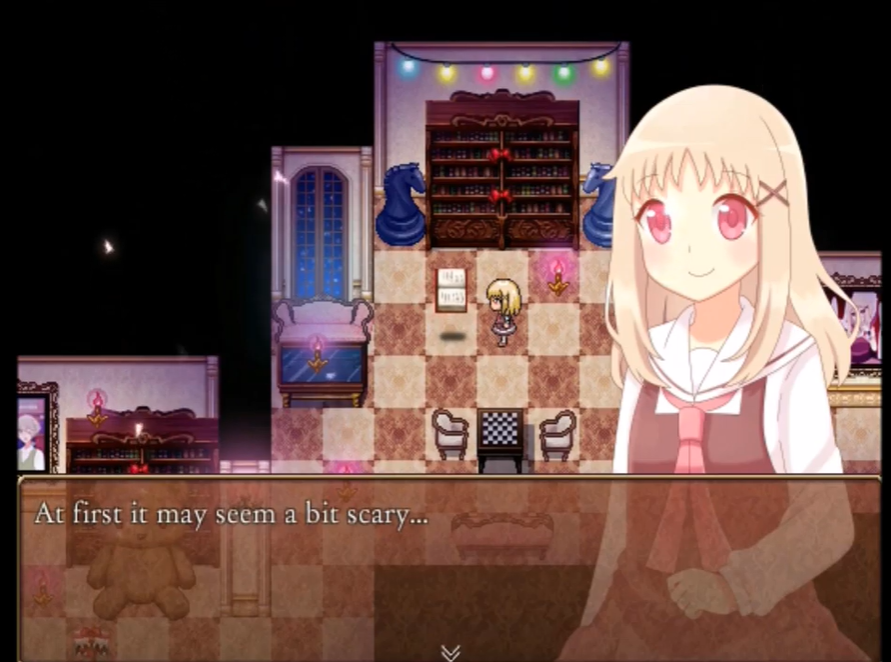
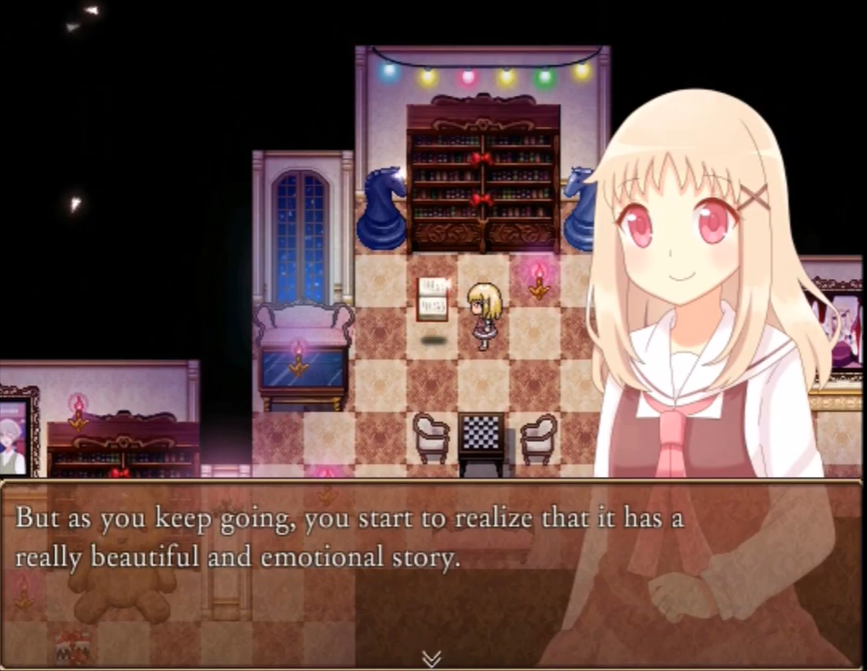
And then … In a horror game, would a character who made abominations go “out of style”? I am sorry to insult directly, but … Do you listen to each other again while you speak?
Finally: Aria’s Story, what are you talking about then, if a really defined and very strong theme (expressions used in a, I think quite appropriately, ironic way) permitted Clyde to behave like this?
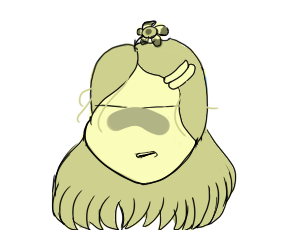 “… It talks about friendship. Clyde did what he did for Lewin. He’s not as sick as you say.”
“… It talks about friendship. Clyde did what he did for Lewin. He’s not as sick as you say.”
 “… Is it bad that I am anticipating all your answers to my questions?”
“… Is it bad that I am anticipating all your answers to my questions?”
… If he made all that mess for his friend of him …
Why did he feel compelled to do it all by himself? Why couldn’t they all agree?
Because it was madness , to bring a dead girl back to life. Lewin did not agree, Dahlia… We don’t know…? I have already said that: Clyde did not want anyone to oppose him, as he would have tried in a single dialogue window to do Lewin himself against him.
So, guys, I hope I have answered your questions … And that we can all conclude that Clyde is a totally unjustifiable person, now that we have all thought of it together (Again, irony reigns supreme) objectively .
But … We never thought about all this, seeing the final cutscenes of Aria’s Story. We’ve all been twisted.
Continuing my speech, we wanted to give a nice storyline of course, in a happy world where all friends are “one for all and all for one”, where people have their weaknesses and frailties, but that’s enough the comfort character on duty to let them pass them and make them become more perfect than they really are.
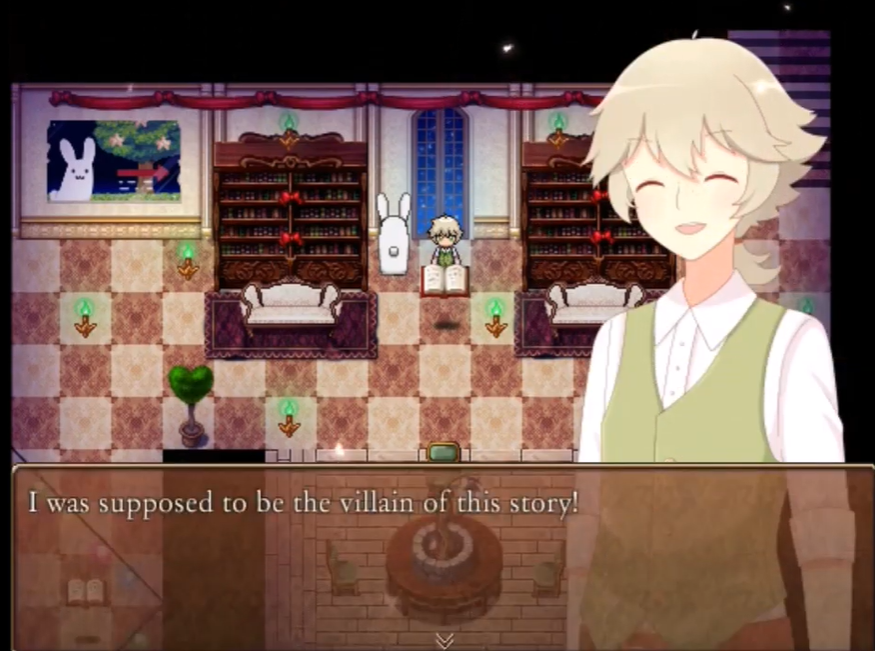
(This statement explains many things.)
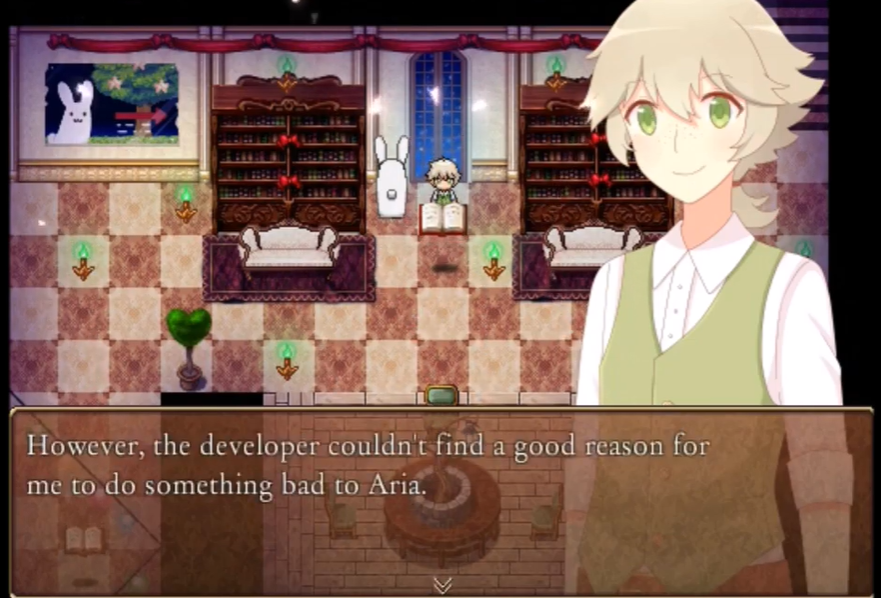
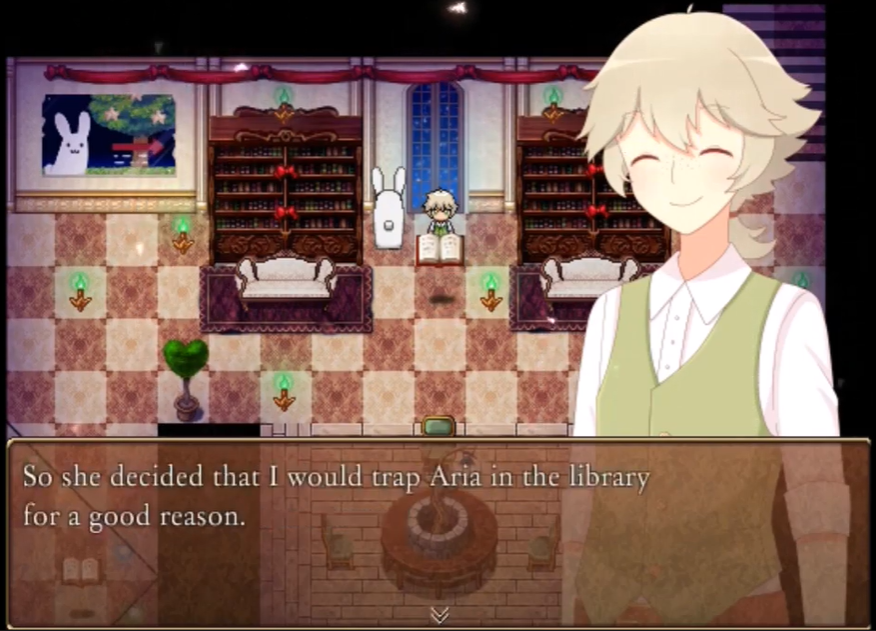
Aria’s Story 2.0 – Bonus Room

“Wow that’s great! Really great!”
(Dialectal roman expression to indicate a catastrophic situation)
Here, precisely …
We like that world. That world comforts us, it makes us feel good to think “people have strengths and weaknesses, but we must always improve ourselves to become the best we can!”. A noble ideal, but one that we know very well that we do not know how to fully respect it. We know that we people are much more multifaceted, much more complicated than that.
However, since we really like that world a lot …
When cute little guys cry, we cry too . Even if all this has no context, it has no basis on which to stand, and it has so much rottenness underneath. We see beautiful faces crying in a crappy scene, and even if we had total nothing before, even if we didn’t have any path to get to that final climax … That scene moves us, so much that we cry.
It’s because we are the problem.
 “…”
“…”
 “…”
“…”
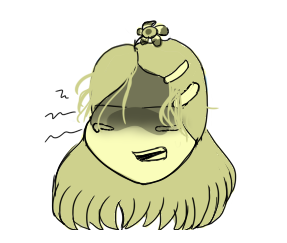 “… I wanted to talk about video games, not have a lecturer. Goodbye.”
“… I wanted to talk about video games, not have a lecturer. Goodbye.”
 “…”
“…”
 “She left in time … Now there should be …”
“She left in time … Now there should be …”
Part 2 – “I finally understand them!”
Therefore, we have now introduced a discourse that will be thoroughly investigated in this second part of the article on the “Selfish Confort Dilemma”.
Do you know why I dealt with these three cases of recent games (except for Cloé’s Requiem) in particular, to finally get to the heart of the whole discussion?
Because all three have one element in common: childish whims that are taken as real suffering or real reasons to act in extreme ways.
Pierre, out of his pent-up frustration, literally told his brother to kill himself.
Clyde, to bring back to life a girl who for Mother Nature had to end her existence, created or intended to create multiple creatures that he most likely could kill him without hesitation.
Aubrey, because of what a series of childish tantrums is in all respects, is considered dangerous and violent as well as being the reason why Basil suffers from bullying.
However, we have said it many times, these whims have always been justified by the works themselves . And do you know why?
Because the characters are put down as victims.

“You had an expression of pain.
The performance didn’t seem funny at all. “
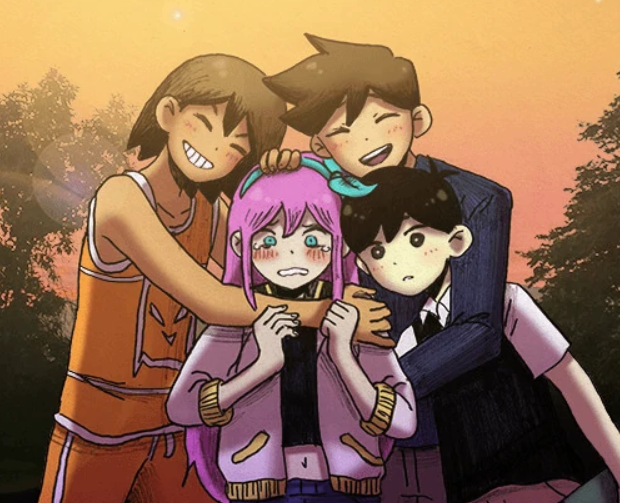



Hmm … Honestly, I only have five words to describe these things.

However, returning serious for a minute, I can react as I want but surely to see those scenes you will recognize yourself in the series of comments that I put as the penultimate image.
You feel that you understand the reasons for these characters, who are more human to you … Because they are weak.
I tell you one thing. This is not understanding. This is victimizing and justifying, what I am condemning from this whole article.
I will explain better what it actually means to understand.
“Understanding” means understanding the reasons why a certain act has been done, but not necessarily saying that it is right, that the one in front of us is actually a good person, or even just someone who is “likeable”. A character we understand is a character that the public is not forced to redeem, but who remains from the complex and logical psychology in his actions.
What does this philosophy remind you of?
The antiheroes . Anti-Heores are nice, huh? We all like them.
The antihero, basically, is used in modern fiction as a “darker protagonist” . In the modern panorama, due to the bad interpretation of this role in a screenplay, these pseudo-antiheroes are also justified, but as a more precise definition we can see that …
“The Antihero is an individual who – from the very beginning of events – has no fear of showing the darker side of his personality. The salient traits of his personality can range in any direction, from selfishness to violence, from reach to shyness, from fanaticism to submission to reach and exasperate every other human characteristic. His vision of his world is often not very lucid and not at all inclined to the rules of good living. ”
(from the site Scrittissimo.com )
-Breaking Bad, The Sopranos, Cloé’s Requiem: moral conflict and the essence of the antihero-
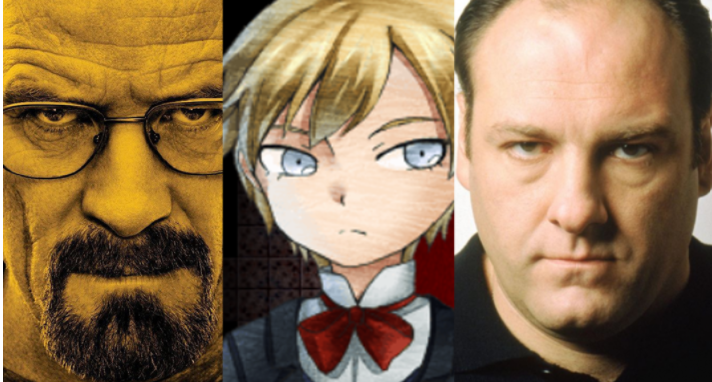
To better connect to what we are talking about, we go for three different cases : one is part of the type of video games we are talking about on this site, the other two are iconic characters of the series landscape – Walter White and Tony Soprano.
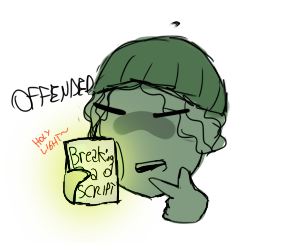 “Do you really want to compar a crappy game like Cloé’s Requiem to Breaking Bad or the Sopranos ?!”
“Do you really want to compar a crappy game like Cloé’s Requiem to Breaking Bad or the Sopranos ?!”
 “Whoa calm down, we criticized Cloé’s Requiem as much as you want, if you hate it so much …”
“Whoa calm down, we criticized Cloé’s Requiem as much as you want, if you hate it so much …”
Walter White – The “OG”
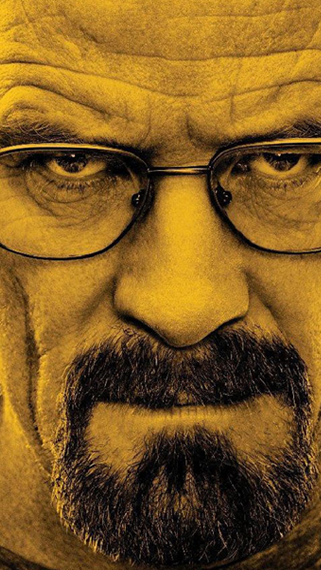
Let’s start with one of the most praised and appreciated series of the last ten years , to get a general idea. I say “general” because Walter White’s psychology is far too complex to cover so briefly, as it constantly evolves throughout the series… And I honestly haven’t even seen Breaking Bad in full. Don’t point the pitchforks at me! I’ll get help from the wiki, which describes Walter White’s psychology very well, when we should mention it about episodes.
But in any case I believe that every nerd on the planet knows the origins of Walter White.

So, Walter White is a chemistry professor, not paid enough from his teaching job, nor from a second job in a car wash.
Walter, after this presentation of his disadvantaged context, suddenly collapses and is taken away in an ambulance. At the hospital, a doctor informs him that he has inoperable lung cancer and still has a couple of years to live.
So, having been introduced to this world through a policeman friend of his who wanted to find a methamphetamine laboratory, due to … Various detailed reasons that I am not here to tell you, I do not want to summarize an episode of one hour and twenty …
Walter, along with Jesse Pinkman (his former student of him), also becomes an active producer of methamphetamine.
So, this was Walter White.
Who is Heisenberg?

Well, a nice change from before.
The methamphetamine that Walter produces begins to dominate the drug market. While Walter was initially picky about the use of violence, he gradually comes to see it as a necessity and eventually develops into him a ruthless drug lord motivated largely by vanity, ego and greed.
So does Walter White become a total villain by becoming Heisenberg?
… Not really. Barring any analysis that can be done on his behavior, in the end Walter White’s transformation into Heisenberg is given by one who is already born as a frustrated man.

(Season 4, Episode 6 – Cornered)
“No, of course you don’t know who you’re talking to, so now I’ll explain how things are. I’m not in danger, Skyler. I am the danger. A man opens the door and they shoot him and do you think that man could be me? No. I am the man who knocks! ”
In this iconic and very famous scene, Walter is in the middle of his path of corruption , this being the fourth season. He feels insulted by what his wife Skyler is telling him, which is that he is “in danger”. Walter tells her that he does not know who he is talking to: he wants to show as much as possible that he is no longer what he was her husband and claims his nature as a “Heisenberg” that he has built.
“A man opens the door and they shoot him, do you think that man could be me? No. I am the man who knocks! ”
This sentence is very clear. We have seen that Walter White has always been a person with a routine marked by constant inconvenience: from the workplace to the family. I think the official fan-wiki description about the series can describe what Walter felt (when he was still “White”) better than me:
“ It is clear from the start that Walter is suffering from a midlife crisis. He feels downcast, tired, bypassed, cheated, emasculated, exploited and dissatisfied.
Even the field in which he has the most skill, chemistry, falls into the void of his disrespectful and apathetic students. Even before his diagnosis, Walter felt like a failure, unable to adequately provide for his family and fulfill the role that American society expects of him.
The news of his terminal lung cancer leaves Walter numb and shows almost no emotion when he learns it, as if he were already dead. Learning that his life will be unexpectedly cut off, coupled with the knowledge that he will leave his already bankrupt family, is the last slap in the face, the last humiliating insult that life can inflict. “
So, as Gavrilo Princip’s assassination of Duke Francesco Ferdinando is described each time, his cancer was just the last straw for a man already predisposed to failure. This is also the reason why so he got into the drug business relatively quickly, compared to what a person of true sound principles would take to make a decision whether to continue what Jesse introduced him to or not.
So Heisenberg actually, along with all of his negative traits, is just Walt’s frustration that ultimately came to the surface, making him the cruel kingpin who develops and descends more and more into depravity in subsequent seasons: Walter White’s is not, therefore, sudden corruption but the result of a constructed context to make him a frustrated person, even without falling into total disastrous / dramatic and a series of situations that have challenged his moral, both when he was supposed to be “Walter” and when he was supposed to be “Heisenberg”.

(Season 4, Episode 6 – Cornered)
A Walter is presented with the decision that he can admit to his wife that he is indeed in danger, because minutes earlier he demonstrated a moment weakness, I think also obvious. But Walter rejects this statement , claiming the nature for which he wants to be recognized, that of Heisenberg. But in general his entire conflictual relationship with Skyler is the perfect demonstration of the moral conflicts of him as “Walter Hartwell White.”

(Season 5, episode 14 – Ozymandias)
Since his brother-in-law is part of the police and the latter is captured by a collaborator of Walter (I don’t know exactly the role of the character of “Jack” in the plot nor what relationship he has with Walter, so forgive me the small inaccuracies), even if by the end of the first season he has already started his journey as Heisenberg, this did not mean further moments of upheaval, weakness or humanity for Walt: He keeps begging for the life of Hank (his brother-in-law), but Hank refuses to cooperate and is killed. Walter is horrified; he falls to his knees and then falls to the ground on his side, crying.
After these situations, in fact, Walter in the series demonstrates under the name of Heisenberg who he always wanted to be , or rather “not the one who gets shot in front of the door”: hence the drug business, so he seems to be talented, for Walter it is a solution to this inner malaise he has had for his entire life and the horrible acts he does over the course of the series we can consider them as the outlet of a frustration that has accumulated for decades.
And therefore, given this continuous contrast between these two identities that blend inconsistently in Walter’s person, we have what everyone considers the anti-hero par excellence, the perfect anti-hero.
But, in any case, even if you can do all the psychological analyzes of the character we want for this man …



![]()
(And, I add, the one above is one of the acts that destroyed Jesse the most mentally, it seems)


(The one on the left is the woman’s son, Brock, who died for the same reason as his mother)
![]()
In short, we can understand as much as we want, by analyzing his personality … But he is still “The Danger”.
I thought it was fair to talk about Walter White, talking about anti-heroes. He is considered one of the greatest of all time and makes you understand perfectly what it means to have a well-written character who can be adored at the same time: without victimization, without mercy for him.
“Understanding” means understanding the reasons why a certain act was done, but don’t necessarily say it’s right, that what we have in front of it is actually a good person, or even just someone “likeable”.
Michel D’Alembert – The positive path of a kid at risk.
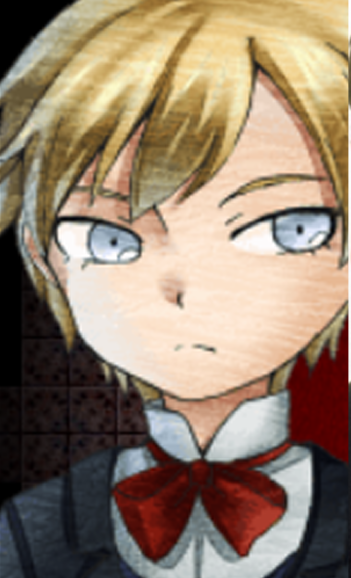
Let’s go to the little boy in the center, who looks a bit disfigured next to the two big men James Gandolfini and Bryan Cranston. His analysis will also be shorter than the other two characters, given that his psychology has been sufficiently analyzed in the appendix to the article on Cloé’s Requiem. I wanted to talk about Michel again from the point of his probable “justification” mainly because the comment I put three times in this article comes from Cloé’s Requiem: Con Amore, an extra version of a game that certainly has one of the more complex characters that I know well.
Then:
Michel, already from his past, is always considered a childish boy.

This infantility is visible: therefore, right from the start, we can guess that Michel’s immaturity as said by the other characters is not based only on chatter and above all it is TRUE. It has very clear demonstrations, including not being ready to enter the adult world, where everything was profit in those days.

We can see this from the character of Pierre, the more mature twin, who constantly condemns Michel.

Michel kills the maid Charlotte for a wrong, and later her father for the same reason, given his obvious propensity and risk of psychopathy.
he He then has a moment of delirium and, running away from home, he begins what is interpreted as a therapy path at Cloé’s home.
Here Michel, in addition to knowing the story of her girlfriend, begins to have a distorted view of her.

And when this vision is betrayed he has a second delusion.

“The Antihero is an individual who – from the very beginning of events – has no fear of showing the darker side of his personality . The salient traits of his personality can range in any direction, from selfishness to violence, from selfishness to shyness, from fanaticism to submission to reaching and exasperating every other human characteristic. “
But his positive path towards redemption along with what I consider therapy starts here: he reads Cloé’s diary, which disillusiones him with his previous convictions.

He realizes what he has done and, even though Cloé does not understand why he is doing it, Michel apologizes to her.
Michel has real faults , sick and twisted visions of the people whosurround it, and for this it has paid the consequences. It has done so with so much inner suffering, along with the risk of death at every corner because of the cursed house.
And, most importantly, the fact that his father was exploiting him for money is never, ever mentioned, and his inner suffering never becomes an excuse. That detail gives us he is told only to know the story of this character and why he ran away from home. It is as if for everything he did he had to go through those obstacles and that pain.
In the end of the game, therefore at the end of his growth path, Michel does not stay at Cloè’s house, hidden and unaware of her faults.


A player, however, can always think about everything Michel did before this final state. Michel is never a victim. He has always been someone who hurted people (or risked to do it): from murder to possession. For the entire game we have to deal with an ambiguous character, even if we subsequently know that he suffered.


“Understanding” means understanding the reasons why a certain act was done, but not necessarily saying that it is right, that what we have in front of us is actually a good person, or even just someone ” likeable ”.


(Michel, even after apologizing, still feels guilty about the distorted vision he had of Cloé)

(Michel has a constant fear of returning to the way he was before, a dangerous person for himself and for others)
Michel certainly had a different path than Walter’s, he is actually “redeemable” even in our heads compared to him …
But because Michel himself has had a path of growth , which can make us think of him as a person who has managed to grow in the course of his difficult life.


Michel also matches these descriptions, therefore, even if we have a different type of path.
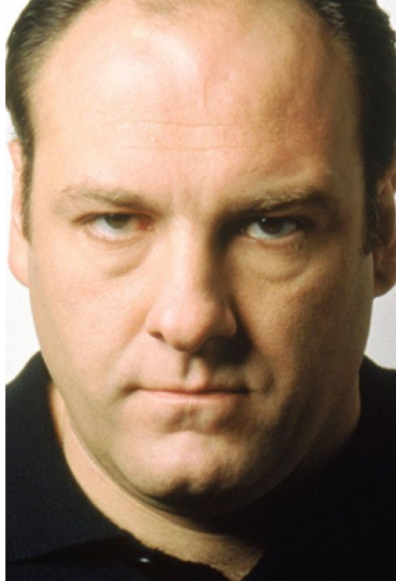
Our latest case, which I will mention several times in this article, is Tony Soprano, star of the TV series “The Sopranos”.
 “Hehe, I recommended this to him!”
“Hehe, I recommended this to him!”
 “Here, in fact, I haven’t seen the series … Come here for a moment!”
“Here, in fact, I haven’t seen the series … Come here for a moment!”
TONY SOPRANO – A double view for a mafia boss
And only for this part about Tony Soprano here I am ready to do a little intervention! I want to be absolutely honest with the fans of this historic television series: I only saw a few episodes to take an exam; I have absolutely not seen everything about the world of “The Sopranos” and this is one of the main reasons why I will limit myself to commenting, also considering this case study as a way to close this parenthesis on the good examples of the characters, only one scene in particular that can summarize the our intentions on this article.
For those who read this article and do not have had the opportunity to enter the world of TV series, you should know that one of the strong points of “The Sopranos” is to tell the daily life of an Italian-American mafia boss . By daily life we mean both the problems he has to face with his subordinates and the anecdotes of family life.
You should know that the first episode immediately focuses on the fact that Tony goes to a psychiatrist for the first time, where he begins to explain to us that had a panic attack, with fainting attached, when he discovered that the family of ducks, who had settled in the swimming pool of his house, emigrated.

There will be more anecdotes from the psychiatrist in which the recurring symbol of the duck keeps returning, for example in Tony’s dreams, and it won’t take long for the doctor to discover that that image is as recurring as the man’s fear of losing his mind. His family making him cry during therapy.

To see this scene just go to the minute 0:51:28, first episode
Not even five episodes later we have a scene like this!

Episode 5 , from 45.54 min you can start watching this long, anxious scene
There are two things that struck me while strangling Febby Petrulio, or maybe three.
The first, the most “obvious”, is how in the scene you stop to frame the belt that tightens on the throat of the victim. In short, we really insist a lot.
But let’s get to the important things:
- The shot has something disturbing because even the camera is in a position where it seems to be dominated by Tony, that is, we ourselves as spectators identify with the victim who is suffocating.
- A few seconds ago this poor man had said something like this: the moment he found him the night before “he didn’t shoot him because he was taking his daughter to college”, he thought Tony was another person .
And after the unfortunate man has left us his feathers, what happens? First you hear a rising sound, an echo, and then a flock of emigrating ducks is shown that Tony stares at, framed from top to bottom …

Surely the ducks that are heard in the background is a very important link in the context of the series, but even seeing this scene out of its context we can see the difference in the use of the shots on the character and therefore the change in our perception towards him. .
From below and then from above, we are above him, we can judge him because the character becomes small on the stage. From the veins, the effort and the expression of anger that almost frightens us, following the calm shown for those who have been carrying out these activities for a long period of time, there is immediately after this scene in which Tony “is judged from above” and he can only contemplate.
I want to consider another element in this scene …

I really want to show you how a simple comparison of images is enough to unleash certain emotions or sensations in us!
Do you remember that I had made a similar example, from the most negative point of view, in Cloé’s Requiem?

Without any commentary, dialogues, words, phrases but simply observing the change from one moment before to the next in a single scene alone 2 minutes, assigning a meaning at this passing of time we can change our perception of the character and our impression of him confuses us, keeps us tense and makes us reflect.
Returning to Ele …
So, in addition to what you consider a fan’s thoughts on Cloé’s Requiem, we also analyzed characters that are part of cult series, Tony Soprano and Walter White are often defined as among the best characters of all time … And indeed, all these beautiful characters respect this definition:
“”Understand “means to understand the reasons why a certain act was done, but not necessarily to say that it is right, that the one we have in front of us is actually a good person, or even just someone “likeable”. A character we understand is a character that the public is not forced to redeem, but who remains from the complex and logical psychology in his actions.
Let’s take one of the characters we have previously analyzed, does it reflect this definition?

Aubrey is a very childish girl who has developed violent outbursts and a propensity for aggression. This is because she is still grieved by two griefs she has had to endure.
But how does the game put you down this pain, which is expressed by Aubrey with unwarranted violence towards others?

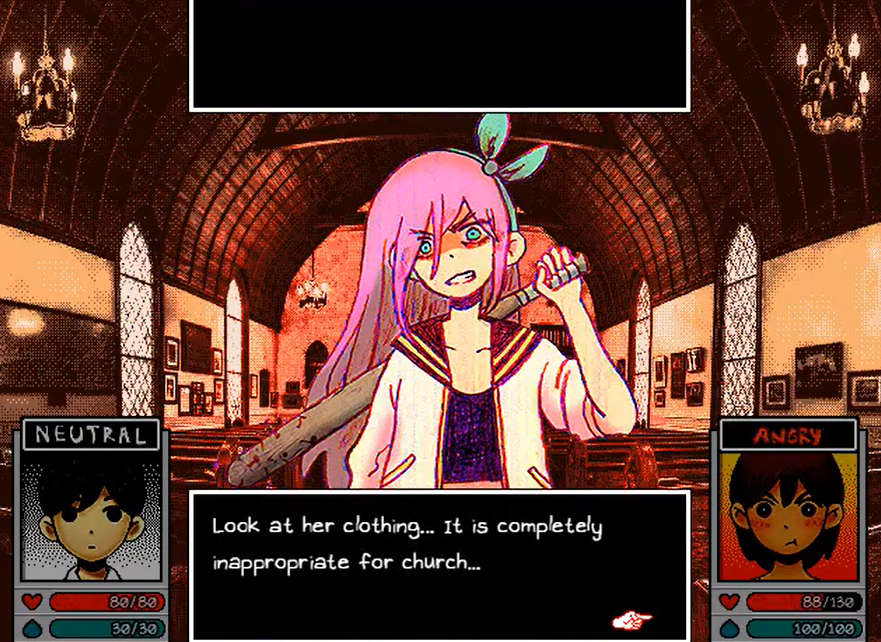
So, ultimately, Omocat wanted to tell us that Aubrey hasn’t done anything wrong and that the problem is “the people” who “want her to be bad.” In short, “it’s always someone else’s fault” .
Small problem. Nobody wanted Aubrey to be reduced to this state. Aubrey as a child she was not bullied, much less hated by anyone: she was not even defined as a weak person. Aubrey self-destructed herself, she did everything, she should mostly blame herself!
We will explore this theme later, but …
Here there is no moral conflict for the player. Anyone who sees this scene totally changes their mind about Aubrey and in the end she is as good as everyone else. Violence becomes a her being “a little aggressive” and in the end they are all happy and content.
A character we understand is a character that the public is not forced to redeem, but who remains from the complex and logical psychology in their actions.
Crooooss
So this is not humanity. This is a simple crybaby, who wants to win over arguments that are dead and buried years ago, but only because she does painful faces, almost beats us with tears and is objectively a pussy crazy, we justify it.
Let’s compare it with a cult …


As we have already pointed out Tony Soprano is a mafia boss. From here we can understand that he does almost every kind of atrocity: I don’t think I have to explain what the mafia does.
But in any case, an everyday reality is also presented. We have the same boss that we find mercilessly killing people having a panic attack, and in general … Just being a man, with clinical problems from his past, but not for this the actions of he are justified. Tony is still part of the mafia, but at the same time he has a family he cares about, he has problems that unfortunately he has to live with …

But he never hesitated to shoot someone. He never hesitates to do his job, nor does he cry over it, when he is introduced to us. When we find out about his past we have the reasons for his anxiety about him, how he got into the mafia …
We only have reasons, not justifications.
There is, therefore, a real EMOTIONAL CONFLICT to judge him , or to put him on a moral spectrum instantly. Because it is born as negative, even if it demonstrates the so-called “humanity” that we all seek.
But why am I looking for “conflict” so much?
 “Why, what a surprise, storytelling is done with conflict! If there is no clash between two or more elements, what development must there be? ”
“Why, what a surprise, storytelling is done with conflict! If there is no clash between two or more elements, what development must there be? ”
And like conflicts, since today’s stories all want to pretend to be character driven… People look for conflict in characters. So internal conflicts, to be passionate about, to debate in order to come up with stimulating speeches, because when you want to analyze the reference work, this is what a fandom does …
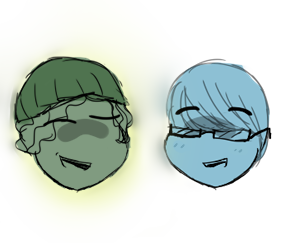
“Ahh, you’re right. This thing has the philosophical meaning of –͚̓-͎̑͡ͅ-̭͎͗̀-̼̝̂̑-̞̗̿̾.”
“This girl doesn’t understand anything, but she doesn’t see the conformation of Omori’s maps? She blatantly says –͚̓-͎̑͡ͅ-̭͎͗̀-̼̝̂̑-̞̗̿̾!”

“She has never played Midnight Train in my opinion.”
“This double side, this double value and conflict that you praise so much with … What’s his name? Tony? It’s here too! Criminals but good-hearted all the same!”
“She talks about Tony Soprano, c’mon … She just wants to give herself a tone because her sister tells her all about this old stuff, and she’s salty because the others are more popular than her …”
 “…”
“…”
 “… Okay, I’ll give you an example with something your philosopher’s cerebellums might appreciate, since Tony Soprano doesn’t interest you.”
“… Okay, I’ll give you an example with something your philosopher’s cerebellums might appreciate, since Tony Soprano doesn’t interest you.”
…
 “Have you seen Frozen?”
“Have you seen Frozen?”
 “Ah-ha. The most innovative Disney classic I’ve ever seen.”
“Ah-ha. The most innovative Disney classic I’ve ever seen.”
… I leave you to this screenshot. It is from the fans of a youtuber who criticizes animated films on Youtube: Flame88Tongue. She has heavily criticized Frozen in general, and her fans of hers have come up with a very interesting speech.

“There is an atavic terror to test children with a difficult story, or something that creates a little bit of anguish.”
“That’s right, if you don’t face anything, you never grow… These people want children to be surrounded by wadding”
“Fairy tales has the primary function to make children experiment negative emotions in a “protected” ambient, to prepare them to the traumas of real world, that isn’t really protected. (…) How much the loss of moral values depends from the loss of big narrations?”
The video focuses mainly on how Elsa’s character is treated. It has many similarities to the cases we have today: horrible person, victimized… So good, for some reason.
This need to make Elsa a victim conditioned the writing of the entire first film: the screenwriters, to make this BITCH true, had to rewrite the film from scratch. Elsa was supposed to be a villain, Let It Go was a song for the villain.
But no, you can’t have a bad person. All bad people have actually suffered, and they can be helped or fixed to make them the good people they really are! We talk a lot about “cruel world” and the like, to be a little edgy and pseudo-realists …
And then in the works of fiction we let ourselves be enchanted by these childish ideas?
Guys, we were confronted with children surrounded by wadding.
I despise the definition of “special snowflake” in English with all my soul. It is often used by ignorant people who, for one reason or another, feel they are minimizing the problems of others, insulting them in this vulgar way.
But … In this case I want to use it, I think it’s worth it.
This evil no longer seems to be relegated only to products intended for children …
What I notice in many recent creative works is that now we are no longer looking for something seriously raw or distressing , even in the genre that should be the cornerstone of these two sensations: horror.
We, the audience, have become special children who see the slightest struggle and want to write us a hell of a treaty. Not only because we are only good at talking, but because as idiots we let ourselves be moved by scenes that in reality then they have no consequence. We never see the weight of the actions done, or even just the weight of the words.
Because in the end there is never a real conflict, not even when potentially terrible or ambiguous things are done or said, “turning points” no longer exist. There is nothing that really marks, for example, the relationship between two characters, there is nothing that makes it change permanently for the better …

(Cloé’s Requiem, True Ending)
Or worse.

(Breaking Bad, S05 EP.12)
The value of the basic fictional work has been lost. The CONFLICT to be solved in order to have a resolution. Or the conflicts are so futile or really reduced to a minimum as to make the viewer always feel safe, with resolutions thrown in, idiotic, illogical, tacky and level of a soap opera at the level of useless drama. We spend our breaths on works that do what is the minimum for the work of fiction.

(Really, the confrontation with Basil had to be one of the main points in the game, not in the conclusion just to solve all the plot points. The single scene has potential, albeit with symbols seen, revised and overwhelmed, but compared with all the plot that exists, it is a show for its own sake, which is also illogical with plot elements.)
And I have a hypothesis on why all this.
Because we don’t want to recognize ourselves in any problem that could affect us too closely. Why us; public, developers or anyone… We always want to feel understood . Always. This is why we like worlds where everyone is a victim, where everyone can be “settled” with two words of comfort. We secretly have that attitude of “maybe life would work out this way”.

With “special snowflakes” therefore, in our case, I mean that we have reduced ourselves to small waffles . We want someone or something who always understands our problems, even if in some cases there is nothing to understand. And we do this with the phrases “there will be a reason why he is doing this!” , which actually translates to “there will be something that justifies these behaviors, because I cannot conceive that some impulses and jerks are in the human nature, which is not only complex when I want it, but is complex in any case, even with its inexplicable negativity “.
Instead in these types of works today no one is actually a bad person. We hide with the excuse that “we all have weaknesses and facets” to hide a gooey goodness of people affected only by external negative stimuli, which in reality they never have any fault.
This is why any attempt at conflict is futile.
Because in the end we all have weaknesses, so we always deserve to be understood and we must never change.

“You had an expression of pain.
The performance didn’t seem funny at all. “
Because in the end it is always someone else’s fault for our every negative aspect.

Because in the end our feelings, as long as they are good, can also be strong enough to commit immoral acts.
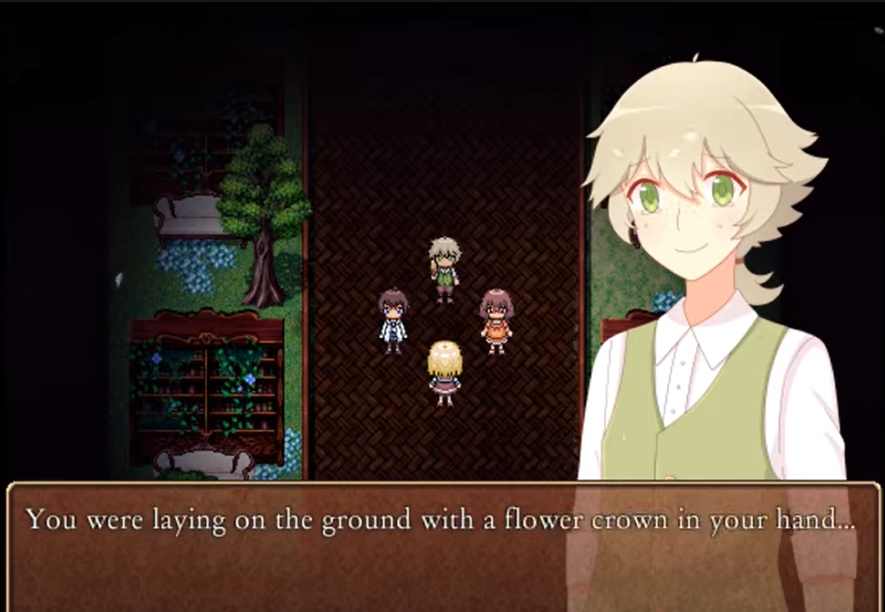
And as long as we suffer, any kind of our impulse or impulse, even if harmful to others is fine, so it will always be someone else’s fault .
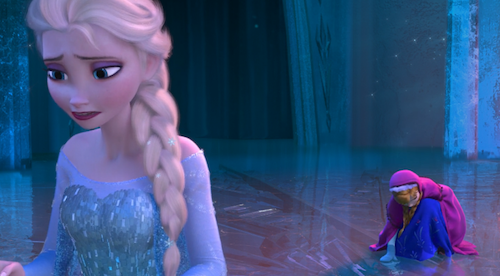
Because we always deserve love, we always deserve to be understood and loved.
Do you want to tell me what the hell messages are from today’s creatives? Will you tell me what Horror RPGs are becoming and what modern fiction is becoming in general?
Speaking of the case of Horror RPGs, given that this site talks about this particular current and how it is falling to its demise…
I really want to show you how this current worked long ago.
On this site there are various articles in the “Back To The Future” section, where we talk about games that have been real cult of the genre.
Now let’s see what these titles give us. One by one.

Corpse Party – 1996.
It has practically given us the basics, even if it now moves away from what can be defined as a “classic Horror RPG”. Great representative of Generation 0, the CORPSE-PARTY (yes, I speak of it as a literary classic, because I consider this too history!) By Makoto Kedouin was the OG, the one who started so many projects on the basis of one thing: the contact and experience made by the player.

This was increasingly developed with Ao Oni , eventually reaching its peak with Yume Nikki.
Here the player experienced the real horror experience on their own skin .

Mad Father – 2012.
Generation 1: The Character Drama.
Sen wanted to try more at the level of similarity with passive fiction, and managed to prove that he was a creator capable of making entertainment . The story, in the original Mad Father, did not demand or force particular depths. Sen’s Mad Father began shaping what would later be completed by …

Mogeko Castle (Remake) – 2014.
End of Generation 1.
Mogeko Castle is a clear parody of what has been built during the generation in which it stands. It has brought variety to the Horror RPG genre, risking the gameplay a little to simple exploration, giving even more importance to the inspiration of the passive opera at its best, with many different registers to form a multifaceted work . So, Funamusea’s Mogeko Castle adapted to the best of what Sen had started, with a captivating product to the stars, and content to be stripped away (from character descriptions to content made by the author herself – such as those of the “Girl with Lifeless Eyes “And the” Girl with Flashy Hair “), so as to try to take the Horror RPG genre out of its niche, to take it to something bigger.
Do you see how much these titles have given us? Some are really “simple” and none of them have “changed the international gaming landscape”. No one has ever spent such big words on it. Because they only did what their genre says: they were Horror RPGs.
We were just scared, had fun and expected nothing more than to get our hands on other “games similar to Ib”. We enjoyed it, when we were younger we didn’t sleep at night …
 “Has anyone ever been afraid that Aya’s father would show up before you in the dark? Are you sure?”
“Has anyone ever been afraid that Aya’s father would show up before you in the dark? Are you sure?”
 “… No? ”
“… No? ”
 “Oh. Ahaha, children are so dumb!”
“Oh. Ahaha, children are so dumb!”
At certain times there was no need for Outlast’s big jumpscare, when it came out in those years along with its DLCs. No, we wanted to experience serious and very cool restlessness. Of course, we talked about the characters, we had innocent debates and everything: a great case was that of Ellen, who shocked the entire audience who watched gameplay or played The Witch’s House …
But the first thing we did was entertain ourselves , because the writers knew what the hell they were doing, and they knew they had to ENTERTAIN people.
Now … Now what do we have? What do the authors give us today?

(Intervista di Omocat a IGN)

(“Midnight Train” 2019 title from the author Lydia. We will talk about it later)

They give us their disappointments; how they cope with their disappointments. They communicate to the public their need to comfort themselves . They don’t care about us anymore. RPG Horror today has become just a label to be applied to causal titles from spoiled children who want to express how much they feel the need to feel “understood and important” because they are frustrated with their life and the world.
 “… Those were my notes. Didn’t you edit them either, or anything? Hell, we’re not here to personally insult, I mean you had to put it down another way …”
“… Those were my notes. Didn’t you edit them either, or anything? Hell, we’re not here to personally insult, I mean you had to put it down another way …”
 “Listen … I had to say it. I couldn’t find any other words.”
“Listen … I had to say it. I couldn’t find any other words.”
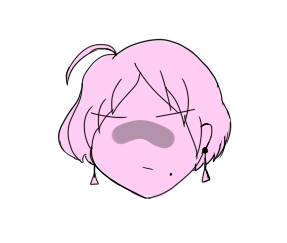 “…”
“…”
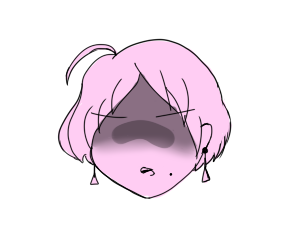 “Who the hell do you think you are?”
“Who the hell do you think you are?”
 “…”
“…”
Yes, I said a really generic and bad phrase. On the part of developers, these kinds of slips just don’t have to be there. We risk making the figure of someone who simply eats his hands to the success of others.
But … Really, I’m not going to insult individual authors here. It’s a problem that RPG Horror in general has been carrying for a long time. And in my opinion, is the one that leaves it a bit in the niche compared to other video game subgenres , what makes it undervalued as a genre to be totally fixated on and that has kept the current in “simple and adorable indie games that were fashionable in 2012 and now boh”.
The videogame has always been compared to many other different fictional works. From a technical or narrative point of view. In some cases, I take Red Dead Redemption 2, many games manage according to some to stand up to cinematographic works; be it blockbuster or B-Movie. On this, however, the video game is still evolving and I know it well.
Now, speaking of a relatively recent game, I really want to make you understand with a case study, with what is a case of creative ingenuity, all the good speech I made. We really compare a Horror RPG today with a character driven work of an industry that existed before that of the cinema, which today alas is suffering various problems.
“Dear Neil Lawton, this is gonna be a good day and here’s why.”
-Dear Evan Hansen and Midnight Train on the problematic protagonists-


The former is an adventure RPG released in 2019. The latter is a musical with a drama story, which premiered in Washington in 2015.
I played Midnight Train several times with my sister, because many times we enjoy playing things we hate since we are masochists.
 “You count this pastime as… When with friends you see“ The Room ”by Tommy Wiseau!”
“You count this pastime as… When with friends you see“ The Room ”by Tommy Wiseau!”
Dear Evan Hansen … I haven’t even seen it all, nor heard all the songs. I will know 3 or 4.
 “What? You haven’t even seen it and pretend to compare it to-”
“What? You haven’t even seen it and pretend to compare it to-”
 “… I can’t take it anymore… Are you still here, you…?”
“… I can’t take it anymore… Are you still here, you…?”
I was saying … I don’t know the whole story of Dear Evan Hansen, I know some fragments and I know few songs, so I can’t objectively judge it as a product …
Why, however, I want to confront them anyway?
Actually I want to talk about a very, very simple theme, which in the musical I can circumcise to just the song “Good For You”, and in the game I can circumcise to Neil’s behavior in Chapter 4 of the game.
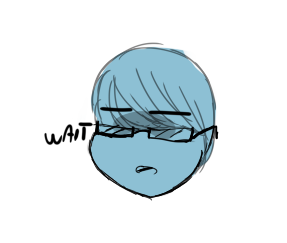 “Wait. You can’t compare a work of adventure, which also has an external plot to carry on, with a drama that has only the happenings of the characters to tell. ”
“Wait. You can’t compare a work of adventure, which also has an external plot to carry on, with a drama that has only the happenings of the characters to tell. ”
 “… You’re the only one I don’t hate, you know?”
“… You’re the only one I don’t hate, you know?”
Indeed it is a legitimate question.
I wanted to compare them, more than anything else, always to return more or less always to the same themes: conflicts and the victimization of the characters.
Let’s start with Midnight Train… Together with what I describe as a beautiful and good case of “toxic postivity”. In fact, before we get to how he was treated by the game, we need to discover a certain part of Neil Lawton’s character.
As already mentioned, we will analyze Neil in Chapter 4. But first let’s make an overview of the character, thanks to the presentation of the characters written by the author herself.

Luna’s companion (the protagonist) during the game, a kind boy who wants to be a detective and is in the same situation as him. He is weak, naive and easily panicked, but he helps Luna with riddles and riddles.
During the game he has a subspecies of character development, which gives this initial description …

(Here he is talking to a vision representing his uncle … Yeah, let’s not ask any questions, as Neil has the classic backstory as a kid abused by the bad adult … Yeah, Dickens-style but worse.)
From these two images alone, if you don’t know the game… You can say “oh, this character has had arc corruption! And here he is at his peak! ”.
No. In the game this scene is actually very decontextualized. Simply … Neil shoots insults at this vision of his and after this scene of the “torture” the pseudo-santarellino always returns. As if this scene were to mark the strength to insult one’s abuser, to also mark the definitive boost in Neil’s self-esteem, given by Luna’s company.
After this scene, we have to go back to look for Luna, who in the meantime has gone away from Neil because it turns out in the chapter that she was a killer who took multiple lives and therefore for the returned remorse for everything she did, Luna wants kill yourself. I consider this to be a totally legitimate motivation.
But Neil, after understanding the girl’s suicidal wishes, how does he take it?
We see this boost in self-esteem as he has shaped his attitudes towards a girl who has tried several times to commit suicide. At this point in the game she has already tried to throw herself into some thorns and enter an incinerator.
( … I skip the very generic speeches “I’m a killer”, “The past doesn’t count!” – We’ll talk about this problem later …)



“I’m in the same situation as you too, but committing suicide is wrong, period! Not me and the others (game characters) have ever thought about it! ”
What the hell is that about ?!
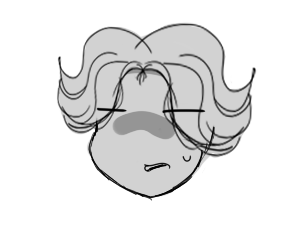 “Ah well, you want to condemn Neil then. He just said he mustn’t kill himself, geez.”
“Ah well, you want to condemn Neil then. He just said he mustn’t kill himself, geez.”
 “… Okay, then you see this sequence of images, when Luna resists Neil’s words and rejects his hasty conclusions.”
“… Okay, then you see this sequence of images, when Luna resists Neil’s words and rejects his hasty conclusions.”

(Luna is a mute girl, Neil is reading what he wrote in her notebook)
What Luna says is absolutely right. She bears full responsibility for the lives she took.

And … And Neil gets mad at her.
So, at this point I wonder if it is ever possible that no one has ever questioned Neil’s attitude towards Luna in this scene.
I can describe this attitude as… Toxic. There is no other word.
Neil has the feel of an elephant on an ice rink. It is the equivalent of telling this person, who has tried TWICE to kill herself(and was trying again) that her wish is invalid, that it is wrong to think about killing oneself, when it is just normal to think for such a great remorse.
Really, even though I hate this game, in this scene I felt an absurd pain for Luna!
Neil is opposing with a really unwarranted aggression to the things she also says, which also have a basis. If this had been a serious game, Luna would have run away once again, with her trust torn apart.
Okay, okay, it’s just two sentences … But really, if you had a minimum of sensitivity from the game, these two sentences alone could have caused the death of one of the two main characters . Because, my God, if you have to deal with this issue in particular, if the character (albeit with a higher self-esteem) is generally a good person … I expect a minimum of delicacy from Neil.

… And not literally being aggressive (with a lot of screen shake, which gives me the idea that he screamed in her face) with a person who is the victim of a gigantic and serious sense of guilt, like what you can have after killing 118 people.
Does this accidentally slap face not know that it has to do with a delicate case and an unstable person? Luna has already run away from him several times just to end her life once and for all, Neil had all the signs to understand that Luna no longer cares about living… And she doesn’t take her problem as something complicated, but something to condemn? This time I want to talk to the author: Lydia … Literally, if you do a very quick Google search you can find ways on how to approach a person with suicidal wishes, and guess what NOT to do?

Then…

“Don’t give rushed advice and solutions”

![]()
“Prevent yourself from reactions of panic”

![]()
“Don’t give pressure on the moral point of view”

And after laying a pitiful cloth over this horrible reaction from Neil, what does he do to dissuade Luna from doing the insane gesture?

No, wait, what the hell does “deduction” mean?
Really? Even in this situation where Luna should be at the center of everything, Neil always has to stay in the limelight and come out like a hero after he attacks this poor girl? (And yes, here really Luna is a victim)
But why this deduction? Why Neil has the unhealthy idea of ”deducing” him who knows what to convince Luna that … His crime cannot be a good reason to kill himself …?





But why must he also be guilty of being a manipulator, of course!
Do you know what would have been a solution to Luna’s case?
Luna could take responsibility for her and find all the loved ones of these 118 people she killed, to redeem herself for her crime victim after victim. A long task certainly, but also wanting right for those who feel a great sense of guilt for what is multiple murder in all respects. It would have been a mission that lasted even years … But it did not end in the dramatic nonsense by citing a subject that could not be dealt with, nor did one do what Neil is about to do, when he saw that his cheap words against a serious problem did not they worked …



“Negate the evidence – Another aspect is that when the manipulator negates a behaviour in which the victim was a testimony, or in any case they try to edit facts”
So this sentence, after all the flashback of Luna’s past …

It ends up having no damn meaning, and it’s just a parade of absurd buttocks!
Luna is responsible too. Luna killed people, and she was completely capable of understanding and willing. She could stop, she could do anything with her life and escape the loop she had entered as a child (she was “invited” into an organization where criminals were killed when she was an orphan) if she had fairly high morals.
And let’s go back to Tony Soprano …

– He never hesitated to shoot someone. She never hesitates to do her job, nor does he cry over it, when he is introduced to us.
-We have only reasons, not justifications.
-There is, therefore, a real EMOTIONAL CONFLICT to judge it.
Luna , as did Tony, when she grew up (given that in the game, by the leaders of the organization, we are not shown any kind of strong mental manipulation to give her the idea that killing is good ) had full control over her decisions. When she knew she could kill people, a principled person would walk away.
Luna no, Luna agreed to kill. Like Tony she agreed to kill and do everything she did as a mobster.
But Tony is a person we don’t know how to judge effectively, so he does it … Even pleasure with reserve, since it’s okay, he has panic attacks, a real psychiatric problem … until he wants to take back his life he has never done anything to change.
Luna, on the other hand, is the manipulated victim. Only because she was taken as a child. She did not have opinions, she did not see what the organization was doing growing up and MAYBE assessed that hurting people for her own personal justice is WRONG. No, she is a poor victim!
And because of that, for that manipulator Neil, she has no responsibility for the people she killed. She was just unfortunately manipulated … To kill 118 people in her entire life! Luna leaves the organization only when she is the age we see in the game!
But how was everything with the same title treated? This set of misconceptions, mental manipulation to lead to thinking that we have no guilt, which led to yet another case of de-empowerment, after Aubrey and Pierre …
Nothing. The cosmic void. What mattered to the game was to have the final releases come after some drama.
But that drama didn’t help either. I wrote it before: there are no consequences, there are no conflicts, there is no doubt or negative element in the personality of these characters.
Neil’s attitudes are never seen as wrong, so he means that ignoring one’s guilt for the game is the right thing to do, in favor of one’s personal well-being.
But also because, even in that one scene where Neil has an outlet scene …

We do not get anything for him. Everything is left aside, in favor of the thought that Neil has “become strong” and the negative factor of “paying back with the same coin” is not taken into consideration.
A real moment of strength on Neil’s part would have been to ignore, REALLY acknowledge that what he was seeing was a false thing and if he was going to have a moment of desperation just think he didn’t know who to believe, Luna or what his uncle was telling him, since Luna ran away just for fear of being judged by Neil. And for a moment of realization it would have been nice to see how he has to reconcile the strength and the good attachment to logic that (according to the game) he has shown in the structures, together with the sensitivity that his uncle defined as a weakness, but which it would help him understand the case of a girl with suicidal thoughts.
This is only a method of revenge in these cases and if done this way; only for a mere and irrational outburst … I consider it childish and it shows how we have lowered ourselves to the same level as those who harm us. Shooting insults right and left for what you know is a vision? Do you really want to tell me that this is not childish?
But Neil, for his infancy, is never condemned even by the director of the game. This should be a moment when we say “Yes! Tell him!”.
But in reality I have only and only seen a gigantic excuse for what he has become in the course of the game from a soft boy to a formed manipulator, who pushes himself on others and gets into their personal facts, because he must have his own realization. that he is fit to be a detective. Unfortunately Luna supports him during the game and this also gives me the hypothesis that Neil uses Luna for his own personal comfort, to counterbalance the constant insults received since he was little.


But this is perhaps my conjecture.
What remains irrefutable is that he became an exalted manipulator during Chapter 4 and the game never told us, because every moment of his aggression, even if not justified, is put down as a moment of strength.
And why on Earth?

Because he didn’t live well as a child. Because he was abused.
This is an excuse for risking having a girl die at your hands. Guys, it’s the same case as Aubrey:
“The fault is always someone else or something else, if you are the protagonist”
And you know what? Do you really want to know?
This law doesn’t just apply to sneaky people like Neil.
It also applies to those who SHOULD BE THE FUCKING VILLAINS.




… Which in Lydia’s world means NEVER.
This last sentence is meant just to say. Do not think that these two fools were authoritarian villains when Luna was in the organization and therefore they had a development, even if forced.


Although here I do not understand if this chick is trying to “convince” Luna subtly or not …

They make her choose whether to kill the criminals, or just investigate them and then let the “action team” do the dirty work …

They offer you all the amenities and literally want to make sure you have a “good stay”.
And no kind of betrayal of these expectations is seen. Luna, in fact, in the organization does not have any kind of sign of exaggerated training, nor any sign of actual abuse by the organization.
So we can conclude that even the so-called “villains”, who should kill the criminals even if it is wrong …
THEY ARE GOOD.
And why are they good?

OH. MY. GOD.
So, let’s recap the barrel dump that is in Midnight Train …
The evils are not the fault of the protagonists and here everything is fine, they have to do with something supernatural —> So it is the fault of Black Gear, which engineered this train to continue the “criminal cleanup” work that the organization is already doing. However, their actions also come from abuses suffered (there could still be a social criticism and the police who do not intervene but are not explained in this way) —> So is it the fault of the train …? Of the curse …?




“Why are we still here…? Just to suffer…? ”
IS. Ridiculous. I will not even bring in the cute colored people! It’s just ridiculous!
The fault lies with a fucking train! Because no character with a beautiful face can take the blame. Because they are all GOOD and that’s the first thing we need to understand!
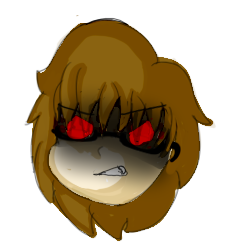 “…”
“…”
 “…”
“…”
Now, to give overwhelming proof of what I will say at the end of this appendix, therefore also the second part of this article …

Let’s talk about Dear Evan Hansen. Let’s enter the Arena Stage in Washington for a few minutes and see how the hell they treat characters, in general, how good conflicts are built both between characters and characters, and between CHARACTERS AND THE AUDIENCE . Thanks to the cases of Walter White and Tony Soprano we have understood well that to add layers of depth, the conflict between characters and audience is also very important. So, let’s start by analyzing one of the latest songs from the musical by Benj Pasek, Justin Paul and Steven Levenson.
“Good For You” is one of the songs that marks the greatest conflicts between Evan and many people in his life, including his mother. I will not talk about the verses of the other two boys (Jared and Alanna), given which are very connected to the plot of the musical and how they were “pulled” into Evan’s situation.
You have to know that in the musical, Evan is a boy who suffers from severe social anxiety. The song “Waving Through A Window” is the complete representation of his frustration and pain for this situation he is experiencing.

(Screenshot from Ben Platt’s performance at 2017 Tony Awards)
“I try to speak but nobody can hear
So I wait around for an answer to appear
While I’m watch, watch, watching people pass…
Waving through a window
Can anybody see?
Is anybody waving back at me?”
But in “Good For You” (spoiler) he has a conflict mainly with his mother, because for a series of events, Evan has found himself almost replacing her with another family and the woman is destroyed because she knows that at the level of comfort for Evan, that family is better than her but at the same time she is furious with her son over this replacement, working twice as hard to support him after Evan’s father leaves. I think these lines can sum up what Heidi Hansen felt:
Have you found a place where the grass is greener?
And you drop the fence to the other side?
Is it good?
Are they giving you a world I could never provide?
(…)
And you say what you need to say
So that you get to walk away
It would have killed you to have to stay trapped
When you’ve got something new
Well, I’m sorry I had it rough.
And I’m sorry I’m not enough …
Thank God, they rescued you!

(Scene before “Good For You” from… A bootleg. Yes, the life of theater kids is difficult.)
After all this pain thrown out by Heidi, even with a lot of passive-aggression (“It would have killed you to have to stay trapped – To live with me, I add – when you’ve got something new”, “Thank God, they rescued you! “) …

(“Thank God they rescued you!”)
Do you still want to remember Evan’s social anxiety? After this song and after what Evan does in the first act including lying to a family who lost a child, just to get closer to his crush …
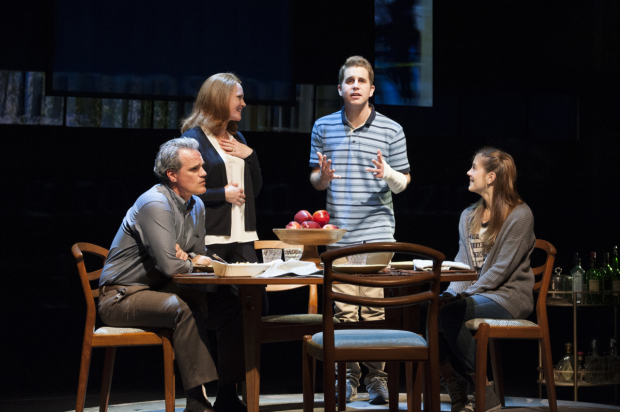
(Scene for the song “For Forever”)
Will you forgive him because… “Can anybody see, is anybody waving back at me?”

As noted above, Waving Through A Window in particular reflects how Evan feels about his social anxiety. He objectively suffers from it, so he has problems relating to people. Like all the characters we have described so far, Evan suffers from a bad situation of him.
But, in any case, he caused this.

… But the musical is keen to let us know that Heidi is wrong too. She also says phrases like “I’m doing my best!”, But with the constant teasing that he says to the Murphy family in anger, his excuses seem almost to be self-justifying in not understanding his son out of pride.
A few minutes earlier: “They’re not your family, Evan!” in a mocking tone.

A few minutes later: “You’re the only good thing that’s happened to me, Evan! I’m sorry I can’t give you more than that… Shit! ”

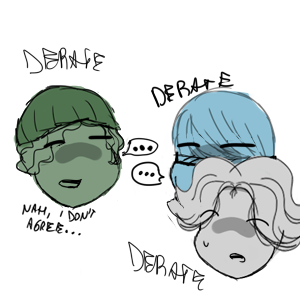
 “…”
“…”
Here. Do you understand what it means to have a conflict with dignity, even if with people who can also be born as “victimizable” to the maximum?
I have no idea who to “justify” either. They both have good reasons, but at the same time they have those elements why it cannot be said that they are in the wrong or in the total reason!
Do they both suffer? Absolutely. But both because of this they have never harmed anyone, because they “suffer” and “are good people”? Absolutely not. Both have harmed those around them and no one is spared.
Heidi shows what I consider a principle of hysteria which shows how problematic she is as a person without “sugaring” anything or making her obvious problems less visible . But also Evan shows once again how much he is a person who, if he finds a good opportunity, wants to make things turn around on his own account (a dialogue with Alanna proves this).
In fact, let’s see the comments under the song we mentioned …
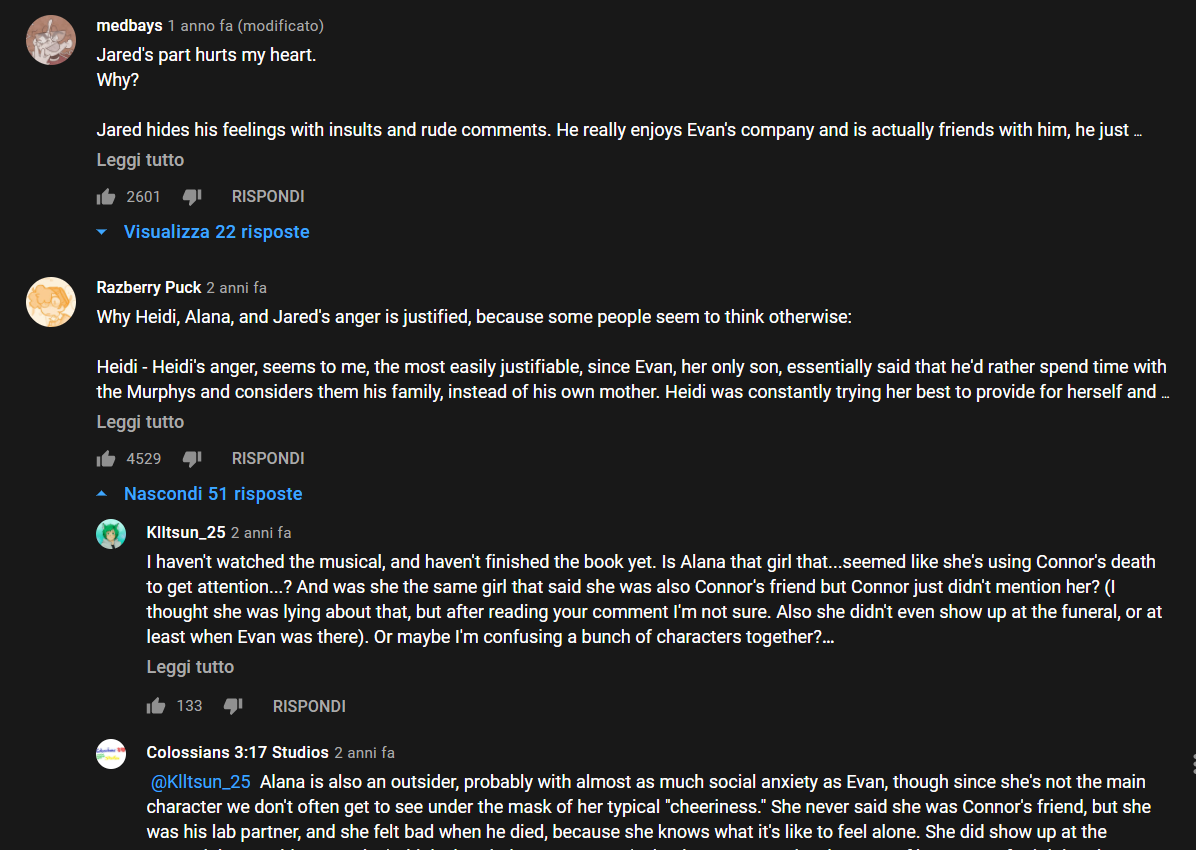
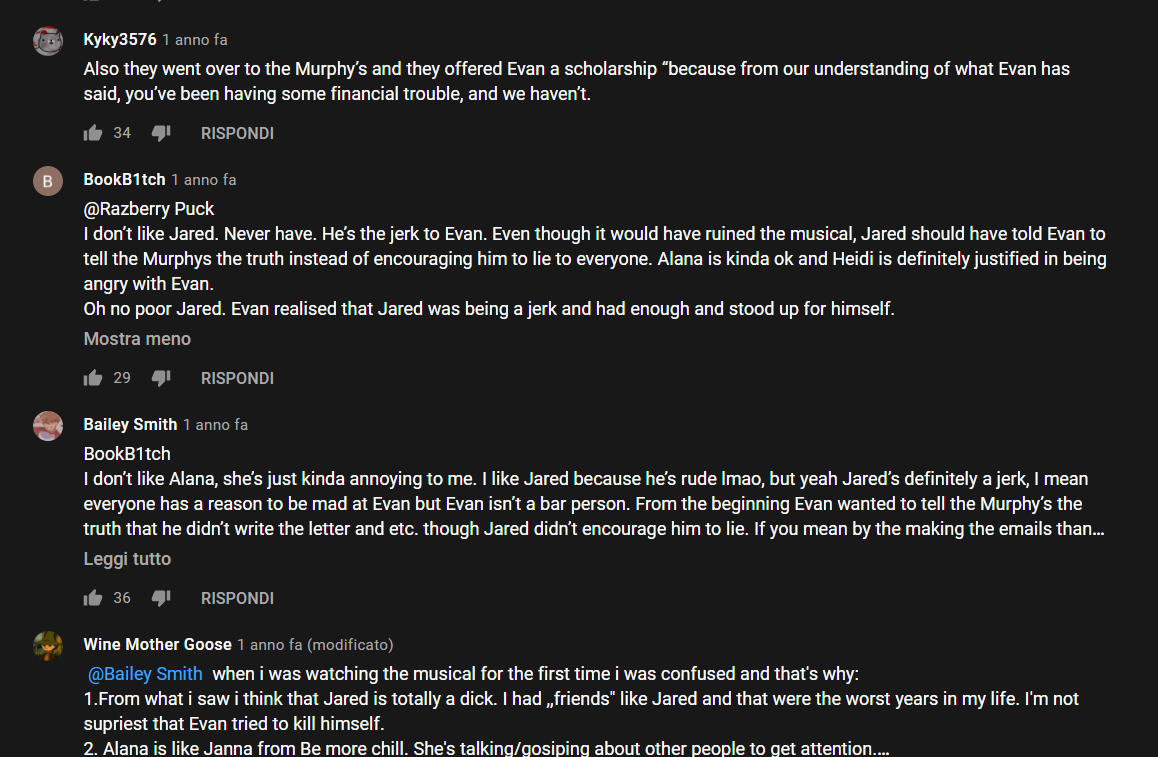
There is a real moral conflict, there is a writing of the characters that allows them to debate their ideas, because the work at this point did not expire in “this is right, this it’s wrong. ”
So, do you see what the conflict does?
Conflict gives GROWTH . To the characters, to those who talk about them “on the other side of the screen”. To all.
Evan and the DEH characters in general are still a source of debate… Because there are so many conflicts to start with! These are the types of works that, I can say even without knowing the musical in full, at least make you think, they make you talk about them in the good sense of the word! Therefore, the public automatically, if it reflects on the work, also reflects on itself, on its own morals …
So, back to Midnight Train… After seeing what’s fashionable in the already beautiful industries you form, with so many critics in tow; an industry that video games also aim to become … Can we really consider these types of stories well written, or at least of quality?
All that mass of manipulation, toxicity, ridiculousness … For what? What does the player have to put up with hours and hours of this bullshit for?

To see the characters, always with their beautiful faces, happy and content, without any awareness of what they did, what they said and what happened during the game. What kind of good ending is that?
For this reason I, perhaps interpreting the term on my own, I consider this as a real “toxic positivity”.
There hasn’t been a development, there has never been a COMPARISON with the outside world, there hasn’t been a real CONFLICT that made them change “from so to this”. Let’s stop fooling ourselves, these people are still the same shit ever . They cried a little more, but they were never questioned about their ideas, nor had real and interesting moments of confrontation with something different, or even something they cannot understand and / or completely excuse with little words from the shonen battle. poorest you can find on the anime market …
Just like all of us. Midnight Train is made like this because it is made by an originally passive spectator, who has reflected in her work everything she would like. Drama, cry a little … But no real conflict. No real challenges to face.
Children surrounded by wadding. As I said earlier.
I wanted to talk about this case because I believe it summarizes everything that has been said in this very heavy second point of the entire article. I thought it was a nice way to conclude this second point, also comparing a work that we theoretically “want it to become the new norm”, with what is now the norm. Even if, in the end, we return to the same concepts.
Indeed, I copy and paste these parts from a few paragraphs ago – I understand that in this long article we can get lost.
We don’t want to recognize ourselves in any problem that could affect us too closely. Because we; public, developers or anyone… We always want to feel understood. Always. This is why we like worlds where everyone is a victim, where everyone can be “settled” with two words of comfort.

We want someone or something who always understands our problems, even if in some cases there is nothing to understand. And we do this with the phrases “there will be a reason why he is doing this!”, Which actually translates to “there will be something that justifies these behaviors, because I cannot conceive that some impulses and jerks are in the human nature, which is not only complex when I want it, but is complex in any case, even with its inexplicable negativity “. 

In these kinds of works today, no one is actually a bad person. We hide with the excuse that “we all have weaknesses and facets” to hide the gooey goodness of people suffering only from external negative stimuli, who in reality never have any fault.


That is why any attempt at conflict is futile.
Because in the end we all have weaknesses, so we always deserve to be understood and we must never change.
 “… I think I’m done.”
“… I think I’m done.”
 “…”
“…”
 “…”
“…”
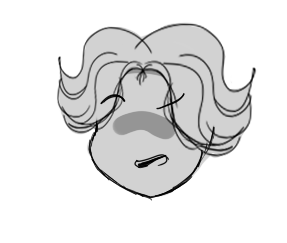 “So what?”
“So what?”
 “Like“ so what ”?”
“Like“ so what ”?”
 What harm is there if everyone is a good person in these works?
What harm is there if everyone is a good person in these works?
 “In the end it is fiction. We know how to discern reality and fiction, so we know perfectly well that not everyone is as good as in these works. We have only evolved, we no longer feel the need for what you consider … Conflict . ”
“In the end it is fiction. We know how to discern reality and fiction, so we know perfectly well that not everyone is as good as in these works. We have only evolved, we no longer feel the need for what you consider … Conflict . ”
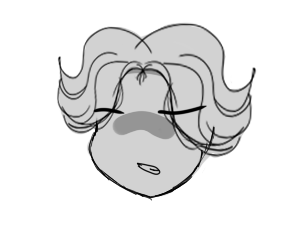 “You made the girl in yellow go away for what reason? She was right, you’re here and you talk a lot on a pedestal because you really just want to lecture us all about what’s right and what’s wrong! ”
“You made the girl in yellow go away for what reason? She was right, you’re here and you talk a lot on a pedestal because you really just want to lecture us all about what’s right and what’s wrong! ”
 “Why should what you call” comfort “hurt the work of fiction in general?”
“Why should what you call” comfort “hurt the work of fiction in general?”
 “Why … No message is said. This is becoming everything-”
“Why … No message is said. This is becoming everything-”
 “So? Amoral works have always existed. It’s pure” entertainment “, as you said so much for Mad Father. It’s like criticizing fairy tales for-”
“So? Amoral works have always existed. It’s pure” entertainment “, as you said so much for Mad Father. It’s like criticizing fairy tales for-”
 “Ah … Sure … Come and talk to me about fairy tales, love stories …”
“Ah … Sure … Come and talk to me about fairy tales, love stories …”
 “When here the issues that wanted to be treated, with authors who wanted to” enlighten “people with their intelligence and sensitivity … They are totally distorted …”
“When here the issues that wanted to be treated, with authors who wanted to” enlighten “people with their intelligence and sensitivity … They are totally distorted …”
 “Come and talk to me. I want to have a laugh.”
“Come and talk to me. I want to have a laugh.”
Part 3 – Ṭ̵̃h̸͕́e̷͚͋m̸̬̎a̴͂͜t̸͚̾i̷̩͆c̴̪̈́ ̸͗͜D̶̚͜i̶̢̿ś̸ͅt̷͍̉o̷̧̾r̵̘͑s̶̛͎i̷͉͌o̸̬͌n̸͍͋
Cloé’s Requiem: Con Amore – “It’s not me, it’s my curse”
So let’s start from case already analyzed in the second part of the article on Cloé’s Requiem – Cloé’s Requiem: Con Amore. A sort of extra version of the little-remembered Horror RPG. Both Con Amore and Cloé’s Requiem have been analyzed in the series of articles mentioned above.
In Chloé’s Requiem, Cloé’s father (the co-star) has sexually exploited her daughter since she was very young – about eight years old.
A person like this the viewer reduces, on a moral level, below a worm.

I’ll show you how it was treated in a … Extra version of Cloé’s Requiem – Cloé’s Requiem: Con Amore. This extra version was supposed, in theory, to make some plot elements clearer.
In the “game” (since it looks more like a poor quality visual novel) you see a “demonized” version of some people who died during the game, including that of the waitress Charlotte …

Perfect, Charlotte has become a total monster, covered in blood. Because she “is a curse”. This bloody girl you see on the cover is the “evil script” of the original one, something bad that can be defeated with love and holy water.
But there is a huge difference between Cloé’s Requiem and Cloé’s Requiem: Con Amore: in the original game the “curses” are not mere monsters to be defeated, but something much deeper. There are many interpretations to them.
(If you want to see a very long article on the characters of Cloé’s Requiem, it exists on this site).

So, let’s get back to us and how the curses are represented in “Con Amore” …

If this is an “evil double” of the delicious Charlotte …

“I’m afraid of losing Cloé, he seemed obsessed”
… Even Alain, the abusive father, developed an evil double before he died!
With “he” we obviously mean the so-called “curse”, which in Con Amore has become a supernatural being who seems to… take possession of people… and make them do bad things.

So, according to this logic, Alain is a good father who cared about his daughter.
So it wasn’t Alain who raped Cloé.
So Alain is a person to be pitied, even if in the original game he is always presented as a very ambiguous character in the way of expressing himself or, in any case, as a terrible figure.
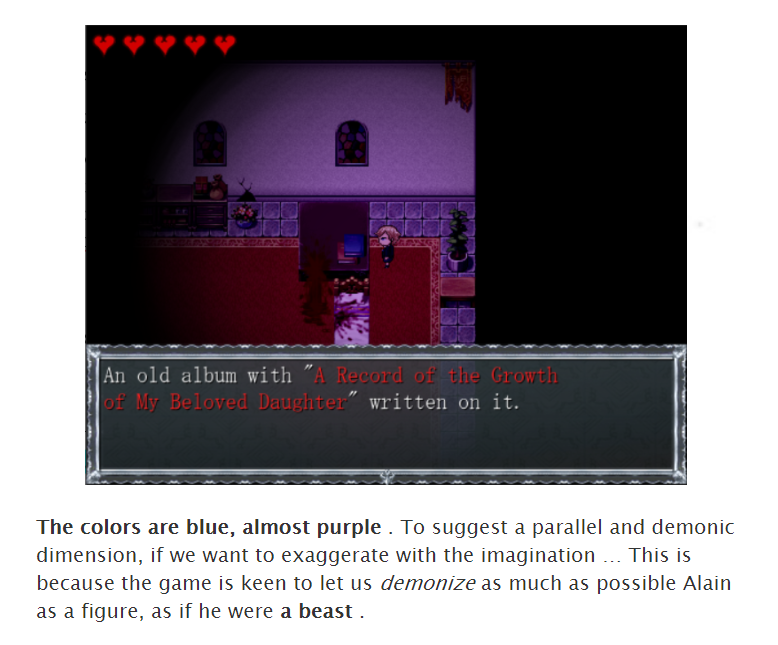
No, really, they have foisted on a curse a fault that can only and only belong to a particularly sick human being . Let us realize the gravity of the situation.


They made a rapist into a “man in pain” , and for this reason alone the plot element was invented for which Alain would try to cure Cloé, who is suddenly “sickly” (which NEVER mentioned in the original game, any harm he has in the game was solely his father’s fault).


“I’m afraid of losing Cloé, he seemed obsessed”
If we don’t count the various holes and inconsistencies with the original game 1 if you follow this narrative line that it looks more like a fanfiction than a real explanation of the curses, I ask you …
 “Guys, let’s face each other. Can’t you smell bullshit?”
“Guys, let’s face each other. Can’t you smell bullshit?”
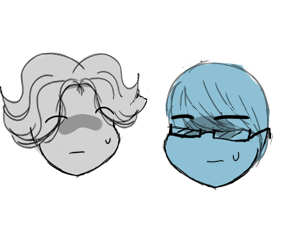 ” … ”
” … ”
Let’s finally go to the audience. How did the Japanese audience take this badly made visual novel?
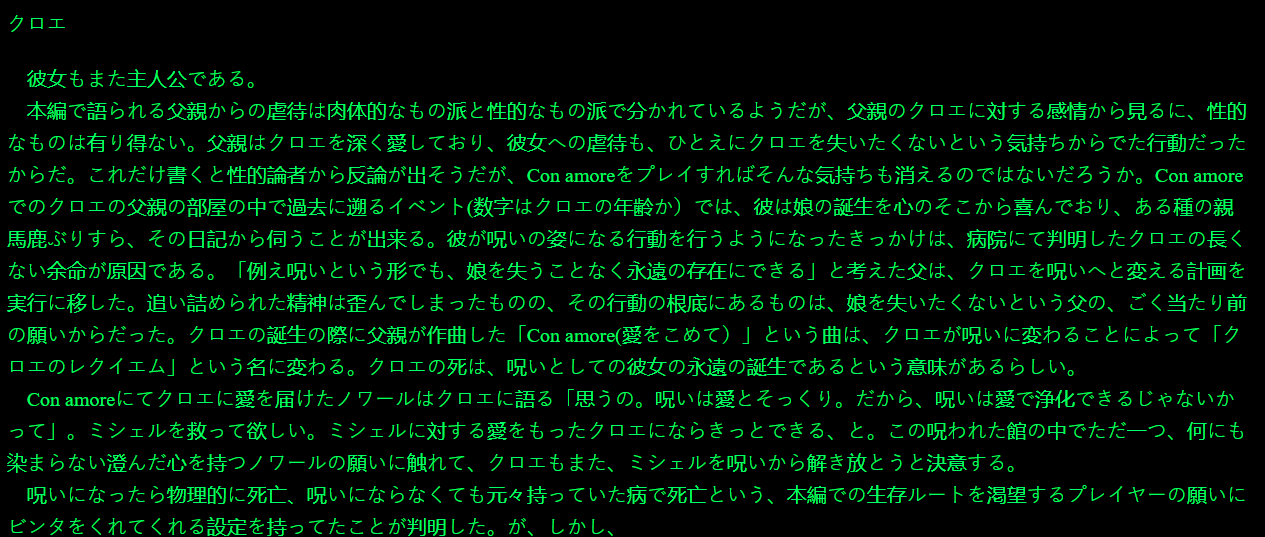


According to the audience, Cloé’s Requiem Con Amore served to deepen the characters of Cloé’s Requiem.

“I’m afraid of losing Cloé, he seemed obsessed”
And this certainly includes the case of Alain.
Let us realize. Having justifications for the actions of a pig who hides himself in the image of the distinguished man of the 19th century in recent years means “understanding his character more”. It makes it written better, you know.
… Are you kidding me?
NOW YOU UNDERSTAND WHAT I MEAN BY MY “BAD AND TRENDING” PHRASES TOWARDS NEIL AND THOSE OTHER ASSHOLES WE HAVE DEALT WITH SO FAR?
LET’S RECAP WHO IS … OR WHAT IS ALAIN.
Alain is represented as a monster who has ruined the life of an unstable wife and a daughter too small and fragile to stand against him, taking the latter as possession of her (if you remember certain phrases he has in the game). You cannot dispute me about this: Alain sucks, Alain is a person who cannot be pitied for any reason IN THE WORLD.
But the amount of crap he does as a person doesn’t make it badly written! he doesn’t make it sketchy in any way! He is a person, with his own sick inclinations, who has hurt people, who has traumatized them for life!
However, in any case …
A character we understand is a character that the public is not forced to redeem, but who remains from the complex and logical psychology in his actions.
This is a reasoning that can be applied to Alain: we do not redeem him for any reason, but we can basically understand that he is sick and this is perfectly reflected in his actions! This does not make him a sketchy character at all! , compared to this “twist” of shit for which “it was the curse to do everything”! (See note 1: “Plot holes…” – Further study)
Indeed, I tell you one thing.
The rightly monstrous characterization of Alain throughout the game was fundamental as a wrong example for Michel (given his inclinations to, just like Alain, disrespect for human life and possession), with disturbing parallels up to direct confrontation!
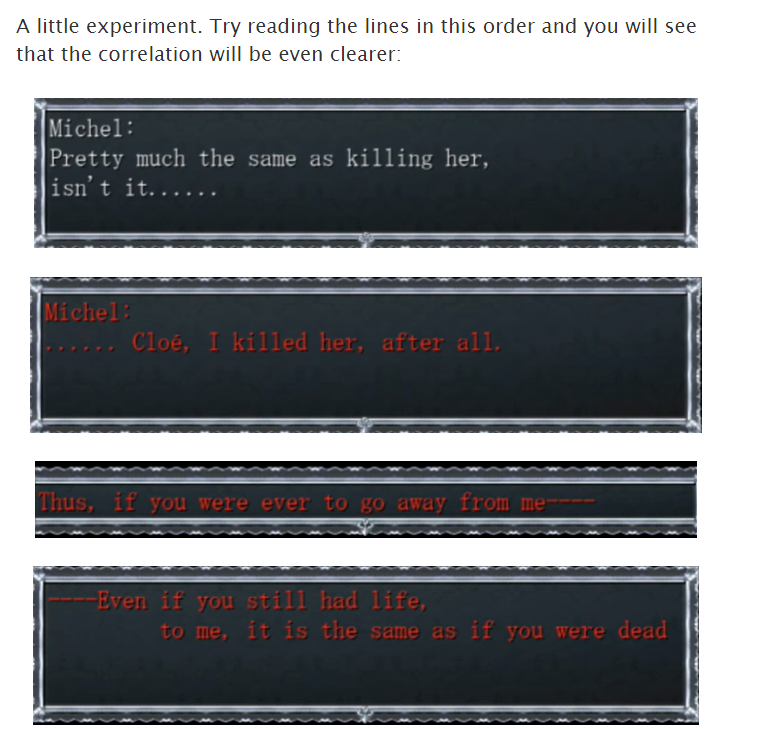
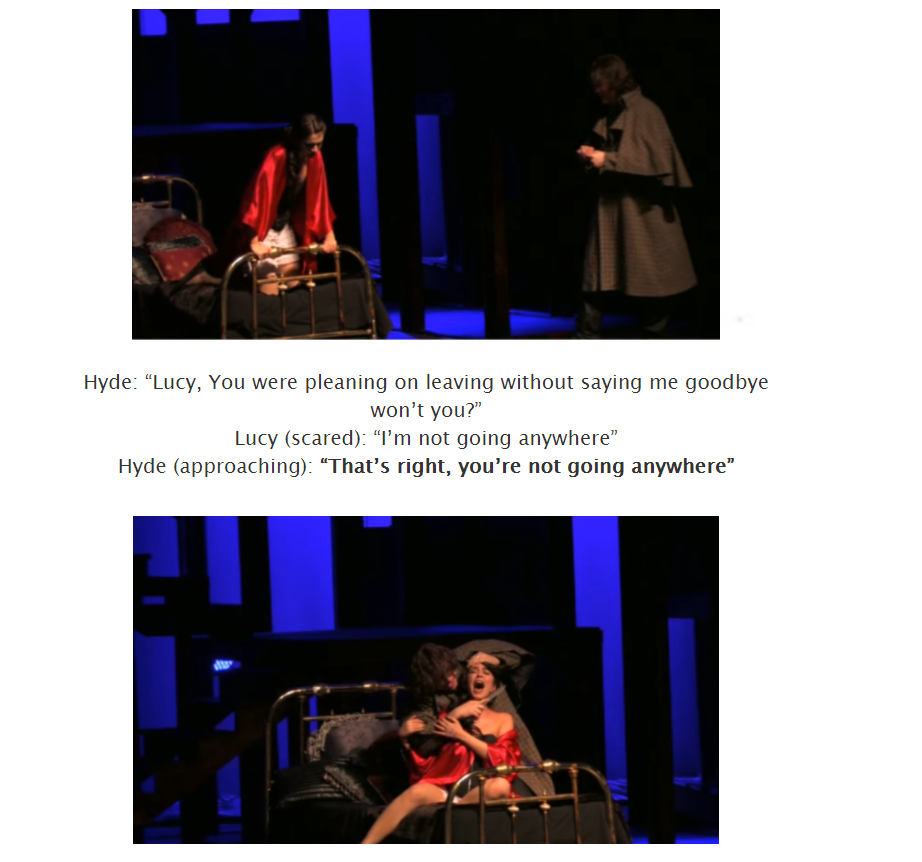
That’s what FUCK I mean by “theme distortion”!
He became a poor man consumed by a curse that came out of nowhere and tried to fight, poor thing … And so what Michel fights at the end of Cloé’s Requiem (not Con Amore) is … Dunno, yes, a final boss fight against a curse the final.
So Alain in Cloé’s Requiem loses any kind of depth because “every time it was the curse that spoke”.
Therefore, justifying Alain the issue of violence against minors in Cloé’s case is resolved with a “something external possessed him, it was not human man who did that violence”, therefore something as serious as RAPE. It’s distorted at the level of APOLOGY.
APOLOGY TO SOMETHING THAT STILL HAPPENS TODAY. ONE OF THE WORST TYPES OF PHYSICAL VIOLENCE.

“I’m afraid of losing Cloé, he seemed obsessed




“Group violence of a 15year old, shock phrase of the Piemonte mayor: “How we can define this? Kids being kids”.

“Rimini rape cases, three minors condamned at 9 years and eight months. The lawyers: ‘they feel guilty’ “


ALAIN LOVED CLOE’.
Omori – Depression: the new badge to stand out?

Literally, like I go to sleep at night after a day seeing all the internet elation about this game.
… It’s literally the part you’ve all been waiting for, huh?
Omori, the new pearl of the indie game … “The new Undertale”, they say …
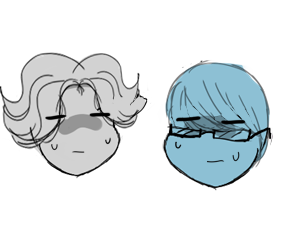 “…”
“…”
 “…”
“…”
I have… A premise for this game to be made. For a speech that we will carry on later. In this article or another, we would have liked to talk about this game from this point of view; or the one according to which we should reassess our maturity as a public, to properly judge the games to be rewarded and give any merit that exists or not.
And now you will discover the reason for this, among many, bad and “absolutist” phrase.
Since we will talk about it on the basis of the fact that it has distorted in a very serious way what it wanted to deal with, let’s first of all go to what makes the “themes” treated at a minimum of depth, not even to be defined as themes.
Because it is because of an initial superficiality , an initial distraction, a having taken things too lightly, or even a creative ingenuity at the base that led Omori even towards the offensive for what concerns the topic of depression .
But let’s go one step at a time. Why are the themes “non-thematic”?
There are various points we can go through, both in the so-called “dream world” and in the so-called “real world”.
Let’s start with something that can be refuted: realism.
The realism of this game has really put it under their feet, from two points of view.
Let’s start with the aesthetic aspect; something very minor.
From the world of dreams to the real world we should have some kind of difference. In the types of characters we meet, in the type of people we approach, even unknown ones, the colors, the atmospheres …


(Screenshot of Coraline, 2009 game taken from the film of the same name by LAIKA Studio)
In Omori, on the other hand, we have the same types of characters, colors and vibes as in the world of dreams. The latter is only put down in a more extravagant way: the whole game, however, has never made me detach from the idea of J-RPG with cute characters who fight for cheap jokes. Only the ages and the fact that the characters have black and non-colored lineart changes. This effect is given to me above all by the colors of the maps, which in Coraline we have seen completely changed from the imaginary world to the real world.


In addition to the fact that the direction, in any case, always remains the same; always with these more playful and / or almost “childish” tones and dialogues in the most everyday scenes, and he wakes up only when he has to present a dramatic scene.


In addition to the constant “wacky” characters (I take Maverick as the strongest example) both in character design and in personality … That in the world that should literally contrast with an imaginary world … They are just really bad and out of context.

Why does this become an aggravating circumstance?
In theory, the player is from the point of view of a “depressed” person. I don’t think it’s possible that the world around it is so colorful.

 “Sorry Ele, but all this talk of the context cannot help but make me think about how great potential would have been expressed if a more appropriate environment had been chosen.”
“Sorry Ele, but all this talk of the context cannot help but make me think about how great potential would have been expressed if a more appropriate environment had been chosen.”
Just imagine if, for example, an environment closer to a small town had been chosen instead of the village scattered around the world. Even a big city with its own rules, why not.
To begin with …
- The friendship between these children would have been better appreciated if placed in a ruthless context, such as the individualism that develops in a more urbanized geographical area ; moreover, places such as the playground, if compared with, for example, the smog of the city, would have had even more value.
- As we said before, in a city it is easier for parents to get lost in work and children to be neglected and for phenomena such as hikikomori to develop.
- Growth and the period closest to adolescence could have been faced in a real context of continuous confrontation between attachment to childhood and ‘approaching adulthood , in many teen dramas this is dealt with in schools, in the context of Omori the school could also play a marginal role but the point is that with continuous references to life that they would have pursued as adults a starting from the confrontation that can also take place in a school would have created very credible atmospheres of conflict.
Do you want an example of the above? Let’s take the same Aubrey we told you about earlier.
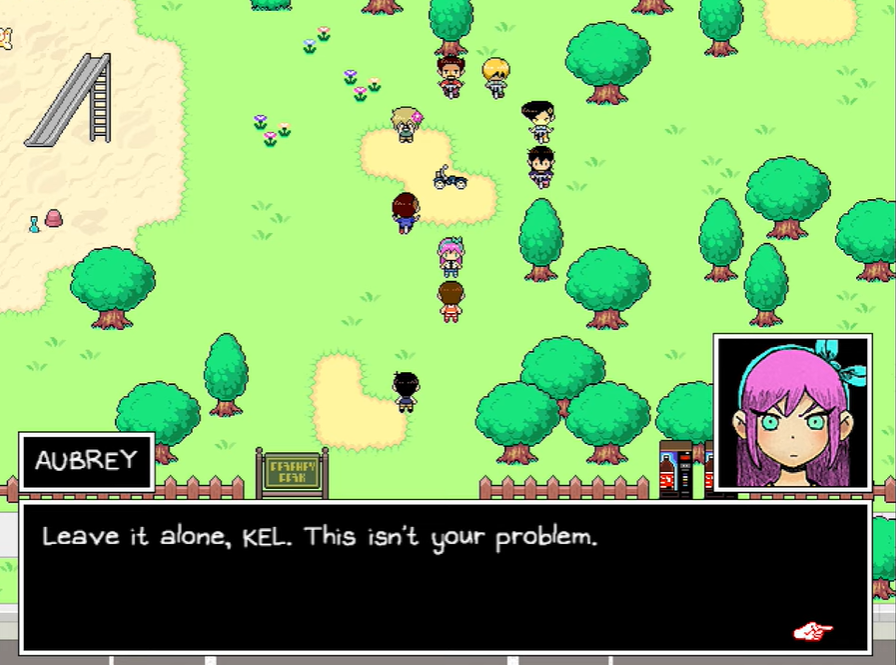
Here, let’s look at each other for a moment: why should the band follow Aubrey’s directions? What interest does the group have in stealing the album by photos of this poor guy? Normally a group of bullies or a gang can be “incited” with much more trivial and superficial comments.
Do you really want me to give you an example?
… “Does this guy really have flowers on his head? He must be one of those effemminate guys….”
“Ohh how cute he lets his friends defend him, see how he takes refuge!”
“This must definitely be gay” …
(…)
Do you want to use the photo album? Do you want to detach Aubrey from her past? Well, let’s suppose that to detach from her he decides to exploit these photos. For example, you can force Basil to do any “torture” or humiliation in public which if not performed involves the burning of one of the many photos present with a lighter to show its strength to the group ; to the point that when they return the photo / album “safe and sound” Basil himself will throw them in the garbage for the trauma they caused him.
But how could a scene like this, specifically, have worked beyond the more urban context? Here, try to remove for a moment the image of the delinquent and replace it with a sort of “evil extension” of what she was as a girl (that is, a little bit smirky and a little crafty who tried to be at the center of the attention of his group) … You ask me where this is headed, don’t you?
Well, I’m just trying to make you forget the “street thug” stereotype for a moment to get used to the “queen bee” stereotype in groups of teenagers.
I’m just telling you to try to visualize it in your head. The usual long hair, perhaps with a pair of hoop earrings, with a look that can come close to “shirt-shorts” or “shirt-miniskirt”.
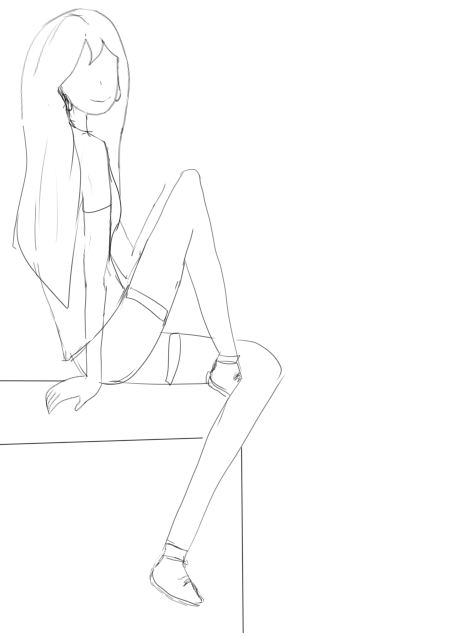
(I just made an incomplete sketch to give you an idea)
Before you send me any kind of insult for having “ruined” your favorite character I want to try to convince you of this narrative choice that I would have applied instead of Omocat … And to the list that I am about to represent I want you to accompany us this song in particular from the musical of Mean Girls based on the film of the same name.
Feel the explosiveness in the melody and the lyrics! Here, now let’s go back to the logic and explain why on the narrative level it would have worked much more.
- This growth path of hers would have been more in-character. Because as a child she always showed herself on the front line, with cute little eyes, a sly smile and her headband.
- A much more interesting character who could bring to life loud and disturbing scenes (here, imagine what I told you earlier about bullying poor Basil). She could create a sea of conflicts that would make the plot much more interesting ! Let’s see just a few examples…
- To begin with, she would have clashed in a much more natural and dramatic way with the other members of the group of her “former friends” and would have pushed them to question themselves by being able to intervene on the weaknesses she saw in them starting from how she remembered them. as children, to give an example to intervene on the state of Kel, in a certain sense always second to Hero as she “was always second to Mari” if we want to see it in terms of a context full of ” social competition “. In fact, she would have even made more sense about depression than Hero himself! That is: the construction of a social image with which (and against which) to fight , Aubrey in this sense would have been that active character that embodied in itself this theme.
- she would have been an excellent mirror-character for the figure of the “little saint-schoolgirl” Mari proposing an example of “toxic femininity” if we want to call her that; but not only this. It would have represented even more the divider that has been placed between childhood and adolescence since the girl died, since Mari would have almost represented in this case the death of innocence itself when compared to a character who is for real much more sneaky and mischievous.
- She would also have been an excellent mirror-character for Sunny’s “repressive” character (and Basil too, if desired) for the search / non-search for her own role in the world. on the other, aggression. Violence towards oneself, violence towards others. Wait, obviously with violence towards others I mean it in the most subtle sense of the term: that is, continually pushing people to self-hate. Do you say that you play this role of opposition even in the context of a criminal? I would say not really, it is not that he has to continually show a certain facade to build the approval of a social group (here also to return to the examples of characters like Pierre), so in this version does not have a “hard social role to build “. Her “her minions” respect her as she is because they approve of her ideologies that she developed all by herself in her period of crisis. She is not in those situations where he has to prove something to someone.
- She Could have represented , in Sunny’s distorted vision of dreams, Sweetheart with a perfect cadence, creating a connection between the world of dreams and the real world.
Here, and with that, you have come up with a beautiful and potential work to develop in which we have both the fights and nostalgia of an exploratory J-RPG in the world of dreams, and a complex plot in the real world, full of material to be able to develop in the dramatic tones that are most preferred to speak, in the most general way, of the harsh issues of youth growth today in the new increasingly individualistic and increasingly urbanized context (ah, and in all this it would not be I missed the fucking narrative gimmick of Mari’s murder / false suicide, or if there had been there would have been much more basic narrative material to contextualize it).
 “All very nice Pao, now you can stop dreaming.”
“All very nice Pao, now you can stop dreaming.”
 “Damn, but I can’t ignore that here we wanted to tell a dramatic story with characteristics very close to the teen-drama genre, therefore the remote country as it may be more familiar in terms of nostalgia in style. … An emeritus has nothing to do with the issues they wanted to tackle, come on! ”
“Damn, but I can’t ignore that here we wanted to tell a dramatic story with characteristics very close to the teen-drama genre, therefore the remote country as it may be more familiar in terms of nostalgia in style. … An emeritus has nothing to do with the issues they wanted to tackle, come on! ”
 “But that’s what I’ve said so far too! But unfortunately this is the harsh reality, resign yourself!”
“But that’s what I’ve said so far too! But unfortunately this is the harsh reality, resign yourself!”
Here, speaking of reality. As Pao also said before with his cabbage-anxiety-lists, to give us a nice contrast between what is considered “the hard and effective reality” against what is the imaginary world in the protagonist’s head, you have to change the air, you have to change music, you have to change something and make reality interesting with events, given that you move to the mentality that the player, after being in a fantasy world, “must put his feet on the ground” to understand real human actions and problems.
In this way, if we see both worlds as beautiful, cheerful and with beautiful saturated colors … There is not even a real contrast. Real and imaginary world become the same.
And then, going to something more thorny, that he has to do with what he wants … In fact, he pretends to deal with Omori.
This lack of differences between the imaginary world and the real world is not only from a stylistic point of view, oh no.
As “lack of realism” in fact I meant precisely from the point of view of events. I could give too many examples, but I will consider the simplest: the total lack of some kind of therapist and the mother never received in 4 years in which the protagonist was locked in the house because of a so-called “depression” (which, as we will see later, is in reality only a great sense of guilt, not associated with chronic depression in any way).
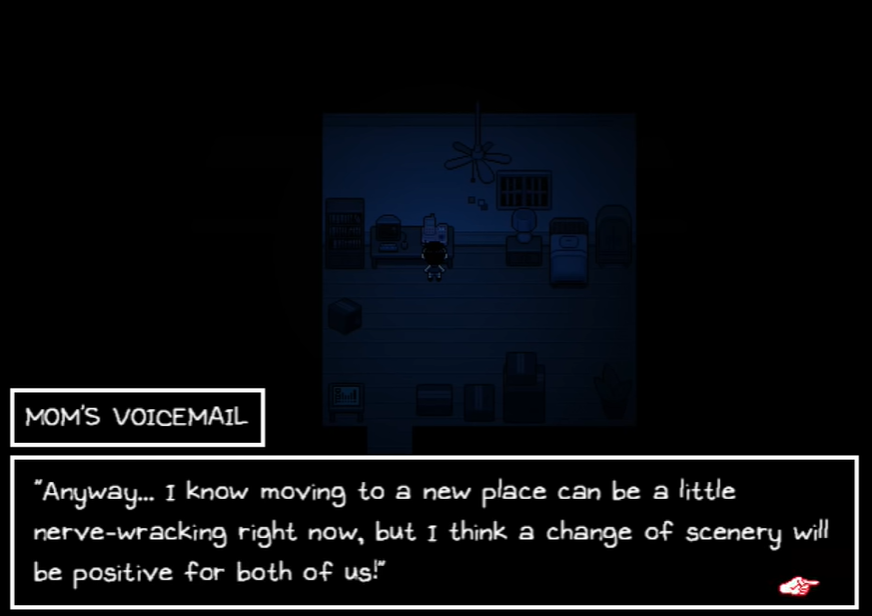
According to the game itself, this woman lost a daughter a few years earlier to DEPRESSION.
With what courage has this horrible mother never called ANYONE for the case of this poor boy who for four years found himself fighting her inner demons COMPLETELY ALONE ?!
This is a very serious thing to omit. It means that in Sunny’s life (the canonical name of the protagonist) there can be parental denial, if after the first month of isolation he has not been brought to therapy and even quickly (no, I don’t take into consideration the fact that they were about to move: at least the first treatments I think can be done in a more timely manner), or …
Yes, they didn’t want to introduce “too realistic” elements into a game that wanted to have a completely different kind of aestethic.
But for a game that …

![]()
![]()
And, therefore, who wanted to deal seriously with this issue, this is one of those things that makes me understand very well that you have not even thought about what it entails to put certain plot elements in your story, like a 4-year isolation.
 “There is something you missed.”
“There is something you missed.”
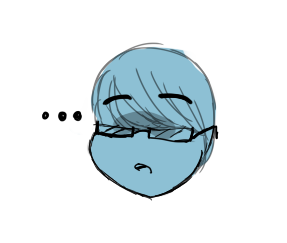 Sure, the game is about depression. But in any case, this is simply a story about friendship. What is striking is the suggestiveness with which all the themes have been treated, it is the direction and the staging that make a good effect.
Sure, the game is about depression. But in any case, this is simply a story about friendship. What is striking is the suggestiveness with which all the themes have been treated, it is the direction and the staging that make a good effect.
 “… Ah, let’s talk about directing now.”
“… Ah, let’s talk about directing now.”
Except for the fact that I could make a nice long speech about how this as a story about friendship is not worth a penny because of sketchy characters and relationships that are too superficial to be considered lasting for a lifetime …
But it must be said that the boy with the glasses … He’s right.
The direction in Omori is suggestive, indeed. This is very true.
(Parenthesis, the second scene I show is a gigantic SPOILER for Omori!)

Personally, the scene where Omori swims in the sea and in the meantime we have visions of Mari’s failure, which shows her forgiveness (here one can also ask if that is just a vision of Sunny to get her conscience right, or if would have really personato) … Really, no “but”, it’s really nice. From the music, to the interaction with the player because he himself swims to reach Mari in what looks like an infinite ocean, so you get lost until you find what can be “a foothold” given by the presence of a person like Mari.
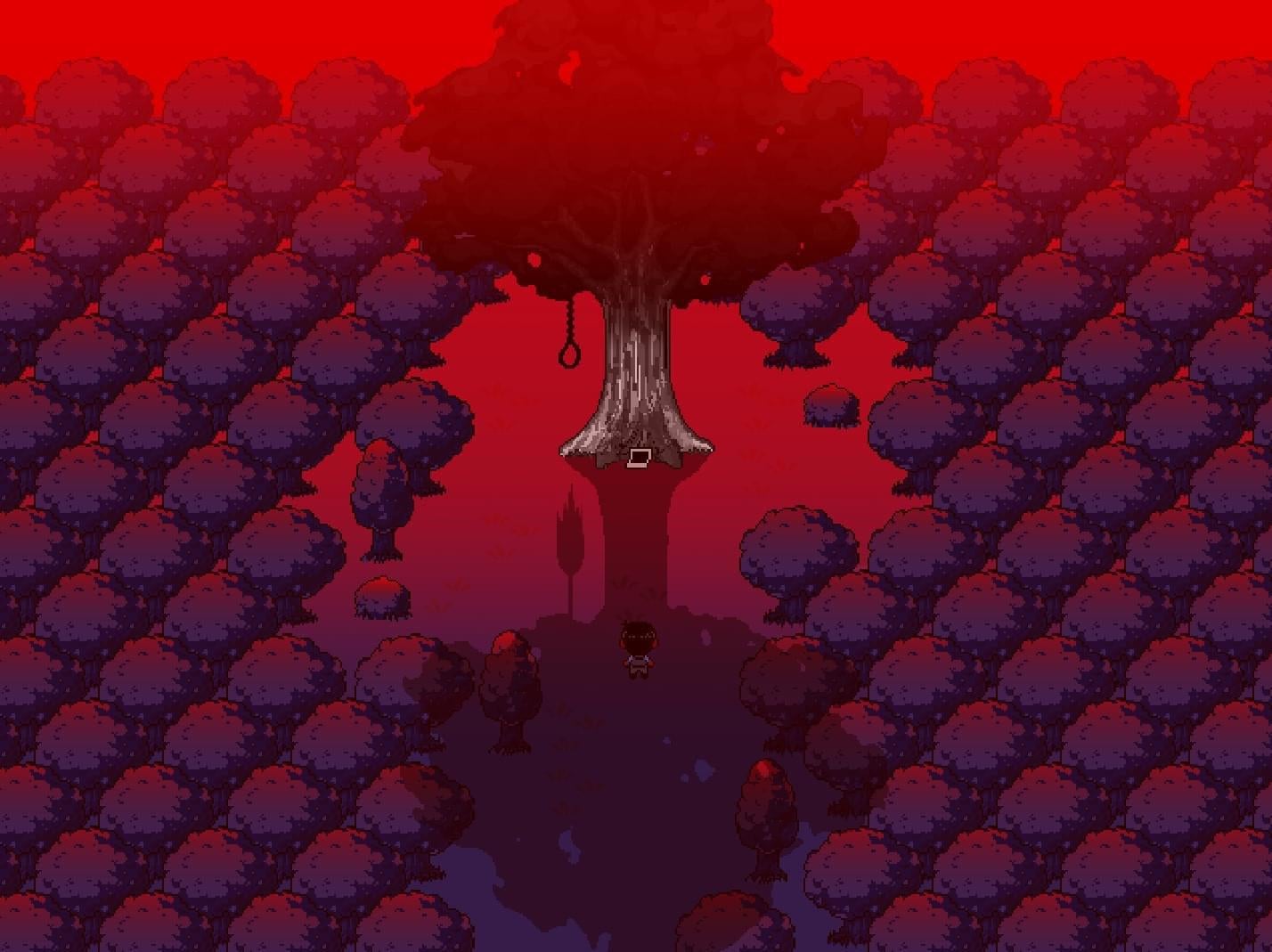
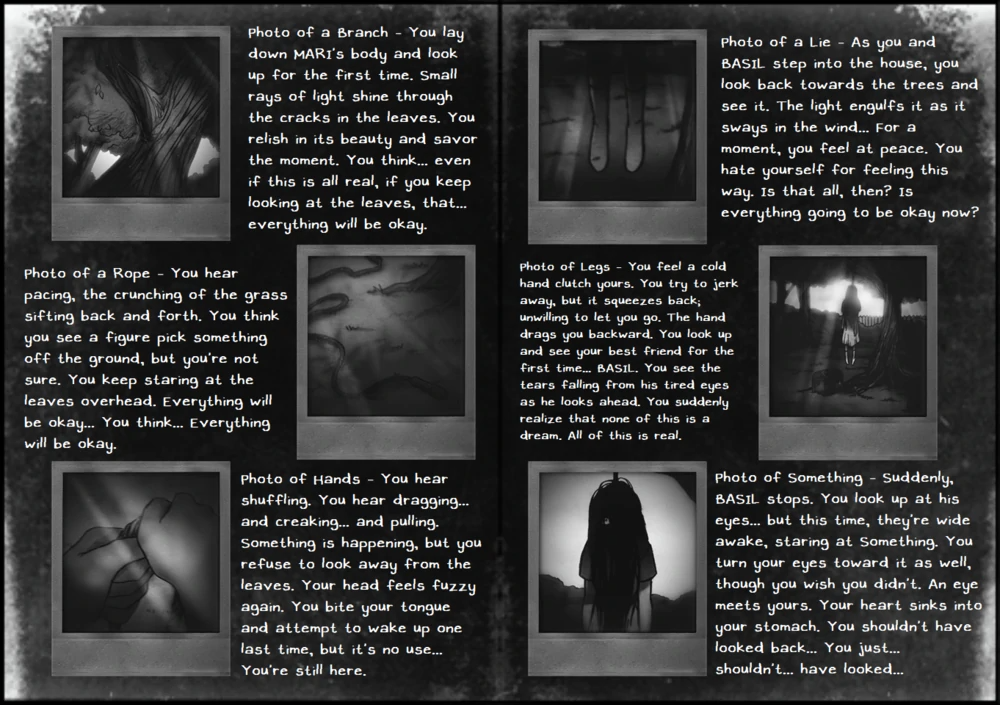
Then, the scene of the discovery of the murder through the photos is very beautiful to see in general: even if the gimmick of the photos is done purely for aestethic and … I do not find the reason for its existence, due to the management of the single images to let us discover the crime gradually, I understand that in terms of images in succession to the game, those who have the experience worked on it . The crime is not blasted in your face with some useless flashback but through something more subtle … Although, I repeat, I do not really understand the gimmick.
But what doesn’t make me praise it at all is another problem … Iconography.
By iconography we mean practically the symbols that are used in the game to say certain messages or for any other reason. In general, how do you try to enrich what is a direction that after all is also good. From this point of view, that of symbols, the game was very lazy.
The only thing that was interesting in terms of symbolism and that was used as the main way to do some kind of eye-catching marketing for this game was White Space.

The title screen, the logo, the very first scene… They all make us think that we will have to deal with this so-called white space, very isolated and that at times reminded me of the first chapter of Hello Charlotte, another Horror RPG.

… And also OFF by Mortis Ghost …
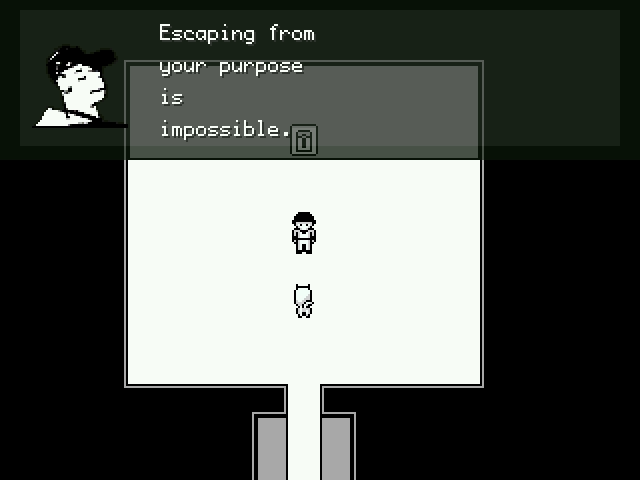
But I tell you, this could have been the only way a little more suggestive to treat “depression”, “anxiety” and all these beautiful terms. If you really wanted to focus on a “unconventional”, or whatever, White Space was perfect for an isolating atmosphere that could reflect more individuality in general.
Too bad that this one particular place in the game appears very little , compared to the screentime it deserves for how much it has been pushed into the barbine marketing operations made for this game!
Furthermore, White Space, in its few (yes, I consider them very few compared to the amount of time we have to be in quite different places, much less inspired) is the only place where you try to create some kind interesting atmosphere, which could have given the game points.
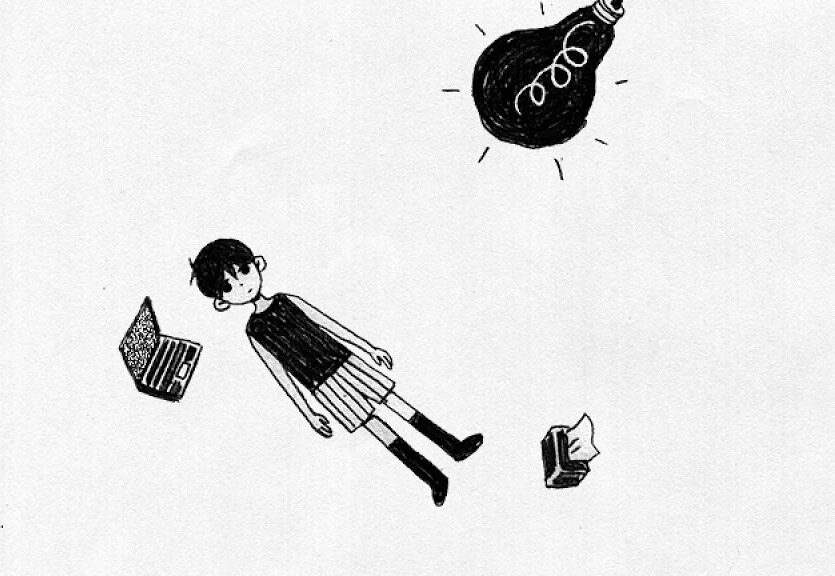

And even if the “Black Space” is a gigantic bullshit made for a “grand finale” …
In these parts we could use the logic we used in the Pocket Mirror article in Back To The Future:
“It doesn’t mean shit, but it’s cool!”
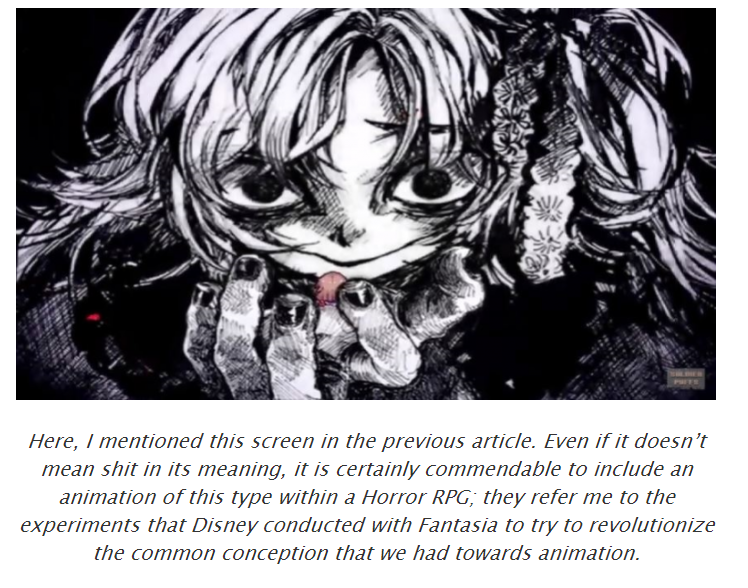
But my God, Pocket Mirror was really over the top! So over the top that you could even fool yourself in the slightest that it was a game meant to be weird intentionally, even though it had its own gigantic problem of all-too-linear progression, which we’ll talk about later for this game as well.
I don’t like that game as I don’t like Omori, but I saw some “creative sneezing” (yes, I call those flashes of creativity without context), I saw something that at first friction could enchant me.
I much prefer something really over-the-top, compared to something that claims to be a “delicate” product with beautiful and inspired scenes, but which at the same time also wants to be the most “by the book ”ever!


(Helping random people, useless dialogue … I say this as a J-RPG fan, for those who feel hipster to say that they “appreciated the amount of text in the game, which many players can define as boring” … I think Any lover of heavily narrative J-RPGs should feel special, according to your logic.)
These two registers also don’t really mix together . Omori follows the rule that “oh, a story arc is over … Ok, you have to go back to the real world”, without actually THINKING to give a real trigger to this awakening and we go back to the real world because the goddess Omocat wanted it so. We don’t have a build-up, we don’t have a reason. Let’s go back to the real world because we have to change from J-RPG to DRAMAA. We switch to horror because we want to do psychological horror now , with disturbing scenes, monsters and dark colors!

& nbsp;
And here we get to the heart of the problem. To the demonstrations of why the iconography that is used in Omori to treat depression fails on all fronts.
The scenes that wanted to be “beautiful”, horror or so on and so forth … I have seen them acclaimed as masterpieces, but if you have played at least one other Horror RPG in your existence you can recognize all the symbols used by Omori in their own “suggestive” scenes.
I’ll just give you a few examples, and then get to one that connects with the main discourse.

-Eyes. I’ll put the case of Fausts Alptraum, but it’s almost sickening how much “eyes” as a symbol have ALWAYS been used in horror fiction.
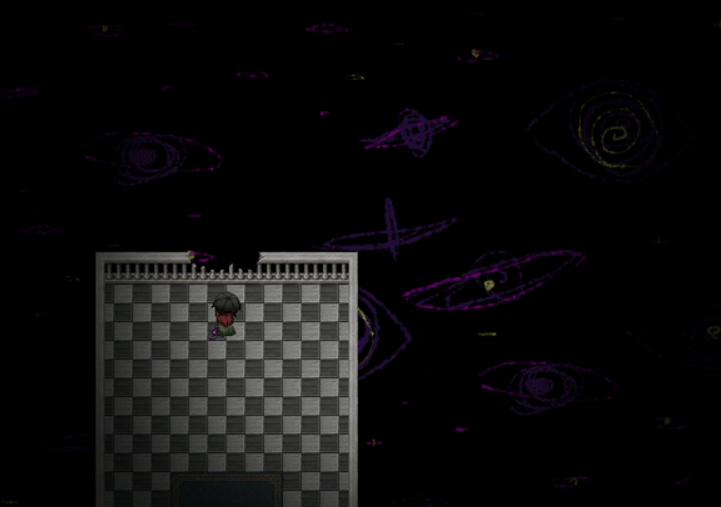
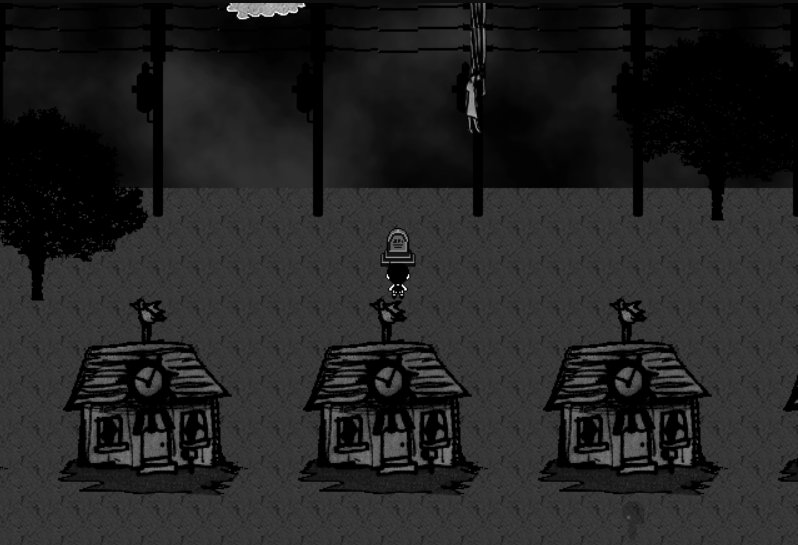
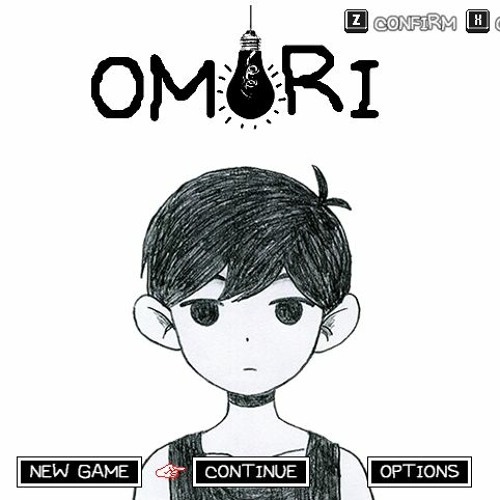
-Use of hand sketches, usually for own maps.
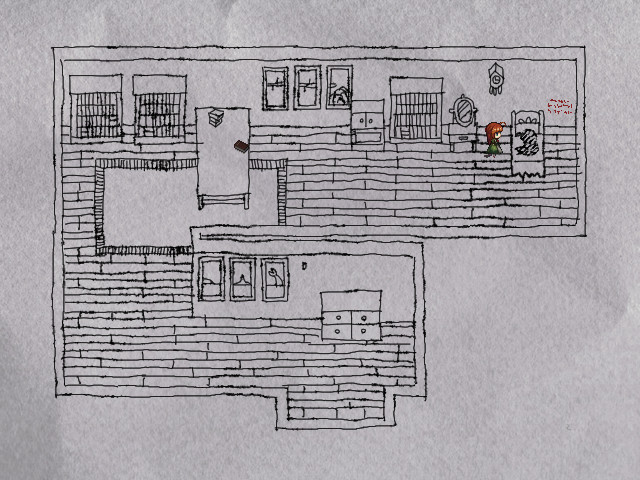
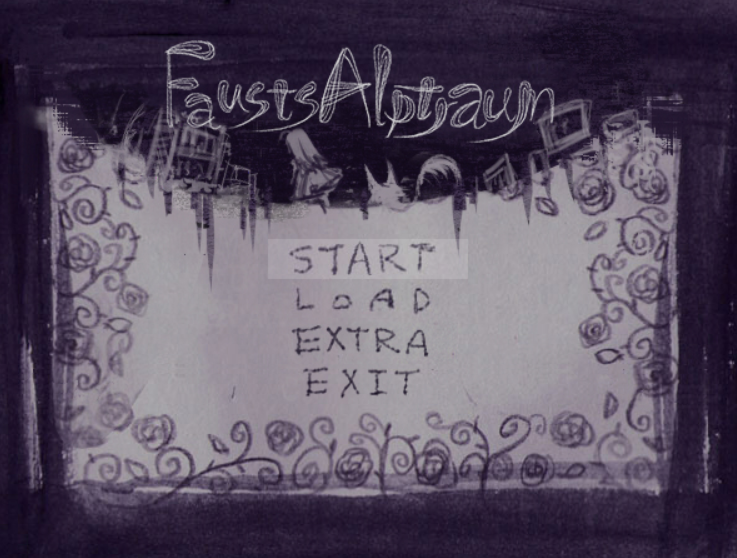
(Fausts Alptraum)
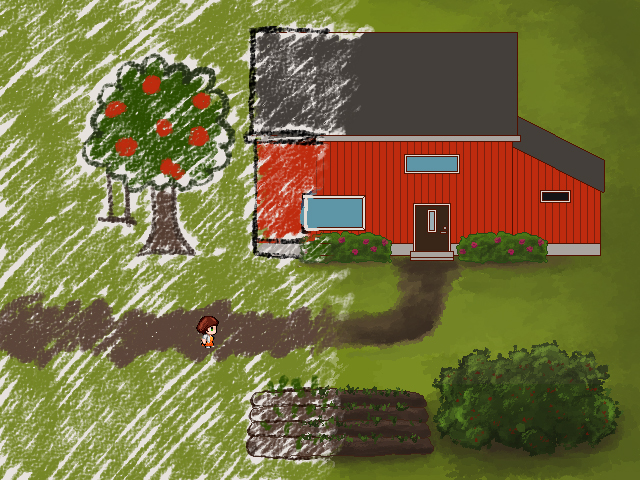 (Imaginary Friends)
(Imaginary Friends)
 (Ib)
(Ib)
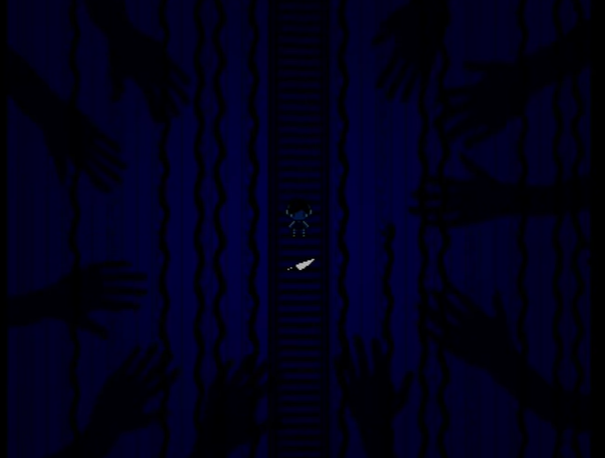
-Hands
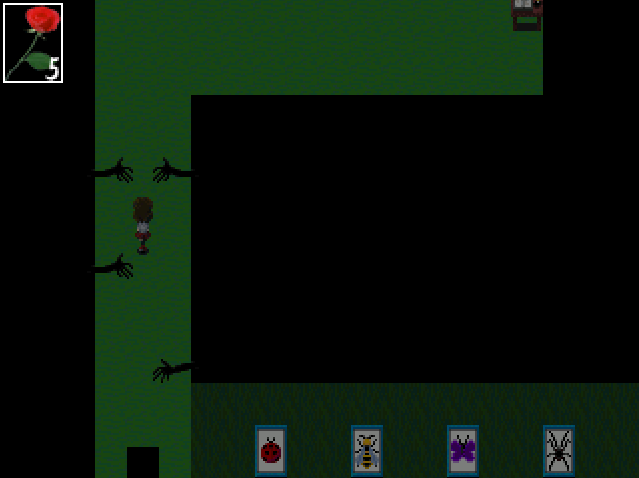

(Ib, Yume Nikki)
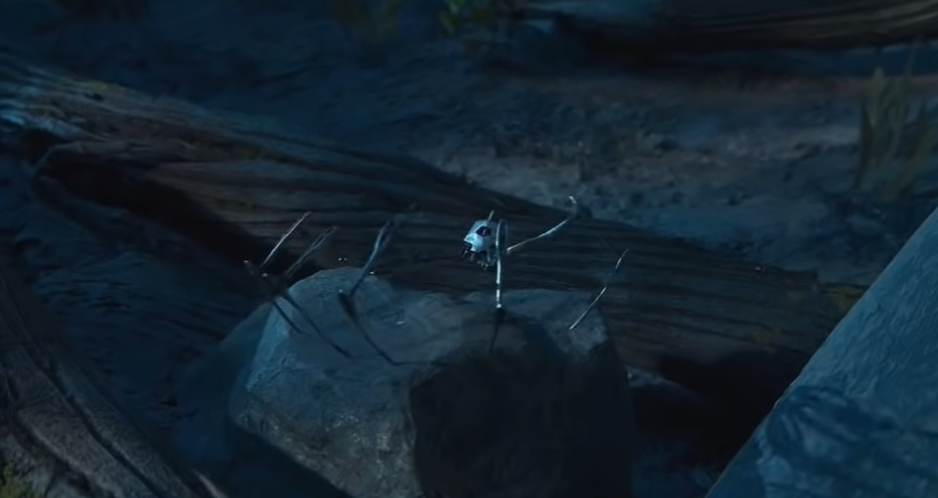
Ah, sorry. I re-watched Coraline recently and this screenshot of the other Mother’s hand has stayed on my computer.
No, actually I want to construct another discourse starting from the Hand of the Other Mother , or more generally what the “hand” can symbolize in the work of fiction. And this is to better explain why Omori’s iconography is really lazy.
We have seen this gimmick in about 2 different games and a movie. Tell me, was this hand symbol used with the same intentions as Omori had? To represent fear, something much more internal and psychologized?
No. The hand as a symbol is used to indicate danger, in general . We have seen this in the case of Ib and in the case of something that comes from a totally different medium: a movie. It is at work to give the single “hand” we are talking about a nice context that can hold it, but the symbolism of the hand is clear: it indicates in a very general way a danger or a simple threat.
I also mentioned Yume Nikki in this speech because Yume Nikki, believe it or not, in its initial intentions had no pretense of narrative, so even here the hands are purely for aestethic horror, so they are something external here too, no matter how much you are. imaginative with theories!
(No, I will not consider a theory that the hands are almost an “invitation to take the knife.” For that, I think the shining blade is already doing her job.)
So the hand as a danger from the point of view of the symbol, if not used in the correct way, if you don’t build a good speech around this symbol and throw it like this … It becomes interchangeable with anything else that indicates “danger” in general.


In fact in this scene they are shamelessly replaced with… Wires?
So do these really seem like creative ways to deal with what is called “depression” or simply treat fear or guilt in an original way?
 “Even if he is not the most creative, he has his own context, that of phobia. The fear is felt, the hands can be something that ‘pulls back’ Sunny from going down the stairs .. . ”
“Even if he is not the most creative, he has his own context, that of phobia. The fear is felt, the hands can be something that ‘pulls back’ Sunny from going down the stairs .. . ”
 “The last sentence you said might be true, but …”
“The last sentence you said might be true, but …”
Much more effective methods have been used to represent other problems.
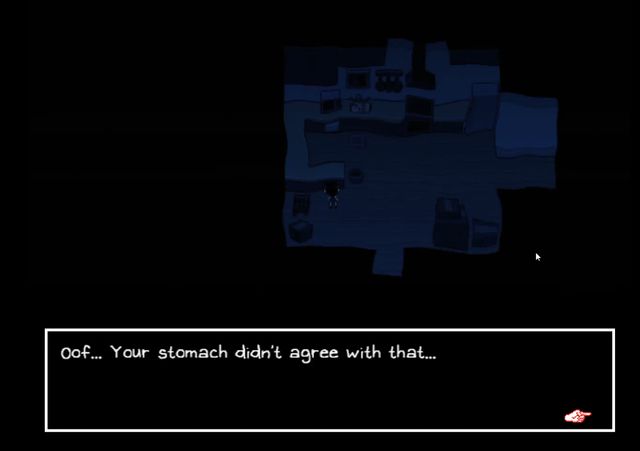
Or, again speaking of stairs, the fact that these are very long was much more exaggerated. You could point the representation of the phobia on the fact that, since Mari died right on those stairs so they remind Sunny of her trauma, the stairs seem endless!
In short, to represent the phobia as what it is : a distortion of reality on our part, which makes us reluctant to face certain types of things, which we see larger and more frightening than they are. They did it while they represented a useless stomach ache: that effect on the screen gives me the idea of nausea … Why not do it with what the game is really about?
Since you are more likeable than all the others, boy in celestial, I will leave you another example of useless symbology in Omori. This way we will understand the problem more easily.
Again to compare Coraline and Omori, let’s study them from the point of view of another symbol.
The spider.
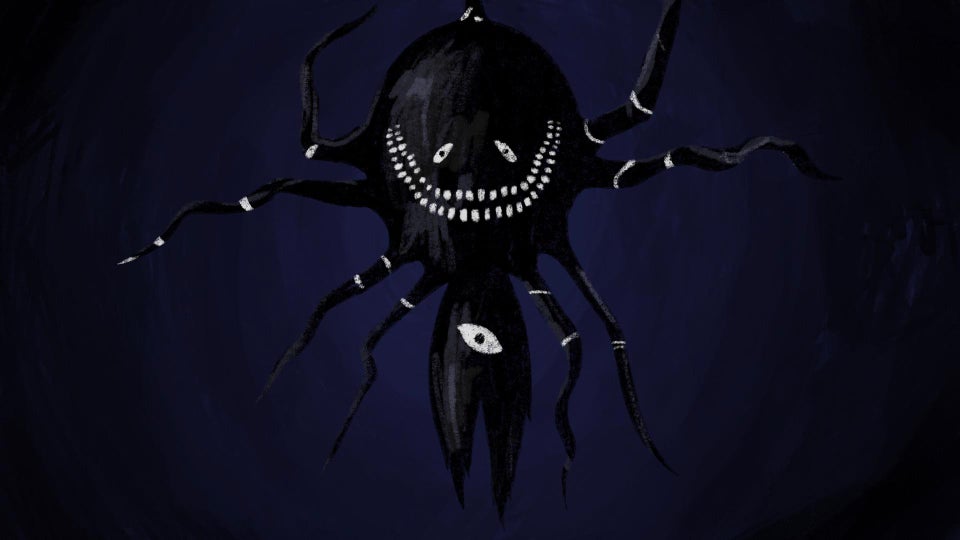
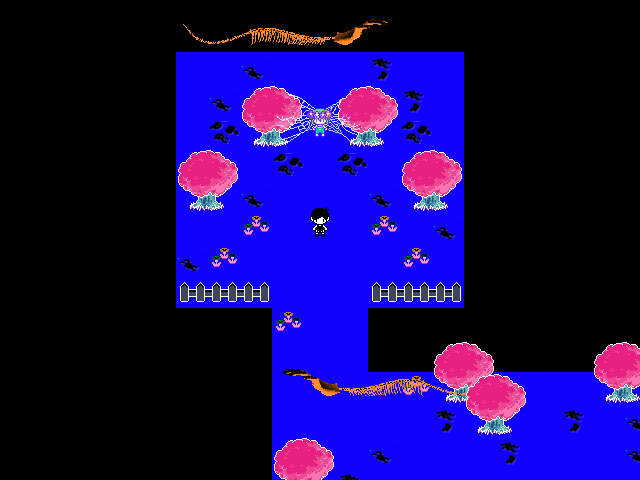
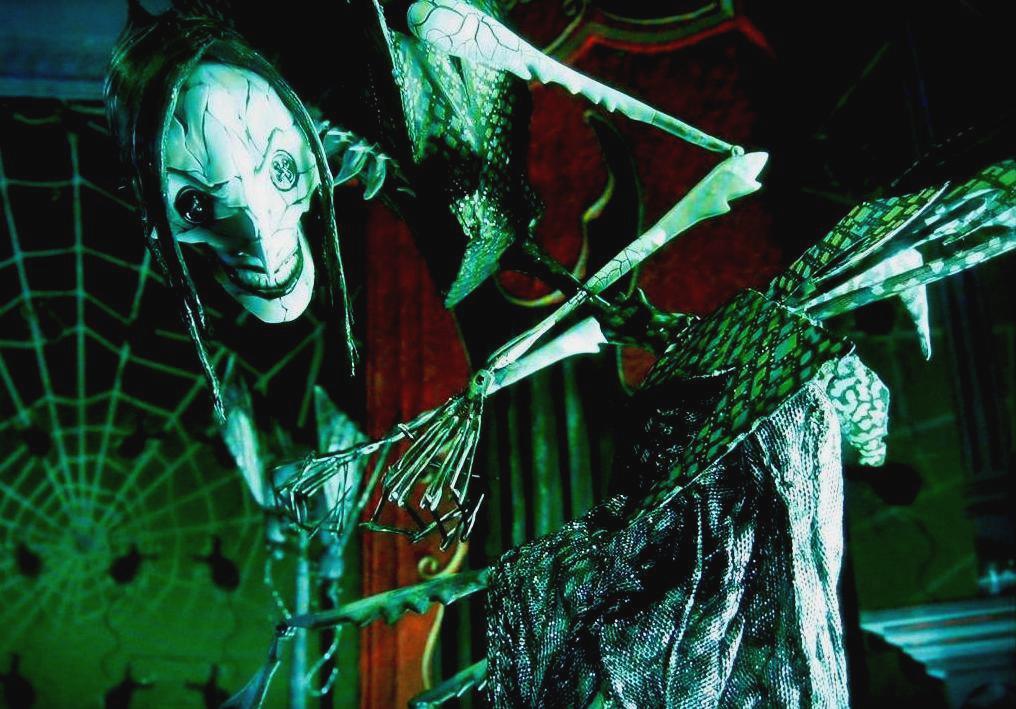
In Coraline, the spider is used to represent the other mother in general , but what connects this character with what a spider can symbolize is the concept of deception. The Other Mother tricks children into her attraction trap, from sweets to fun events, as do spiders with their prey when luring them into their web. This comes from a desire for survival on the part of both: in the spider the food, in the Other Mother … It can be the affection of a child or simple souls to eat on his part too .. So from this concept general, the whole character has been constructed , starting precisely from the role of deceiver she has in the plot: therefore in the film in its “true form” or final form it becomes the very concept it symbolizes.
In Omori … Well, there is not the same kind of depth and / or study that can be done on the symbol.
Although that of spiders is the most classic of fears, so it could not be omitted … Because there is an entire game area dedicated to spiders, a representation of the sense of guilt (so-called “SOMETHING”) that takes the form of a spider? One scene also shows the downstairs of Sunny’s house full of spiders!
I mean … Sunny is not a deceiver , she is just a kid who has done a big fuck for which she also feels guilty; Mari never sees herself connected with the concept of the “spider” because she is too holy to be connected with something like a spider …
So what do you want to tell me with the spider symbol, Omocat ?!
Do not make useless theories, for this game of theories I really have enough.
NOTHING . Omocat with the spider symbol does not want to tell us NOTHING !
Just like the stairs: Omocat with those hands doesn’t want to say NOTHING!
She used a good effect for a useless STOMACH PAIN, but for the truly horror phases of the game she pretty much used this logic:
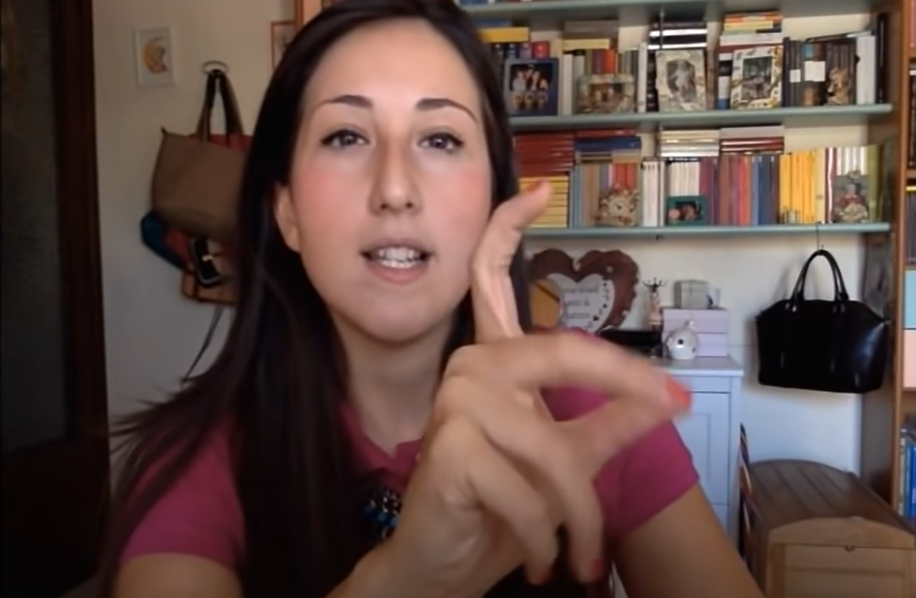
“Hmm, this symbol looks quite sinister to me! It’s a lot of horror, let’s put it! “
-Ilenia Zodiaco, #LibroDiMelma – “Shatter Me”



In fact, the same generic symbols that we find in Omori Omocat also represent them in a very simple “horror brainstorming”.
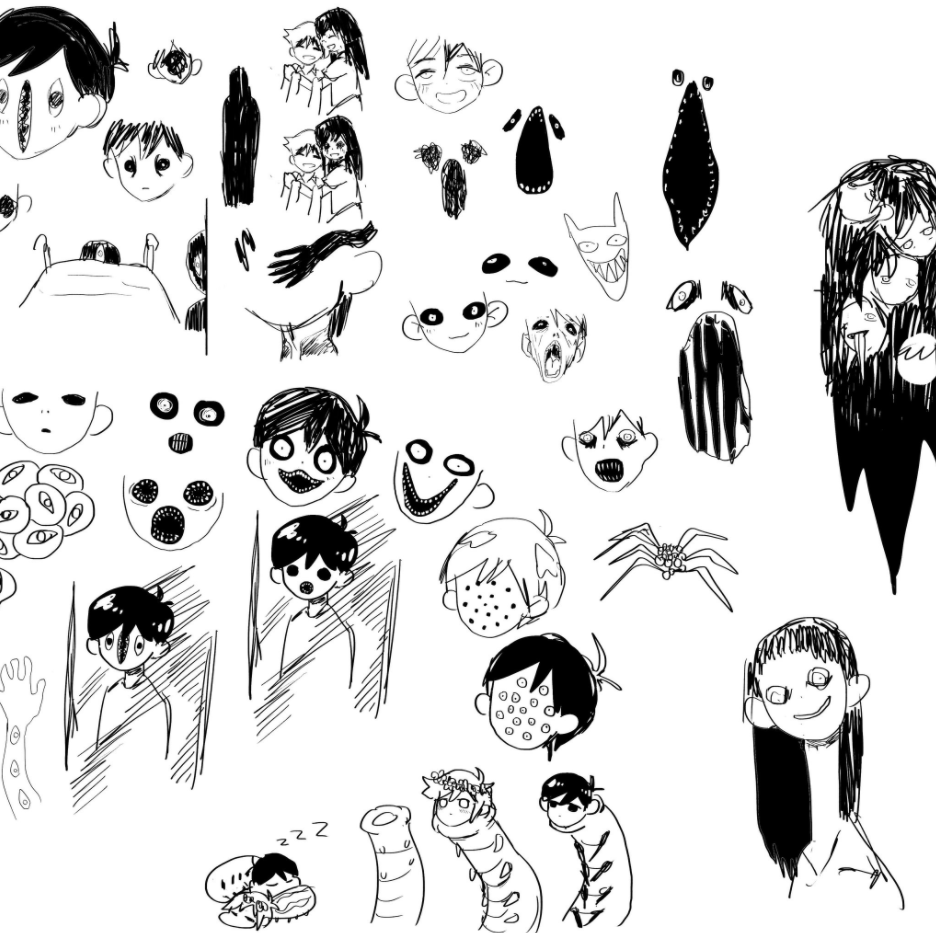
So … I hope I have opened and closed this discourse, with this last test.
For a work that takes a very long time to keep up with the “Horror” moments … We expect some kind of connection with everything we are seeing, with the pieces we are joining together.
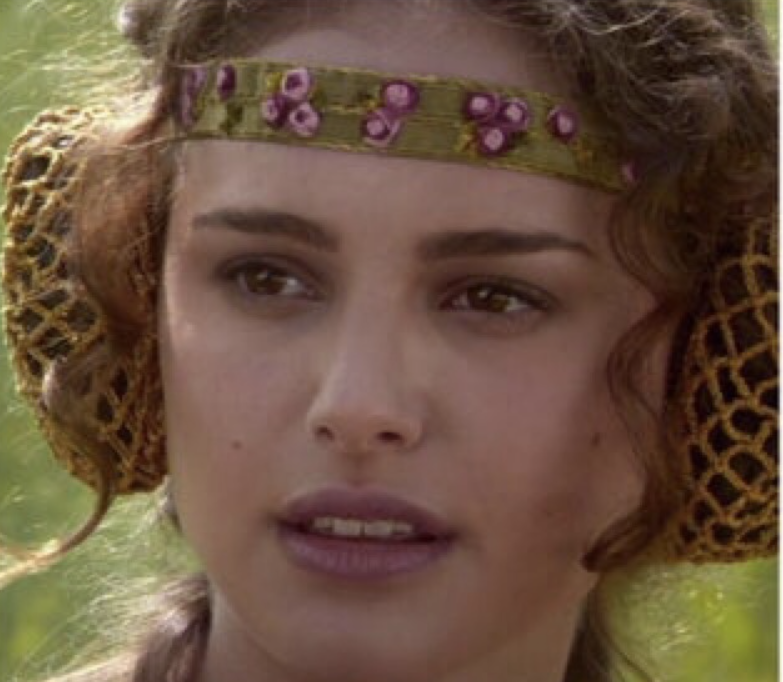
We’ll have a thoughtful link between the symbols used for the horror and the “well-curated” story, right?
Surprise: NO!
With all that we have gathered we can conclude that the symbols of Omori WERE NOT THINKING for what the fiction meant.
Do you know the only two things that relate to the theme of the game what they are?

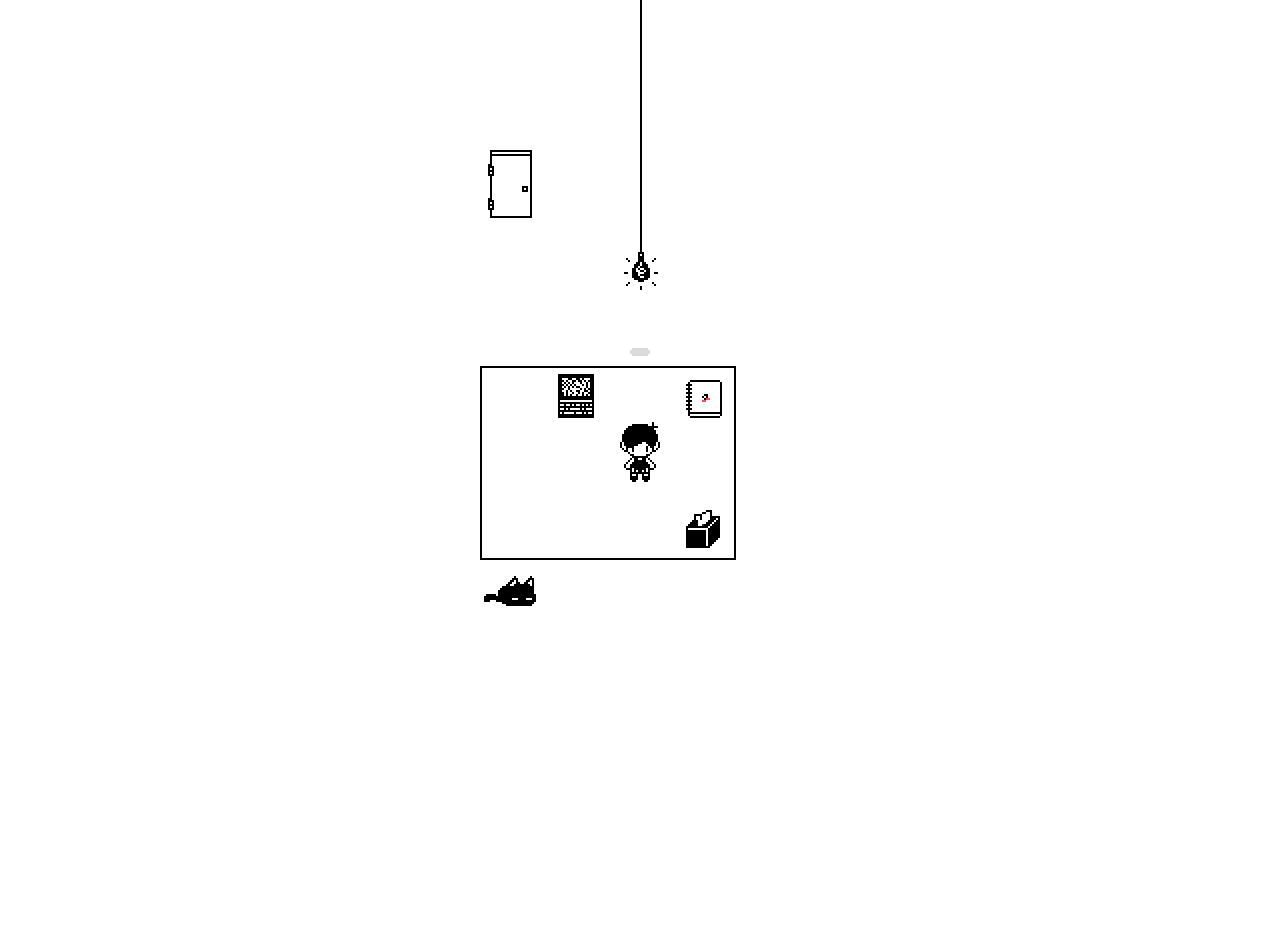
END. At the level of important symbols to take into consideration, we can see these two and then all go home, because they are the ONLY ones who strongly connect with Sunny’s problems.
(No, that useless way of wanting to look at all like a 2004 masterpiece and climax that is “Black Space” I don’t even count if you throw darts in my eyes.)
For the rest all the symbols it has can be part of the head of a boy with depression, a simply neurotic boy or even just and simply a crazy edgelord !
And therefore, this big mistake adds to this problem, which in the end is always the same – due to poor execution, the issues are poorly covered . I don’t care if they are called “creepy moments for their own sake” or “panic attacks”: one name or another, the substance does not change ; because a monster from the world of dreams or a representation of a sense of guilt …

They are treated the same way. They are literally the same, because the game has not been good enough at making what is a true evil something adaptable to a work of fiction aimed at leaving the audience glued to the screen.
Do you realize ?! Treating depression or treating external dangers with more artistic flair is the same for Omori!
They went totally surreal, putting monsters to represent internal evils, because as always, even on an internal and mental level it is always someone else’s fault … And then we went on a lunch break, calling this type of laziness “abstraction of true evils “.
Abstractionism is like … This one.
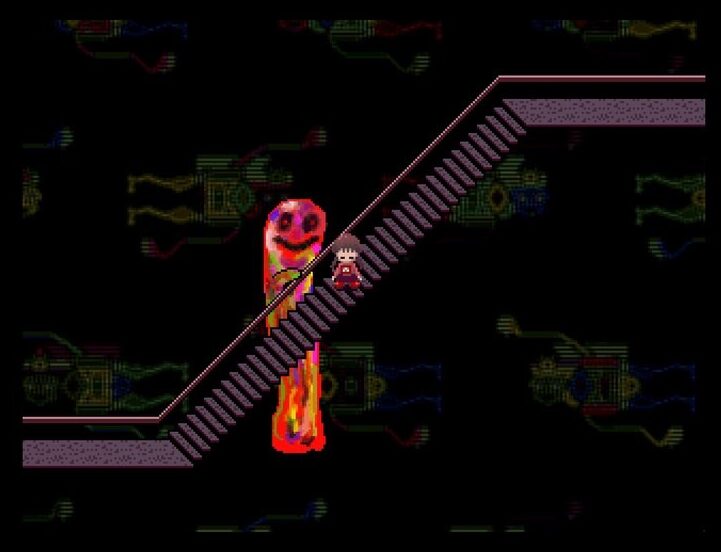

Not “Horror Game N ° 640”

And yes, this comparison is also to say that the next one who considers Yume Nikki and Omori similar for only half an hour of Black Space I do catapult down these stairs:

 “… And these were personal opinions”
“… And these were personal opinions”
 “No, I think they are done, because we have seen that other works have done a good job of representing real evils in a powerful way and-”
“No, I think they are done, because we have seen that other works have done a good job of representing real evils in a powerful way and-”
 “But the issues with those scenes that you consider trivial so much were dealt with. Panic attack is shown, and depression is shown. ”
“But the issues with those scenes that you consider trivial so much were dealt with. Panic attack is shown, and depression is shown. ”
 “… You really want me to tell you about the writing problems, huh …?”
“… You really want me to tell you about the writing problems, huh …?”
This thesis is easily refutable, if you think of Sunny’s character himself, added to the already banal scenes I have already mentioned.
Sunny suffers from the same problem as Goldia in Pocket Mirror, if not worse: is a puppet. Goldia, at least, was a little saint and is simply a character who has not really given a real development but just the basic characterization … Sunny is nothing. Sunny is THE COSMICAL NOTHING.
But, even with this subtle difference, for both games if you think about their plots, everything loses context precisely because you don’t have a strong characterization of the protagonists.
I explained this in a bad but quite understandable way in the article on Pocket Mirror, talking about Goldia:
“… We don’t know shit about the” original personality “of this system (there was a case of DID in Pocket Mirror). We are in her head, but she is passive for EVERYTHING, as if she were in a cursed OUTSIDE environment, when that is HER HEAD of hers, which should be conditioned by her thought processes.
BUT THIS GIRL DOES NOT THINK, HAS NO MENTAL PROCESSES.
What happens is not dictated by her thoughts, by the subconscious, by NOTHING, because they are random fucking magical environments, which have no connection with a possible reality in which she lived, so it’s all very alienating and NOT CREDIBLE: if a personality “dies” in the scene we see “the symbol” but if we pay more attention we can say:
“Hey, this doesn’t make sense in Goldia’s head.”
I mean, it’s all so external that if a person gets a fever it’s not because, I don’t know, Goldia wants to suppress a certain part of herself as much as possible … cold. ”
I don’t think you need to explain anything else, these exact words fit Sunny perfectly. Representing guilt, feelings and panic attacks when we can’t even get attached to a finished character … What the hell is it for ?! What we see, which I translate as “hallucinogens” as my sister and I did for the Astralshift game article, what is it? Is it character psychology as the game pretends to tell us, or is it just entertainment for us so we get a little chills?
If the game was meant to be an experimental title to extravagantly represent the problems a (real) hikikomori can have, the game would have been totally different… And with less drama. He could be a hikikomori who was perfectly in line with the elements of this social phenomenon and be in a noisy town, so as to give a sense of estrangement of the person in her room; therefore simply represent the phenomenon of self-isolation and all the problems that derive from it, with few elements to give you only an interpretative framework in which to move.
Instead NO! Omori wanted the plot! Omori wanted the story with the twist!
These two elements, as in Pocket Mirror, really clash: the protagonist is a puppet, he has no reactions to what his head should be … And an interpretation would be that the game wants to make the player and the protagonist experience certain sensations. is only a means …
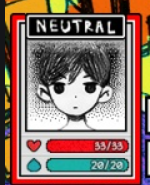
(To say, he is not even happy to be with his friends so his neutral expression may have a little more life. No. Pure stoicism and scazzo for a person who is, in theory, in the world where everything should be beautiful for him, where everything is MADE to make him happy. Okay …?)
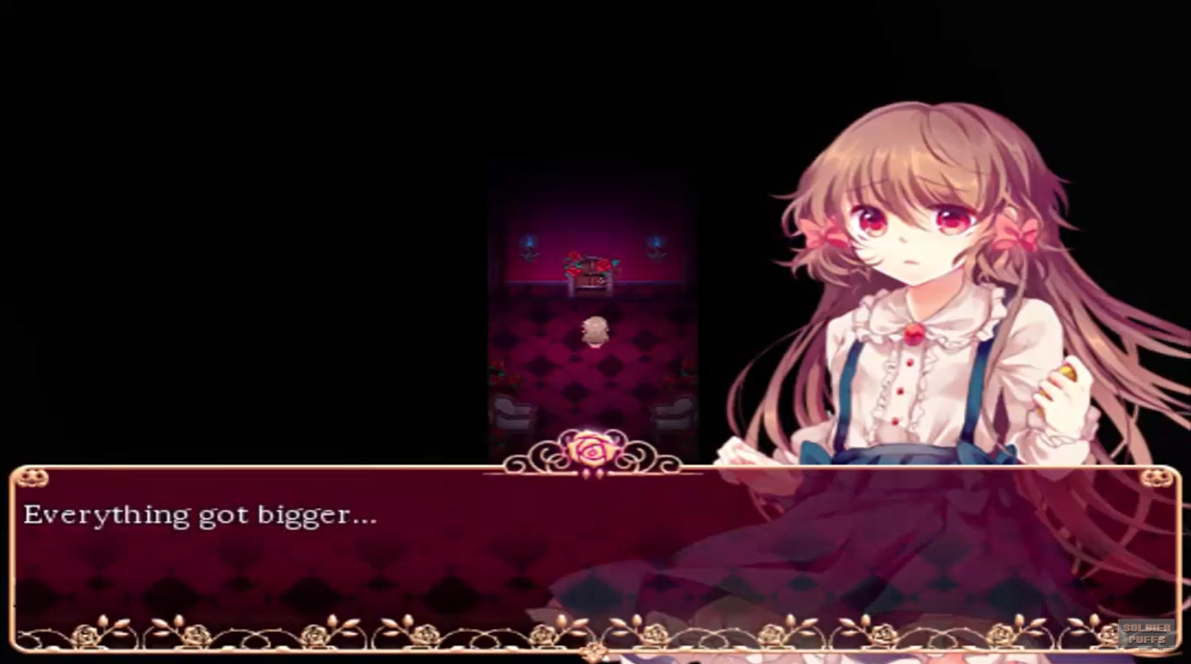
(Here Goldia is surprised because everything has become bigger … Even if that is her head, because she is surprised as if she were a newcomer in a magical world ??)
But the protagonist, without personality, is the same involved in a complicated plot and context.
So, are all of Sunny’s fears actually ours? Are Sunny / Omori a representation OF THE PLAYER in the game?
NO! And it’s all the fault of the “plot twist”.
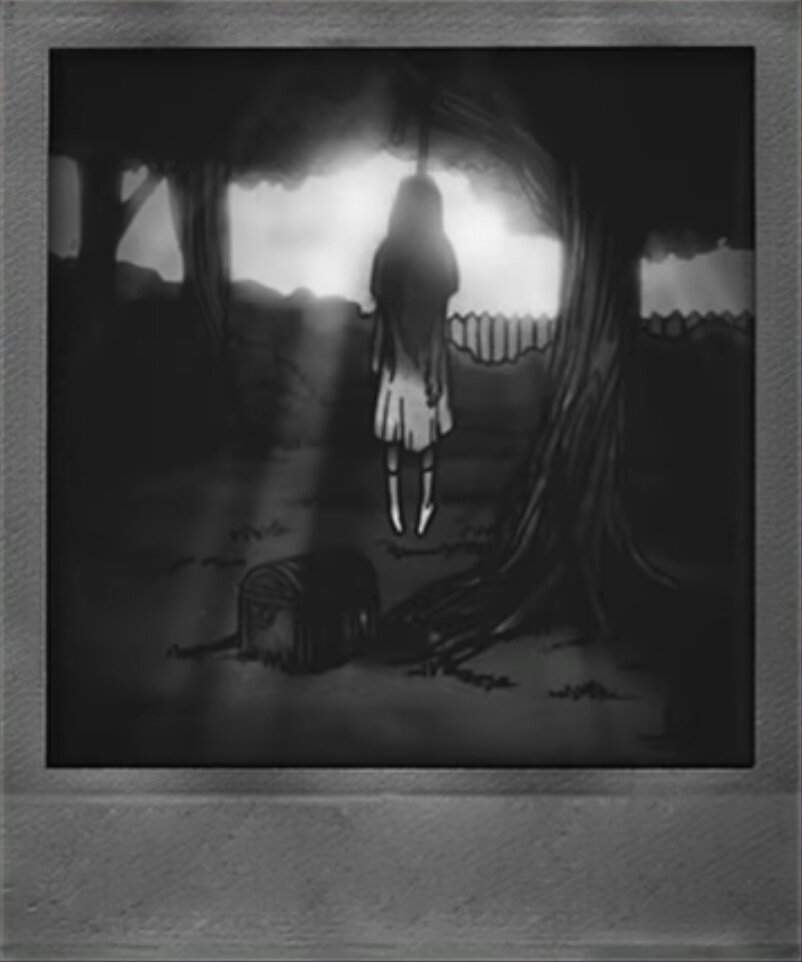
Spoiler for Omori: it turns out that Mari, Sunny’s sister, was killed by her brother … By accident (returning to the fact that the characters never have conflicts or defects …) and Sunny, with the help of Basil (a kid of their group of friends, which for some reason is more important) organized a crime scene that could allude to a false suicide, pretending that Mari actually hanged herself.
Does it make sense?
No.
But that’s not what we’re going to talk about because, as I said, if we start talking about Omori’s writing problems, another three-part article comes out.
So throughout the game, we commanded a guy who eventually committed murder. And he had the sick mentality of hiding the body, instead of being paralyzed with terror.
In theory, this murder discourse was supposed to give some kind of reason for what is called “depression” …
BUT THIS IS IN REALITY WHAT GIVES YOU EVEN LESS SENSE!
Let’s start with a fact. Sunny IS IN NO WAY DEPRESSED, whether you like it or not. Given this damn of plot twist that is neither in heaven nor on earth, at this point it can actually translate into a great sense of guilt: however strong, however serious, but simply a great remorse!

More details in this part of the post “ Omori has poor writing ” by user Peppermintbee on Tumblr.
SO THE GAME IN WHAT IS THE MID-POINT GOES TOTALLY OUTSIDE THEME , making any discourse on depression ridiculous and less credible than it already is because of confusing symbols and non-existent motives!
… And what is called “shame” is precisely one of the effects of depression itself. True and constant self-hatred.
And also the theme of fears to be overcome, from which “being a gray person in a purple world” and “murder as the last terrible act that made Sunny’s self-hatred grow beyond belief”. ..
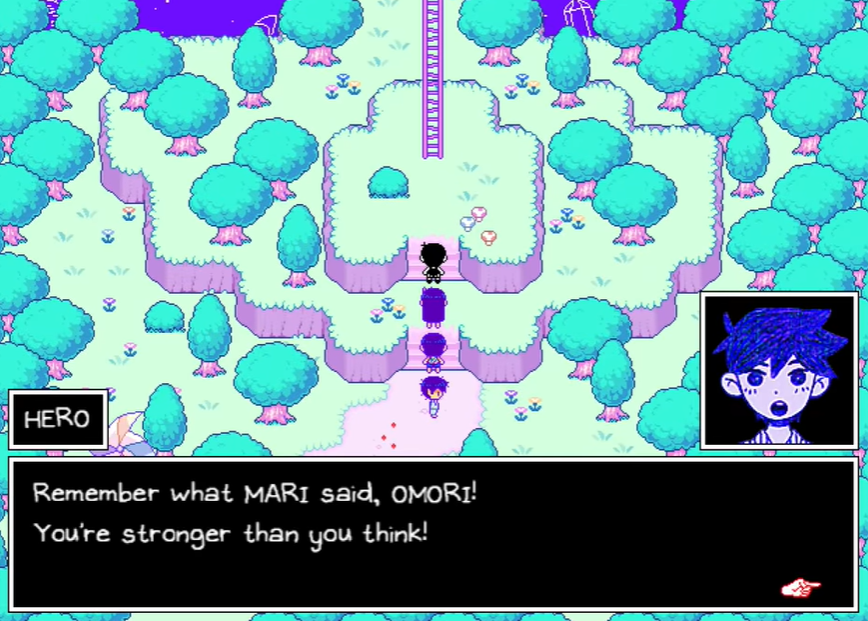
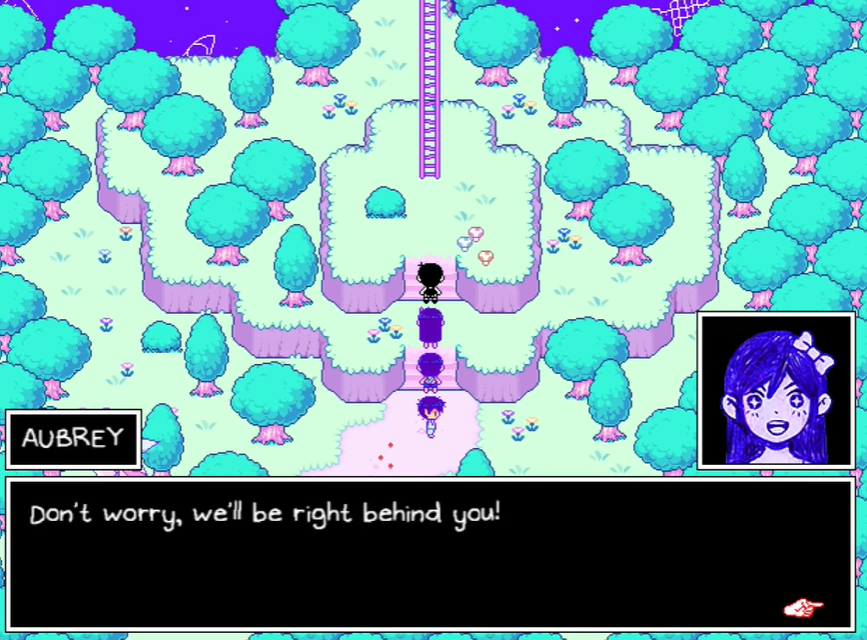
So … His friends are telling him to do it … But they’re actually imaginary, so he’s self-empowering himself?
Because of this heck of a plot twist, everything becomes truly decontextualized : Since we know that Sunny developed these problems after Mari’s murder, we have no basis for Sunny to overcome his fears and the “greyness” of his “personality” . From her past we have only happy memories and a little anger because she did not want to play the violin … But in any case, nothing that could cause something serious to develop.
So… What is left of depression?
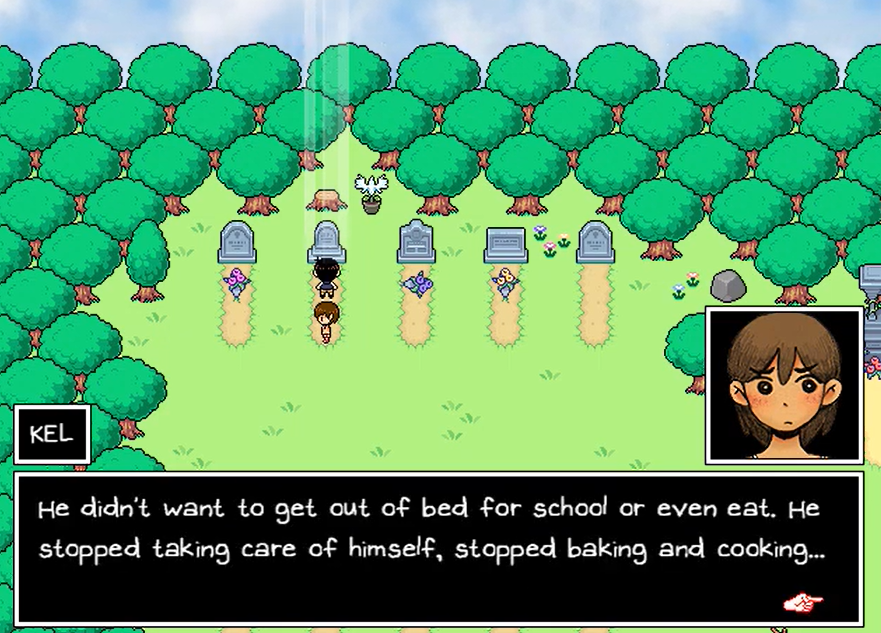
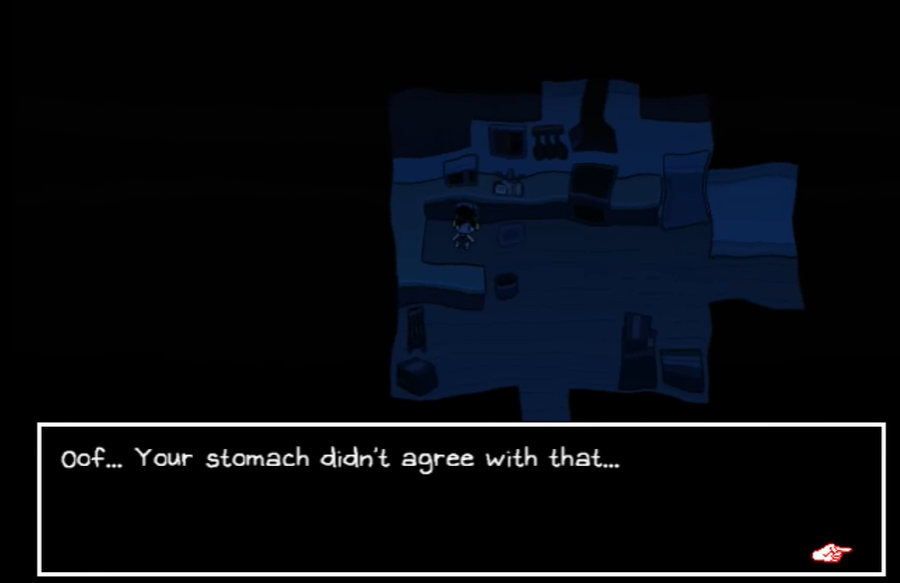

And finally…



In general, the focus was on two things for the promotion of the game:
-Nostalgia
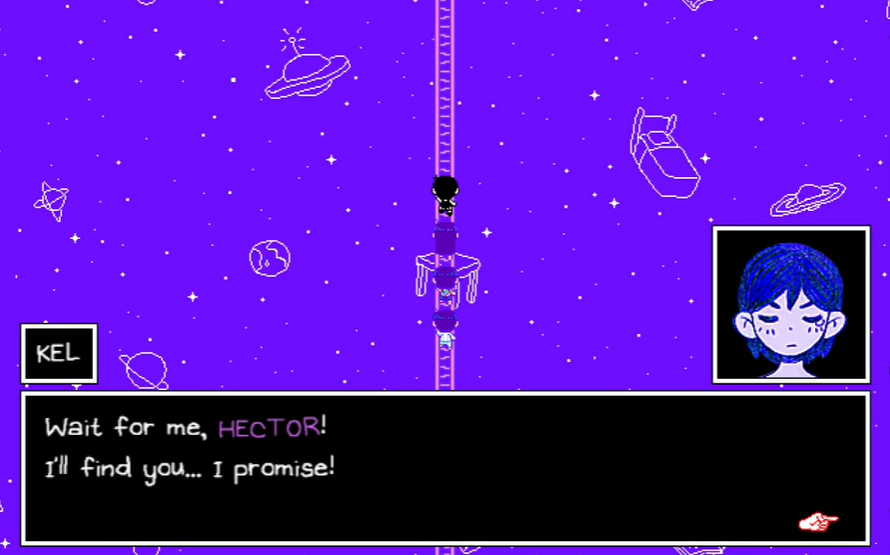
-Contrast between J-RPG and… Talk about serious issues at the same time.


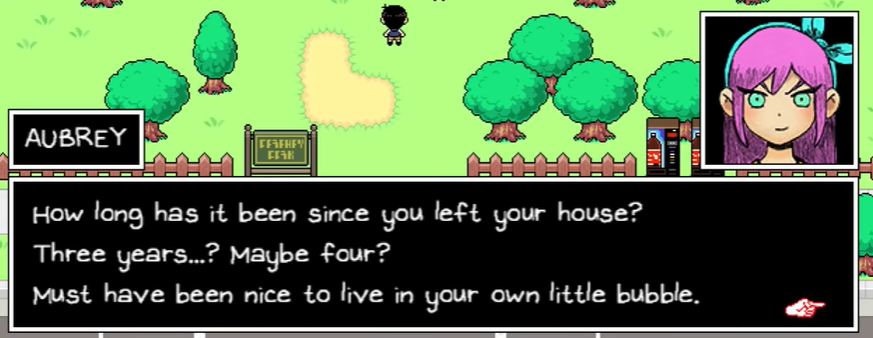
But … Noticed?
“Depression” is all talk.
All label, all branding .
We have seen well how the game treated “depression” and how it tried to explain it …



It’s all reduced to the bone, it’s all very, very vague. There is no mature discussion of the disease or even the slightest talk about it. We have seen it before: the game has never been able to represent real problems in a way that really gives an impact, but it is gone. for the total surreal and with symbols that we have all certainly already seen and that we recognize from the first to the last pixel.

Is this depth?

Do you think this is an accurate, realistic and “brave” way for its kind to touch on mental health?
Tell me if you know a little about what it feels like.
… And don’t tell me with clichés, over-analysis of game scenes… Tell me with what the game SHOWS. Not with your shitty interpretations. Because Omori had to talk about her topic alone, in a good and understandable way.
But he doesn’t even know where the hell he wants to go.
The plot is neither about murder, nor about mourning, nor about depression. He wants to talk about everything, but he really talks about nothing. He just combined many, many things that people like and … Somehow he wanted to make it work in a finished product.
But they are all incipits, it’s all a trap for mice. A trap in which we then find ourselves stuck and we have to find a way out, with far-fetched interpretations (such as the one on dissociative amnesia, the most popular, but we will not talk about it).
And here we go to the real problem.
A general vagueness , which demonstrates topics never covered at 100% but only many, many small whispers of important topics to tell us that “the game is actually profound” … Combined with a branding entirely focused on a blog about a “depressed” person (because, don’t want to, I have my doubts a bit …) and, in general, a label for the game as “horror about mental health so realistically that it breaks you internally ”…
What did it left to its players?



Improper recognition, that’s what. And this in my opinion … It really sucks.
Why do I say “improper recognition”?
I compare a pseudo-deep positive Steam review with a negative review (or rather, a response to an extremely negative review)


… Who are you most willing to believe? To the cheap poet, or to the person who actually seems to have suffered?
I, I don’t know about you, I believe in the second person. But far too many people have the same way of playing the game as the first.



![]()

If you see all these types of reviews, or so-called “video essays” (which, I don’t know about you, many of these just seem like a nicer way to present a format where you just talk and talk on video. That is, there are exceptions. , I follow UrickSaladBar and respect him, but … I don’t know, maybe it’s me but I’m never inclined to take them seriously) on the game, you’ll notice one thing.
When we talk about Omori, we talk about it in a nauseatingly felt way.
Why do I say “nauseatingly”?
– “This game has helped ME as a person because I’m sick …”
– “I have suffered from these things…”
– “This game helped ME to endure — …”
Am I saying this is bad?
Yes.
But not because of the simple and INNOCENT comfort factor, like what you can also have with Animal Crossing according to many (and also according to me). The problem is another.
Notice how I pointed out “I, me…”.
We never talk about the game ITSELF, in its true and insipid essence.
It spins everything around us, every single devil at a time. A game that has the premise of dealing with real problems we make it a chance to talk about us, OUR real problems.
In the end, we only think about ourselves. Because the work is vague, all its themes are distorted.
Distorted in the way they are applicable to everyone. And everyone interprets on their own terms what he wants to see.
The vagueness and lack of clarity on the THEME of Omori leaves all the free interpretation to the fans who are in trouble. The work in this way gives more the illusion to everyone that we can be poor victims even suffering from DEPRESSION when in reality it is a very complicated disease.
Depression, anxiety, panic attack, thoughts of death … They are treated vaguely, with images common to all. I am repeating these concepts to the bitter end, because this gives a single, really damaging effect:
The game also makes phenomena “relatable” that want to be called and put down as much more complex things.
And therefore, because of this, it gives everything a false impression . This gives us the justification for using even clinical terms to explain simpler things, things that certainly cause pain, but that are not connected in any way to what we think it is.
This makes diseases only labels for even minor evils, which can cause minor effects. But since the scenes are vague and relatable, we project them into our mental situations and onto ourselves without think about it.
Because we are selfish. Because we want to be protagonists of who knows what.
Sunny is not a strong enough point of reference to detach us from the idea that WE feel those things.

Because Sunny has always been a puppet. Omocat used it in 2012, we also use it in 2021.
It is because in the game itself there is no reflection on diseases and on the topics covered. It is all put down with a disarming immaturity.
And we have seen that suggestion is not enough to deal with a theme alone.
And this superficiality and childishness that the game has given us gives the audience a false impression of what it really is like to endure certain types of problems. It gives the false impression that “we are all Sunny”, therefore “we are all depressed”, when it is actually something much more complicated. Omori teaches us to use big words, when in reality what is there may be something different, with another name. So it teaches us to label ourselves and talk as if we know what suffering really means.
And this also helps us justify ourselves, even in our bad deeds.
Because we don’t want to recognize ourselves in any problem that could affect us too closely. Because we; public, developers or anyone… We always want to feel understood. Always and in any case.
And in this case, I would add, we want an excuse to be understood. Hell, I thought the days when depression was a fucking aestethic were over.
Because, my God, this game has built a brand identity behind it . An important theme (or a series of important themes) has been used as a way to give minimal importance to what is actually pure venting. Nothing has changed since 2012, Omocat simply got smarter and used it for marketing.


“I wouldn’t mind getting out if everyone wasn’t so stupid”
If I were to interpret all this, it doesn’t seem like something really profound to me but just a serious problem of narcissism masked by a nihilistic pseudo philosophy.
(Original “Omoriboy” cartoon series from 2012)
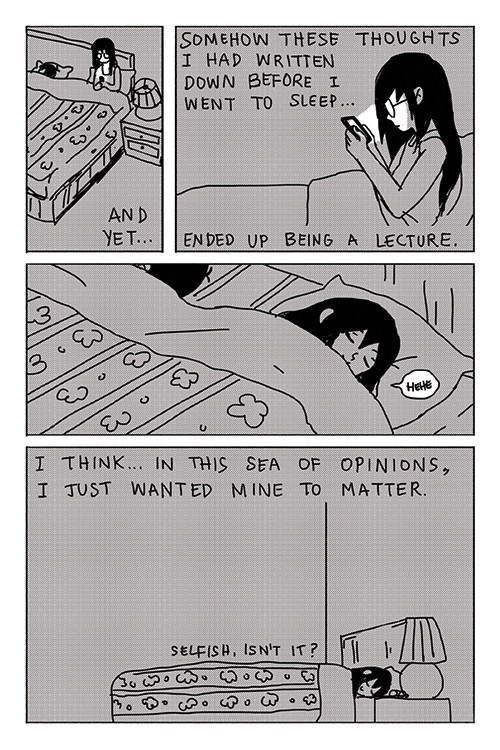
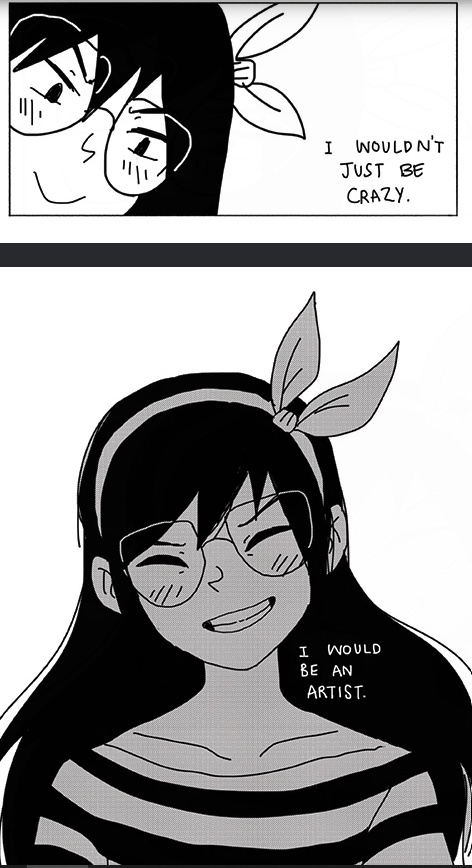
(“A Comic About Nothing”, Omocat)
As we said …
 “And here I will speak for a moment.”
“And here I will speak for a moment.”
Here, for example, from this comic we can see the mentality that is more or less behind the “Omori” brand. The image it wants to launch is that of a cynical type of behavior, but leaving out aside from the discourse of “everyone sucks apart from me, that will express through art” as if in this case the author was the only person in the world who can develop a kind of deep thought that deserves to be shared, why are we showing it to you?
This attitude that would translate into a sort of cynicism towards the outside world, a kind of imitation of nihilistic thought as we mentioned before (Nietzsche was not only “cynical”, he also spoke of the super-stage-man in the moment in which a new phase of evolution would have been reached, but apparently no one wants to remember this detail) is not exactly what I believe it represents to have a disease as complex as depression.
Depression primarily involves aggression towards oneself, not towards others . The fact of no longer finding meaning in what one is or what one does is often aggravated by the role it occupies in the world, so unknowingly one always faces a heavy phase of self-evaluation and self-criticism in one’s place in the world. There will certainly be different facets, but from the research we have seen and the material we have brought you you should have seen it too.
For the sake of completeness, I would like to give you some examples in which this condition has in our opinion been represented a hundred times better.
A) Sayori – Doki Doki Literature Club
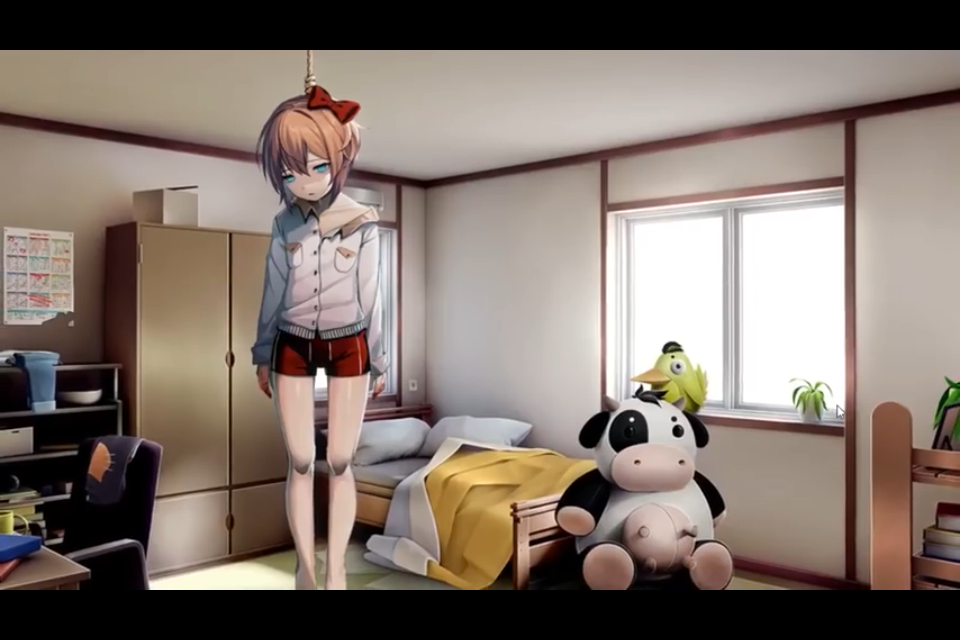
Yes, I wanted to start immediately from this case study because so don’t say that we neglect the videogame universe from our comparison cases. This was certainly the most striking and viral case and there is a precise reason why I put it … The evidence that confirms my thesis.
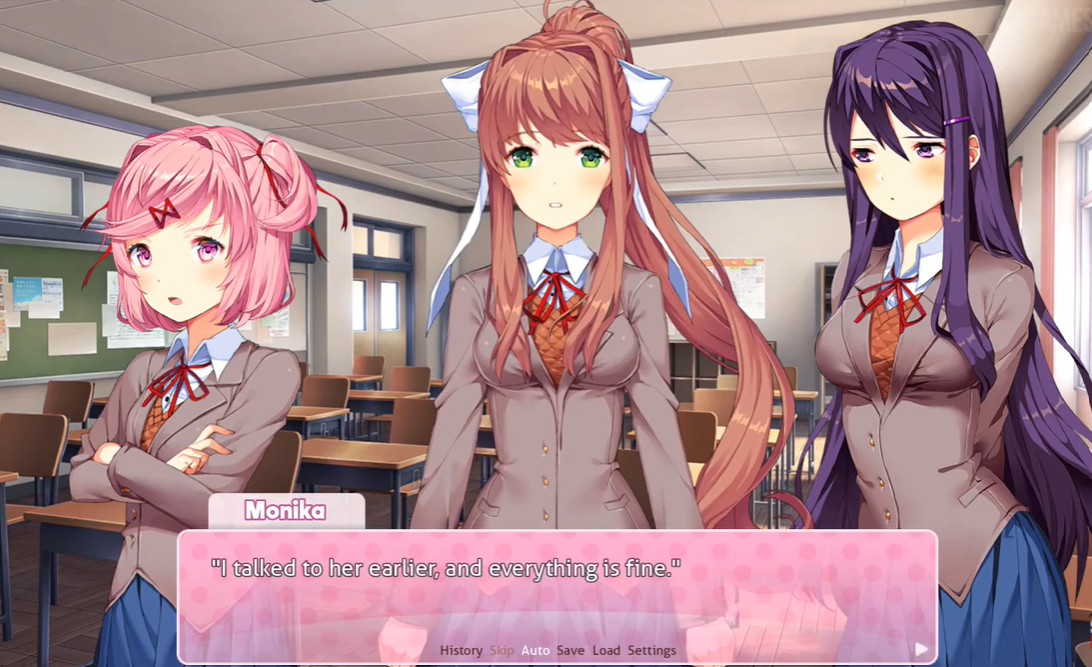
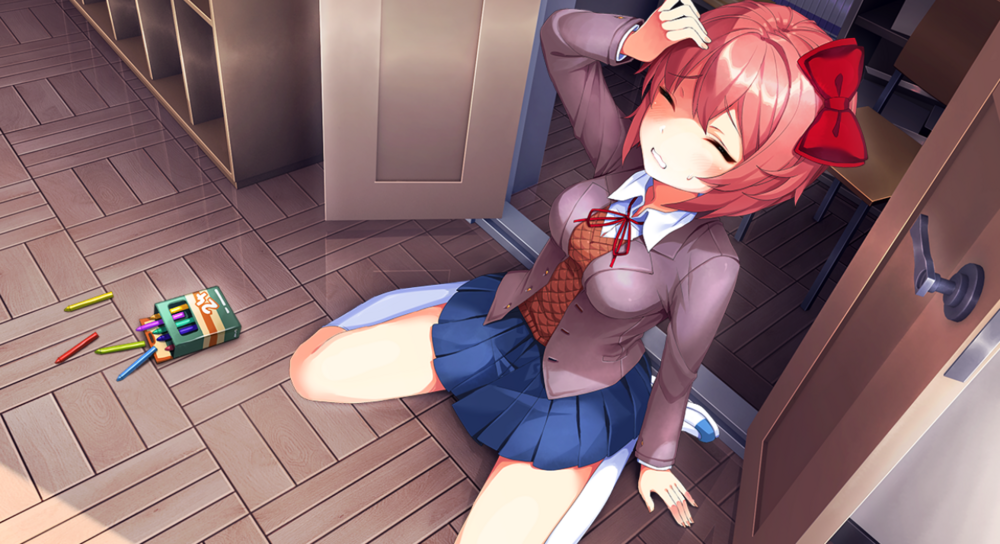
These two screens seen in succession should make you understand one thing: Sayori is continually compared with the others.
Between the “beautiful mystery maiden”, “tough Natsuki” and “perfect Monika” how could a simpleton like Sayori not feel out of place?
…I’m mean, isn’t it?
She is the childhood friend, the “escort”, the one that is now worth less because she represents something a of old / already seen unlike the other three options.
This, as I was telling you, can be a facet of how depression is viewed.
If I had to take another example, it would definitely be Heathers.
B) Heather Chandler – Heathers
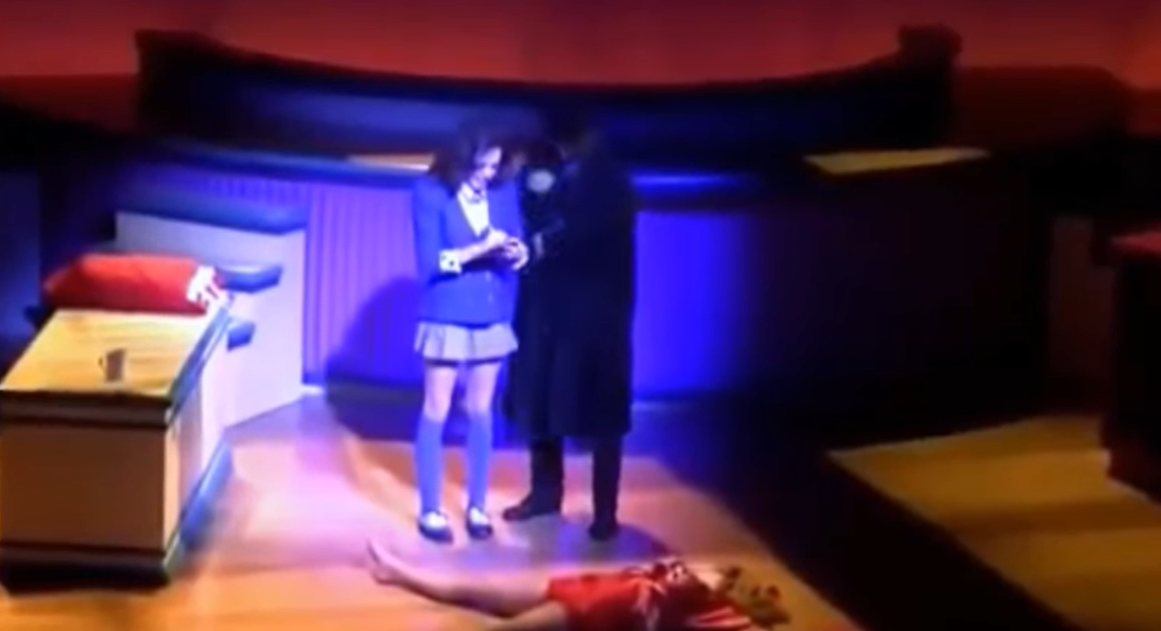
(Heathers The Musical, 2010, Kevin Murphy, Laurence O’Keefe)
Many times we have (especially Ele) compared a game like Omori to Heathers, an over the top musical, coming from the darkest 1988 film that takes up adolescent problems in the context of the high-school.
In the specific moment of the screenshot Veronica (the protagonist) and Jason Dean (supporting actor) are writing a letter in which they pass the accidental murder of Heather Chandler (the “queen bee” of the school) as a suicide.
 “Here, now you understand why the comparison comes naturally to you”
“Here, now you understand why the comparison comes naturally to you”
 ” Already..I can’t blame you on that. ”
” Already..I can’t blame you on that. ”
Back to us, before returning to Heathers let’s do a little re-cap.
Try to follow my reasoning.
Does Sayori commit suicide also because it is instigated by Monika? Did the game take some half action to clear it from the system? Certainly.
But the sense of illness is perfectly enclosed even if the script is innovative, because it experiences the meta dimension in the fullest sense of the term in its linearity!
She doesn’t want to wake up, she comes less and less in school (and other signs) …

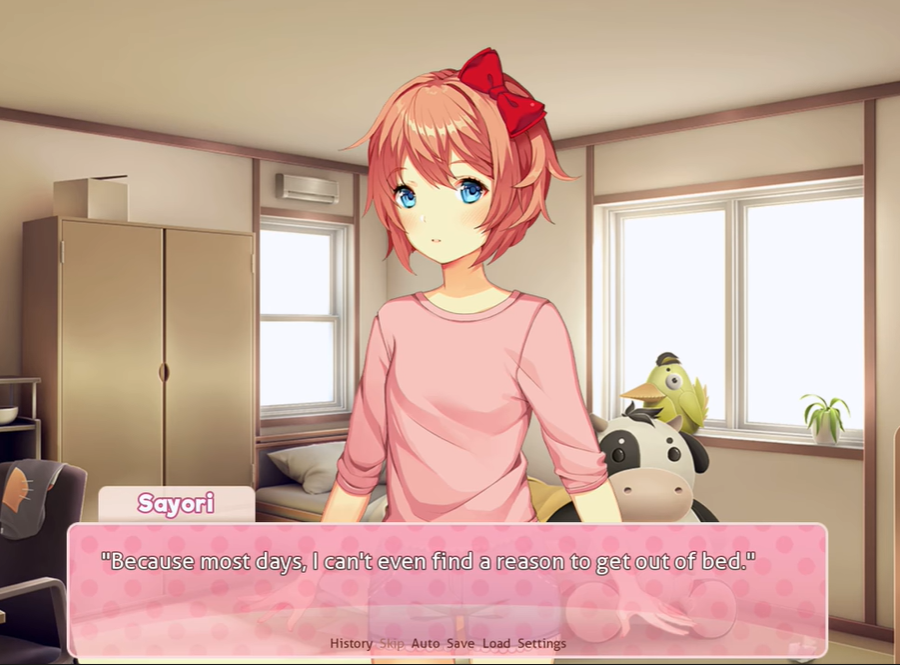
(…)
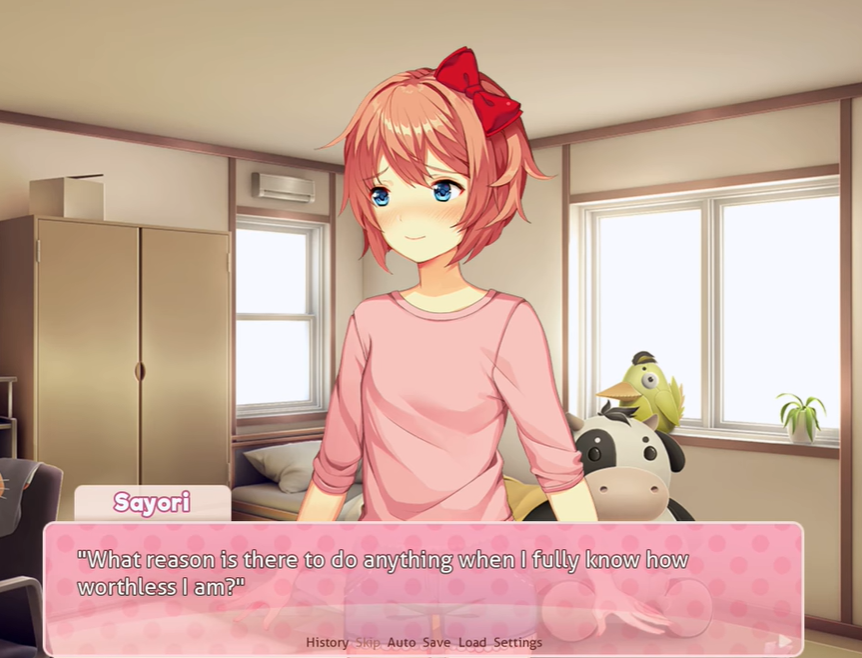
And on this sentence: “Sayori was a cheerful person!” on which the general “public shock” of why a person unexpectedly commits suicide would be based …
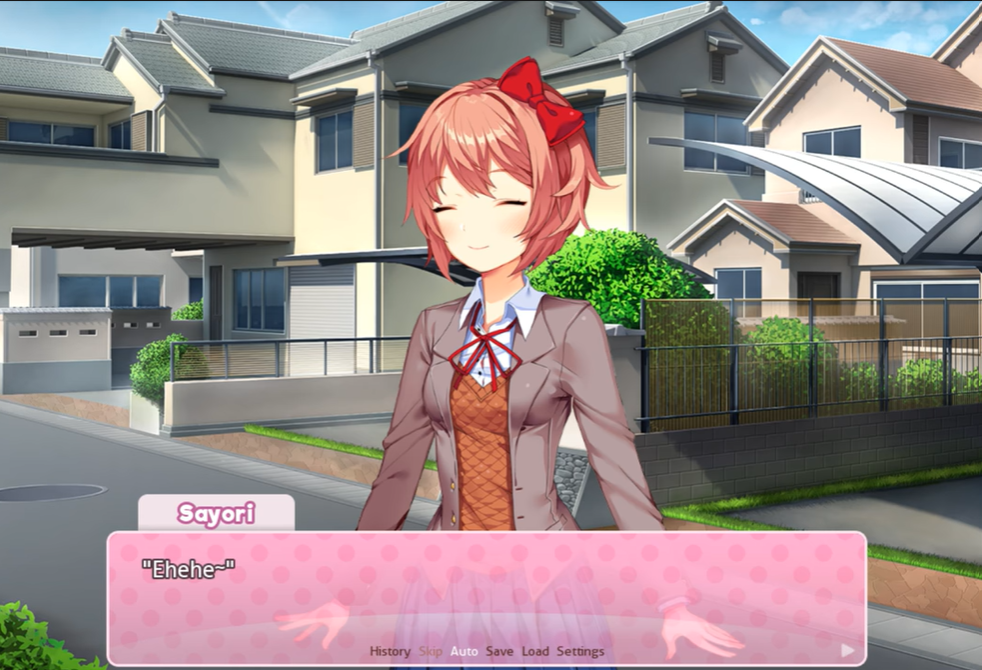
Let’s try to compare her for a moment with Mari, for example.
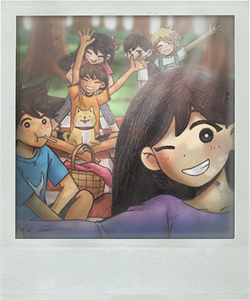

Heck, even the sun mourns her! Come on!
Why, according to the great evil geniuses of Sunny and Basil, Mari should have committed suicide ???


Now let’s go back to Heathers.
The starting image is excellent for explaining what I intend to talk about. She is pretending to write a suicide note of the school “mythic bitch”, a rich and popular girl who held power and combined bullying of all kinds. And yet, even if depression is never mentioned as an illness in either the film or the musical, she pretends to be a dimension of the girl’s self-hatred in satirical terms , thus assuming that she is a superficial person, because “she is a queen bee, she could never have such cruel feelings towards herself” putting us in front of a paradox: and if it were really like that?
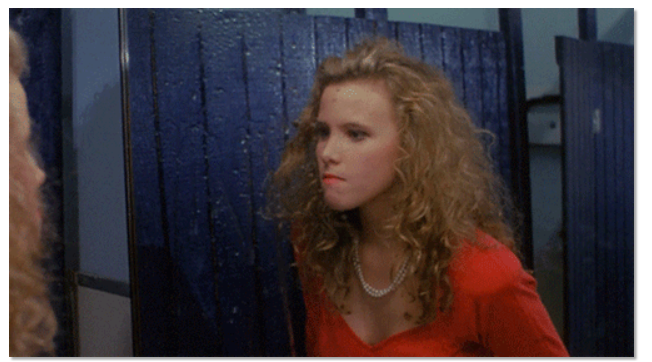
(Heathers, 1988, Daniel Waters)
Let’s try to give reasons why she might spit at herself in front of the mirror. Behind the dimension of “keep the stronger face”, there is it is also a level of sexualization that she undergoes from peers who already see her as “a grown woman” rather than a girl.
And, as a small gem, the theme of self-acceptance of oneself in terms of appearance was also beautifully treated by Mean Girls that we had already mentioned before, scripted by the great Tina Fey!
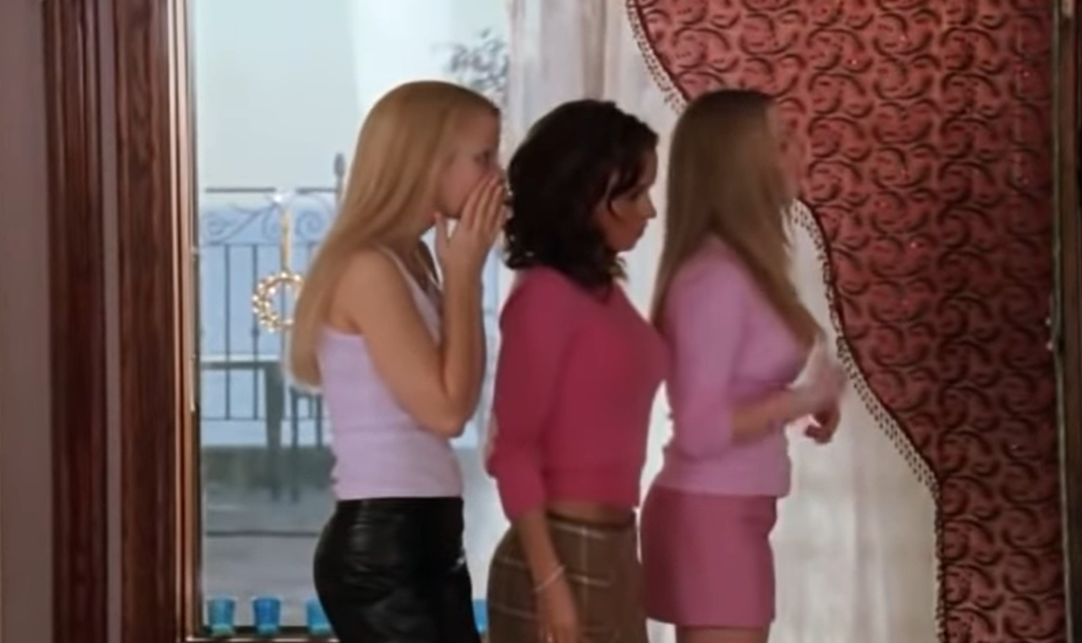
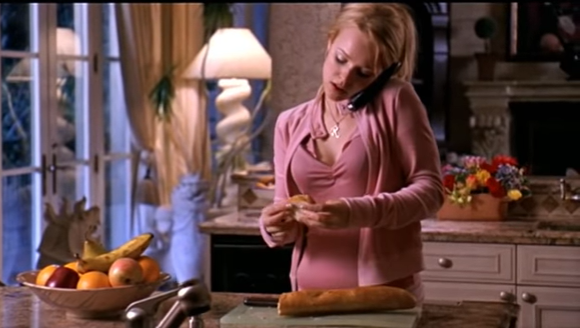

Returning to Sayori, let’s remember that she is the “most insignificant” of the group of girls, compared to the others she can only feel more and more insipid. Does Mari have any of these problems?
She was the “team leader” of a group of GREAT FRIENDS in a happy family and probably of middle class because of their state of well-being (clothes the children in a certain way, education in musical instruments, rules to be respected ect). What did she have to complain about? Everyone loved her and understood her for who she really was!
Why should she commit suicide?
While it was meant to be just a way to divert the trail and in turn create the reason Sunny is depressed by going into a series of ongoing contradictions, it was extremely important to make this point believable as well, it should not be underestimated. Let’s remember this for a moment.
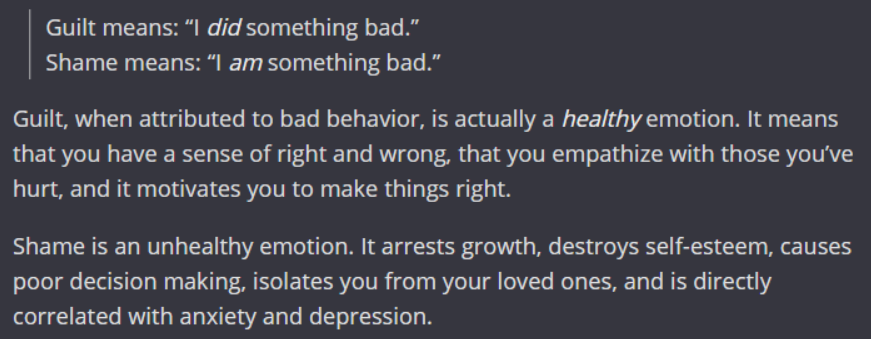
But these are very obvious cases in which the development of a “hatred” towards oneself in which one thinks that not being in the world would be “better for everyone” is the guideline that leads / could lead everyone to suicide. Of course you could also feel a certain mistrust and nihilism of the world, I agree that it may be a facet of depression, but think about it for just a moment: there must be a reason why a person does not see the time to get out of the way, right?
If you believe that life has no value it is often an extension of the thought that your life has no value , otherwise there would be no reason to be so critical of comparisons of the world if you do not have a high enough self-esteem to believe that you have the power to change it or to be able to influence events to change things in some way.
 “Are you done? Wo-oh, and to think that I thought it was me between the two to freak out the most today.”
“Are you done? Wo-oh, and to think that I thought it was me between the two to freak out the most today.”
 ” So much … it was just this one time. ”
” So much … it was just this one time. ”
So, the “Selfish Confort Dilemma” is just that. It means asking yourself this question:
“We want to give comfort and justification to the characters … Or do we want to give comfort and justification to ourselves?”
In recent years, we are veering more and more towards the second option… Through the first option (and not). I realize that in this article I have said many bad things, I was about to insult Omocat’s person personally …
But I don’t care. Because I do it too. All the little teacher’s speeches that strike more “personally” … I am also doing them to myself, as a person and not just as a character representing a certain type of audience. I’m among the judged, guys.
I too, deep in my subconscious, do not want the characters I love to have “inconveniences”, something that can prevent me from creating content about them. Something that makes them more “uncomfortable” to look at or treat.
And this for myself too, applying the same law for me as a person would be really, REALLY comfortable.
In fact, I’ll just try to do it.
Let me give you an example: I most likely have some problems controlling anger.
“I have anger problems, it is totally justified for me to snap towards those who love me and make them suffer, even if for no reason.”
“Actually I suffer when I get angry, let me do it, because I suffer when I get angry!”
“But don’t you realize? At the end of my bad moment I feel guilty! ”
“I get very angry, screaming left and right … But it’s for a good reason, come on!”
I would like very, very much to think like that. It would save me a lot of internal hassle.
And indeed, in my outbursts of anger I never learn.
But reason in those moments speaks to me, tells me no. As a developer and… Criticism, yes, I say that this is wrong . From every point of view.
We distort how we see these types of themes, as we distort our personal situations and the situations of the works we like in our favor. We see them wrongly, with our excuses, when there are objective factors to be taken into consideration every time: for example, the pain that can be caused to others.
If we applied this logic of “we all deserve love and respect”, we would have to justify even the most horrible of acts.
Bullying…

Manipulation…

Rape.

 “Tsk. Do you really think we’re so naive. Of course you notice these things in real life. See Twitter, they complain about anything-”
“Tsk. Do you really think we’re so naive. Of course you notice these things in real life. See Twitter, they complain about anything-”
 “So why these games were never bashed by Twitter?”
“So why these games were never bashed by Twitter?”
I mean … Things that are SERIOUSLY hurting others and are real problems that fly over our heads and we don’t even notice.
If we continue in this way, we will begin to focus more and more on cheap problems, such as when a work for illogical reasons is defined as “toxic” or “of bad quality”, just because it does not respect the unwritten guidelines that are certain types of communities exaggerate …
But if reasons are revealed why for certain types of characters or works all is forgiven … All is forgiven. And not for understanding what has been done, for example, or any kind of reason more profound and / or inevitable, or even just simply a true settlement of the problematic situation …
But for what we have been talking about all along: external faults, suffering as an end in itself.
So we’re going to end up being judges, for anything, but underneath the bloody hypocrites.
Because if in the end we have comfort, if in the end we have something we can cling to to excuse our negativity from which, being human, we cannot escape …
We’ll be fine.
…

“…”
 “…”
“…”
 “…Ele, you’ve gone too far.”
“…Ele, you’ve gone too far.”
 “I know. But I wanted to tell this one day.”
“I know. But I wanted to tell this one day.”
 “There will be many people at our door, if whoever has come will speak …”
“There will be many people at our door, if whoever has come will speak …”
 “As long as there is flame, there are people, huh …? Pao, they should read your article.”
“As long as there is flame, there are people, huh …? Pao, they should read your article.”
 “This speech is far more interesting…”
“This speech is far more interesting…”
…
 “… I just hope the message is clear enough.”
“… I just hope the message is clear enough.”
____________________
1 – “Plot holes …” – Further information : Especially for how a curse works … That is, its goal is destruction, it cannot directly kill and then move on to another host, like a parasite? It’s not that his goal is to spread despair, we’re not in Danganronpa!

